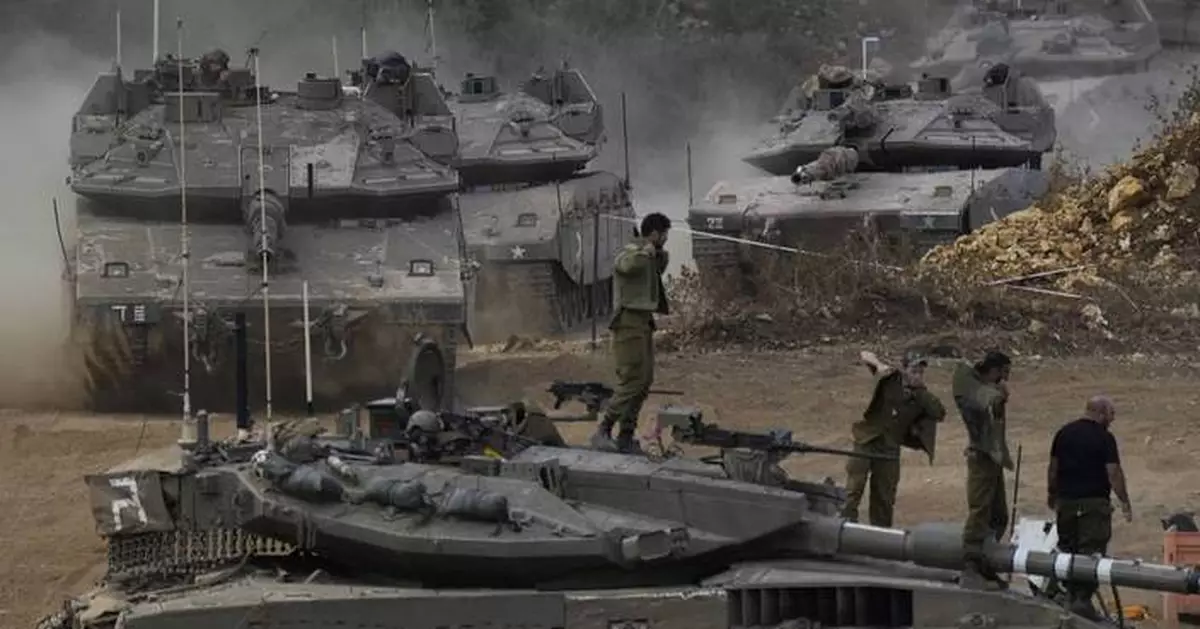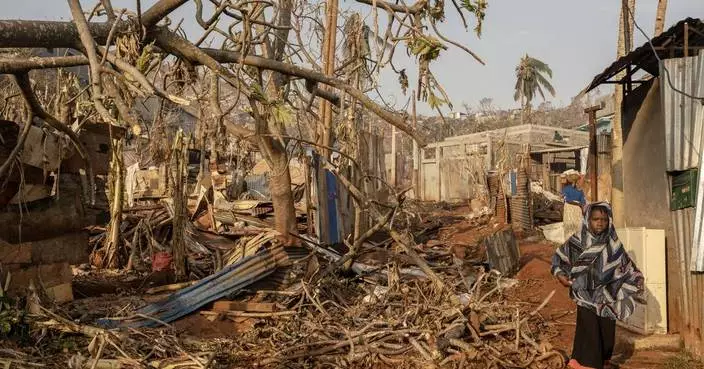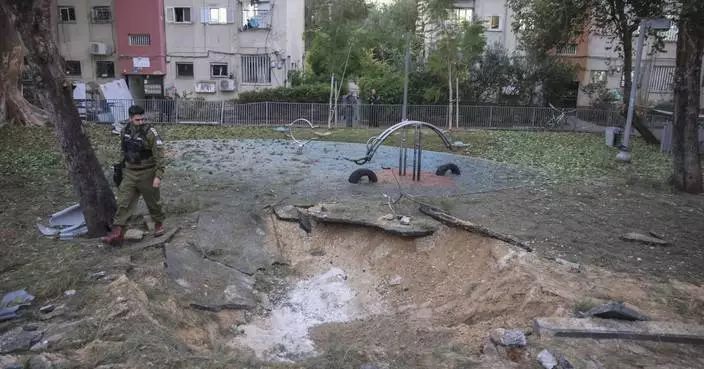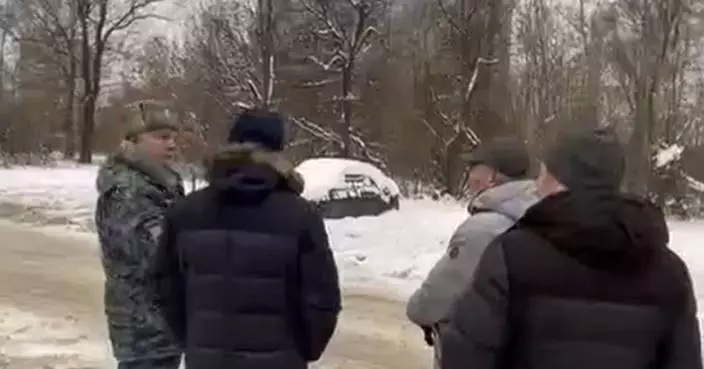JERUSALEM (AP) — Israel’s ground invasion in Lebanon stretched into its second week, as the Hezbollah militant group fired hundreds of rockets deep into Israel — with no end in sight to the escalating conflict.
More than 1,400 people have been killed in Lebanon — mostly in airstrikes — and over a million displaced since the fighting intensified in mid-September. At least 15 Israeli soldiers and two civilians have been killed since the ground operation began, and more than 60,000 people have been displaced from towns along the border for more than a year.
Click to Gallery
FILE - Lebanese soldiers secure the area near the site of an Israeli airstrike in Beirut's southern suburb, on Sept. 23, 2024. (AP Photo/Bilal Hussein, File)
FILE - A Lebanese army soldier sits behind his weapon on the top of an armored personnel carrier at the site of an Israeli airstrike in Beirut's southern suburb, on Sept. 23, 2024. (AP Photo/Bilal Hussein, File)
FILE - Israeli soldiers work on tanks and armoured personnel carriers (APC) in northern Israel, on Sept. 30, 2024. (AP Photo/Leo Correa, File)
FILE - Lebanese soldiers secure the area at the site of an Israeli airstrike in Beirut's southern suburbs on Sept. 27, 2024. (AP Photo/Bilal Hussein, File)
FILE - Israeli soldiers work on tanks in a staging area in northern Israel near the Israel-Lebanon border, on Oct. 1, 2024. (AP Photo/Baz Ratner, File)
Turkish citizens carry their cats as they wait to board a Turkish navy vessel to be evacuated to Turkey at a gathering point, in Beirut, Lebanon, Wednesday, Oct. 9, 2024. (AP Photo/Hussein Malla)
Turkish citizens stand in line waiting for their turn to board two Turkish military ships to evacuate them from Lebanon to Turkey, in Beirut port, Wednesday, Oct. 9, 2024. (AP Photo/Emrah Gurel)
Turkish security officials stand guard next to Turkish military ships preparing to evacuate citizens from Lebanon to Turkey in Beirut port, Wednesday, Oct. 9, 2024. (AP Photo/Emrah Gurel)
Peopls visit the site of the Nova music festival, where hundreds of revelers were killed and abducted by Hamas, on the eve of the one-year anniversary of the attack, near Kibbutz Reim, southern Israel, Sunday, Oct. 6, 2024. (AP Photo/Ohad Zwigenberg)
People pray during a pro-Israel demonstration to mark the first anniversary of the Hamas attack on Israel, in Brasilia, Brazil, Sunday, Oct. 6, 2024. (AP Photo/Eraldo Peres)
Police officers clash with protesters during a pro-Palestinian rally in Berlin, Germany, Sunday, Oct. 6, 2024. (AP Photo/Ebrahim Noroozi)
An Israeli soldier looks at the scene of a stabbing and shooting attack where Israel's Magen David Adom rescue service said one person was killed and several others were wounded in Beersheba, Israel, Sunday, Oct. 6, 2024. (AP Photo/Tsafrir Abayov)
Smoke rises near charred cars at the site of an Israeli airstrike in Dahiyeh, Beirut, Lebanon, Sunday, Oct. 6, 2024. (AP Photo/Bilal Hussein)
Mourners attend the funeral of Sgt. First Class Nazar Itkin who was killed during Israel's ground operation against Hezbollah militants in Lebanon, in Kiryat Ata, Israel, Sunday, Oct. 6, 2024. (AP Photo/Baz Ratner)
An Israeli Apache helicopter fires a missile towards southern Lebanon as seen from northern Israel, Friday, Oct. 4, 2024. (AP Photo/Leo Correa)
Syrians carry their luggage as they cross on foot into Syria through a crater caused by an Israeli airstrike to cut the road between the Lebanese and the Syrian checkpoints, at the Masnaa crossing, in the eastern Bekaa Valley, Lebanon, Friday, Oct. 4, 2024. (AP Photo/Samer Husseini)
Draped in the Palestinian, Hamas and Islamic Jihad flags, mourners pray by the bodies of 18 Palestinians who were killed in an Israeli airstrike during their funeral in Tulkarem, Friday, Oct. 4, 2024. (AP Photo/Nasser Nasser)
In this photo released by the official website of the office of the Iranian supreme leader, Supreme Leader Ayatollah Ali Khamenei gestures as he delivers his sermon during Friday prayers at Imam Khomeini grand mosque, in Tehran, Iran, Friday, Oct. 4, 2024. (Office of the Iranian Supreme Leader via AP)
Israeli Iron Dome air defense system fires to intercept rockets that were launched from Lebanon, in northern Israel, Friday, Oct. 4, 2024. (AP Photo/Leo Correa)
Smoke rises following an Israeli shelling in southern Lebanon as seen from northern Israel, Friday, Oct. 4, 2024. (AP Photo/Leo Correa)
Draped in the Palestinian, Hamas and Islamic Jihad flags, mourners carry the bodies of 18 Palestinians who were killed in an Israeli airstrike during their funeral in Tulkarem, Friday, Oct. 4, 2024. (AP Photo/Nasser Nasser)
Smoke rises from the site of an Israeli airstrike in Dahiyeh, Beirut, Lebanon, Thursday, Oct. 3, 2024. (AP Photo/Hassan Ammar)
Smoke rises from the site of an Israeli airstrike in Dahiyeh, Beirut, Lebanon, Thursday, Oct. 3, 2024. (AP Photo/Hassan Ammar)
Smoke rises from the site of an Israeli airstrike in Dahiyeh, Beirut, Lebanon, Thursday, Oct. 3, 2024. (AP Photo/Hassan Ammar)
Hezbollah paramedics walk between debris after an airstrike hit an apartment in a multistory building, in central Beirut, Lebanon, Thursday, Oct. 3, 2024. (AP Photo/Hussein Malla)
Smoke rises following an Israeli bombardment in southern Lebanon as seen from northern Israel, Thursday, Oct. 3, 2024. (AP Photo/Baz Ratner)
A woman reacts in front an apartment in a multistory building hit by Israeli airstrike, in central Beirut, Lebanon, Thursday, Oct. 3, 2024. (AP Photo/Hussein Malla)
Israelis wait to re-board their bus after projectiles were launched from Iran are being intercepted in the skies over in Rosh HaAyin, Israel, Tuesday, Oct. 1, 2024. (AP Photo/Maya Alleruzzo)
Israelis take cover as projectiles launched from Iran are being intercepted in the skies over in Rosh HaAyin, Israel, Tuesday, Oct. 1, 2024. (AP Photo/Maya Alleruzzo)
An Israeli mobile artillery unit fires a shell from northern Israel towards Lebanon, Wednesday, Oct. 2, 2024. (AP Photo/Baz Ratner)
A woman holds her cat in front of a destroyed building at the site of an Israeli airstrike in Dahiyeh, Beirut, Lebanon, Wednesday, Oct. 2, 2024. (AP Photo/Hassan Ammar)
Smoke envelops the area near destroyed buildings at the site of an Israeli airstrike in Dahiyeh, Beirut, Lebanon, Wednesday, Oct. 2, 2024. (AP Photo/Hassan Ammar)
An Israeli mobile artillery unit fires a shell from northern Israel towards Lebanon, Wednesday, Oct. 2, 2024. (AP Photo/Baz Ratner)
Smoke rises following Israeli bombardment in southern Lebanon as seen from northern Israel, Wednesday, Oct. 2, 2024. (AP Photo/Baz Ratner)
An Israeli soldier covered in a prayer shawl prays at a mobile artillery position in northern Israel, Wednesday, Oct. 2, 2024. (AP Photo/Baz Ratner)
Projectiles fly through the sky in central Israel as a siren sounds a warning of incoming missiles fired from Iran towards Israel, Tuesday, Oct. 1, 2024. (AP Photo/Ohad Zwigenberg)
A cleric clenches his fist as he celebrates Iran's missile strike against Israel in an anti-Israeli gathering at Felestin (Palestine) Sq. in Tehran, Iran, Tuesday, Oct. 1, 2024. (AP Photo/Vahid Salemi)
People take cover on the side of a road as a siren sounds a warning of incoming missiles fired from Iran on a freeway in Shoresh, between Jerusalem and Tel Aviv in Israel Tuesday, Oct. 1, 2024. (AP Photo/Ohad Zwigenberg)
People take cover on the side of the road as a siren sounds a warning of incoming missiles fired from Iran on a freeway in Shoresh, between Jerusalem and Tel Aviv in Israel Tuesday, Oct. 1, 2024. (AP Photo/Ohad Zwigenberg)
Israeli army tanks manoeuvre in a staging area in northern Israel near the Israel-Lebanon border, Tuesday, Oct. 1, 2024. (AP Photo/Baz Ratner)
Smoke rises from the site of an Israeli airstrike in Beirut's southern suburb, Lebanon, Tuesday, Oct. 1, 2024. (AP Photo/Hassan Ammar)
A damaged building is seen at the site of an Israeli airstrike in Beirut's southern suburb, Lebanon, Tuesday, Oct. 1, 2024. (AP Photo/Hassan Ammar)
Israeli army tanks manoeuvre in a staging area in northern Israel near the Israel-Lebanon border, Tuesday, Oct. 1, 2024. (AP Photo/Baz Ratner)
Hezbollah began firing rockets into Israel on Oct. 8, 2023, a day after Hamas, the Palestinian militant group, attacked southern Israel, which sparked the war in Gaza. Israel and Hezbollah have exchanged fire almost every day since, coming close to a full-fledged war on several occasions but stepping back from the brink until this month.
Here’s what to know about the current ground incursion in southern Lebanon:
The Israeli military began what they called a “limited, localized and targeted ground raids” in southern Lebanon on Oct. 1. The same day, the military said that it had carried out dozens of secretive cross-border operations to destroy Hezbollah infrastructure over the past year. The aim, Israel says, is to allow its displaced residents to return home.
A military official said that thousands of Israeli troops are currently operating along the roughly 100-kilometer-long (62-mile) border, clearing the area just along the border to try to remove the launch pads where Hezbollah fires rocket-propelled grenades and anti-tank missiles into Israeli towns, as well as infrastructure they say would allow for an Oct. 7-style invasion of Israel.
The official, who spoke on condition of anonymity to discuss the military’s strategy, said the troops haven’t ventured deep inside Lebanon so far, and have conducted operations from distances of a few hundred meters (yards) up to 2 to 3 kilometers (1.5 to 2 miles) into Lebanese territory.
The Israeli military has shared videos of what it says are underground tunnels chiseled into rock used by Hezbollah. The tunnels are used to store weapons and stage attacks. One tunnel stretched from Lebanon into Israeli territory, according to the military.
The goal is not to destroy Hezbollah, and the army is aware that this will not remove the threat of longer-range rockets and missiles, the official said.
Elijah Magnier, a Brussels-based military and counterterrorism analyst, said Israeli forces haven’t seized any ground positions yet.
“They need to go in, harass, test and come out,” Magnier said. In order to hold ground positions, Israel would need tanks to come in and take high critical ground overlooking territory, he said. He estimates it would require clearing some 10 kilometers of Hezbollah presence, which is still a long way off.
It is not clear how long the operation will last or how long Israel will maintain a presence in these towns. The official said the hope is that this can lead to a diplomatic arrangement pushing Hezbollah away from the border. But the plans could change. A previous Israeli invasion of Lebanon in 1982, initially intended to push back Palestinian militants, turned into an 18-year occupation.
Hezbollah officials, including assassinated leader Hassan Nasrallah, have conceded that the Israeli military has the superior air force and intelligence. But Hezbollah has the advantage in direct confrontations on Lebanese turf.
Hezbollah forces have better equipment and training compared to Hamas, which Israel has been battling for more than a year in Gaza. Hezbollah forces gained experience in wars in Syria and Iraq. Lebanon’s terrain is also more rugged and challenging than the Palestinian enclave, which is mostly flat and sandy.
Hezbollah’s strategy, led by its elite Radwan Forces, has been drawing in and ambushing incoming Israeli troops, detonating explosive devices or firing rockets at them, and firing artillery and rockets at Israeli border towns. Although Hezbollah has lost many of its top officials and commanders in recent weeks, militants have continued to fire rockets deeper into Israel, including heavy barrages on the city of Haifa.
Former Lebanese Army General Hassan Jouni said that he assessed Israel is still conducting reconnaissance ahead of its main attack, but that it had already suffered heavy losses in the smaller operations. Jouni said Hezbollah had dug many tunnels in the south and were well equipped with weapons caches and ammunition.
“The land always works in the favor of those who own it,” he said.
Israel and Hezbollah last went to war in 2006, a 34-day conflict that ended with the United Nations Resolution 1701, which was supposed to push Hezbollah further north and keep the border region exclusively under the control of the Lebanese army and UN peacekeepers.
Israeli leaders say they want Lebanon to implement the resolution. Hezbollah says Israel hasn’t held up its part of the treaty and will stop firing rockets when there is a ceasefire in the Gaza Strip.
Israel’s searing air campaign in southern Lebanon and Beirut in recent weeks is similar to the 2006 war, though this time, better intelligence has enabled Israel to kill several of Hezbollah’s top leadership.
“The Air Force is better and is using all kinds of methods to penetrate deeper into the ground, like dropping bomb after bomb after bomb,” said Yoel Guzansky, a senior researcher at the Institute for National Security Studies in Tel Aviv. Israel killed Hezbollah leader Hassan Nasrallah in September by dropping more than 80 bombs on an apartment complex built over an underground compound in quick succession.
In the 2006 war, Israel sent ground troops into Lebanon after 10 days of airstrikes before withdrawing them about four weeks later. Troops attempted to reach the Litani River, about 30 kilometers (18.5 miles) north of the border, but suffered heavy losses before a ceasefire ended the operation and the war.
Hezbollah’s acting leader signaled Tuesday that the group is open to a cease-fire. Guzansky believes Israeli troops will stay on the ground in southern Lebanon until there is an internationally enforced diplomatic solution that’s stronger than the current UN peacekeeping force. If Israeli troops retreat, he said, they risk the same situation as 2006, where Hezbollah simply rearmed and resumed operations.
But former Prime Minister Ehud Olmert, who was Israel’s leader during the 2006 war, said that war served as a lesson that immediate diplomacy, rather than military force, is the only way to keep the border quiet.
“Why not try and make a deal now rather than to fight for half a year?” he asked in an interview with The Associated Press. “You lose how many soldiers, kill how many innocent people? And then in the end we’ll make a deal which may have been made in advance.”
This article has been corrected to reflect that Israeli troops did not reach the Litani River during the 2006 war.
__
Chehayeb reported from Beirut. Associated Press writers Sarah El-Deeb and Abby Sewell in Beirut and Josef Federman and Julia Frankel in Jerusalem contributed to this report.
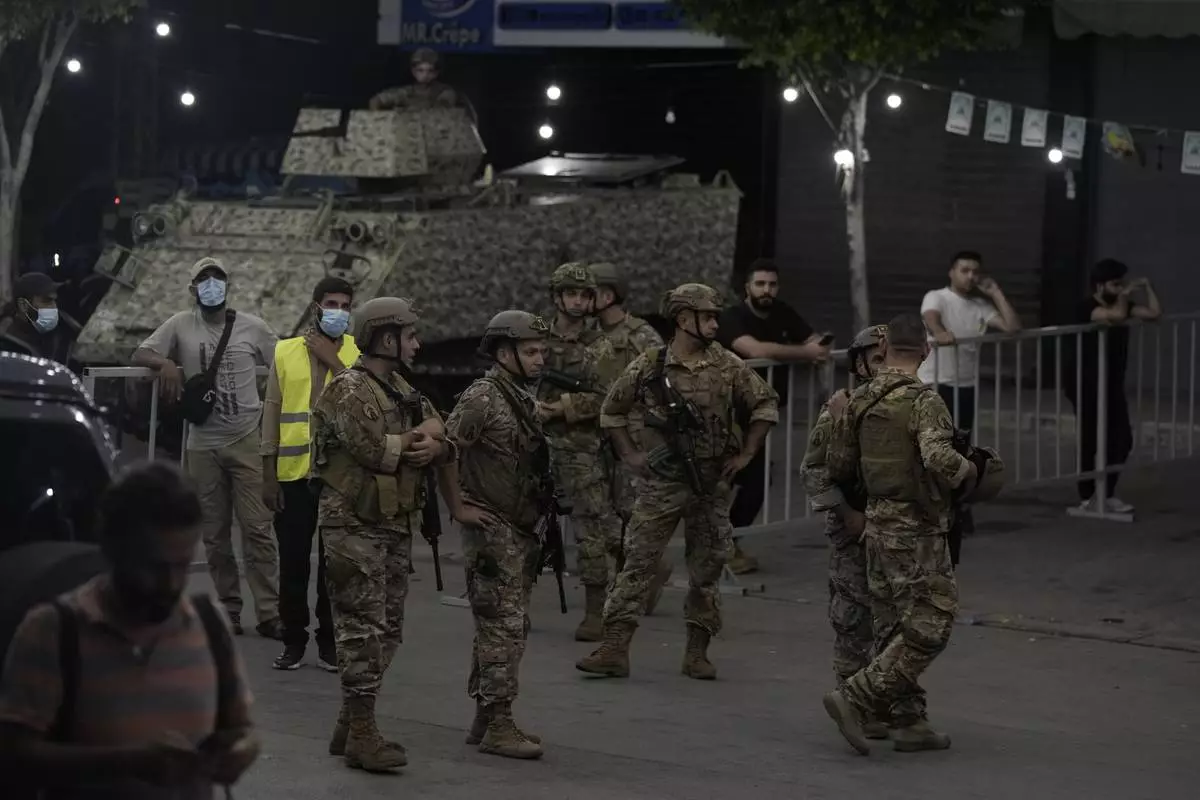
FILE - Lebanese soldiers secure the area near the site of an Israeli airstrike in Beirut's southern suburb, on Sept. 23, 2024. (AP Photo/Bilal Hussein, File)
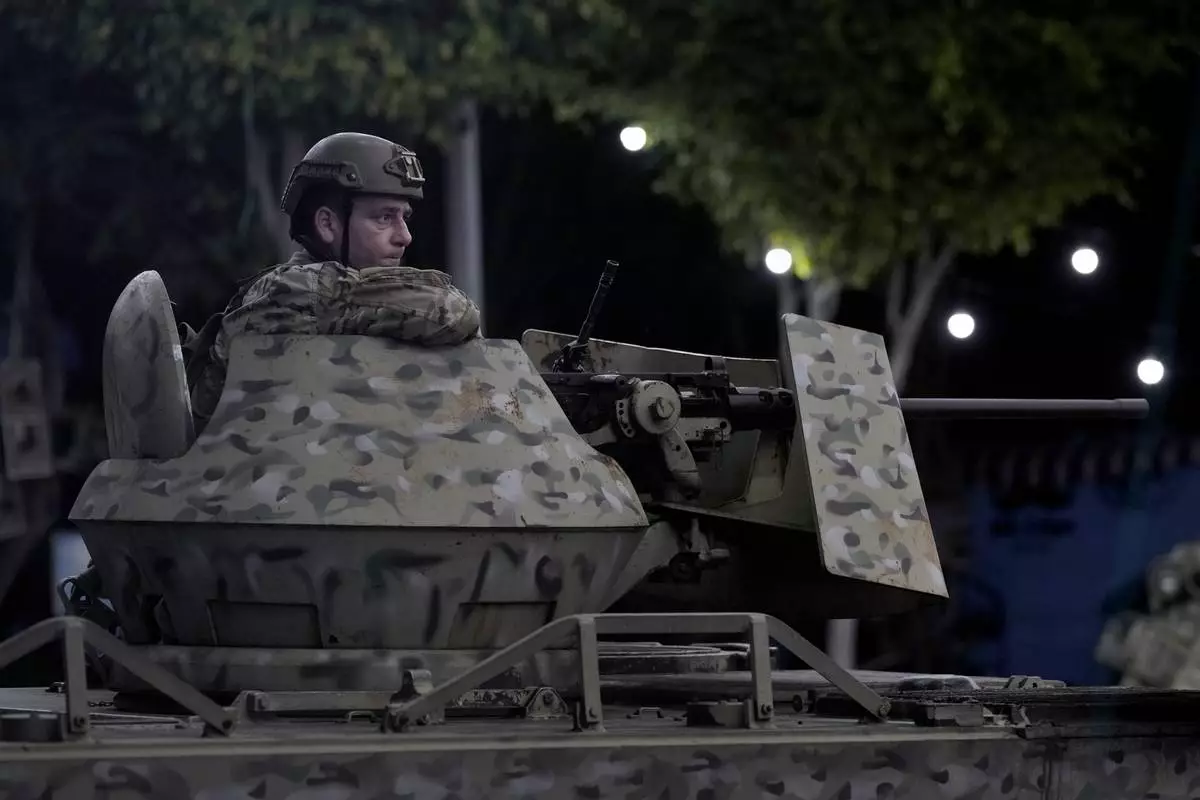
FILE - A Lebanese army soldier sits behind his weapon on the top of an armored personnel carrier at the site of an Israeli airstrike in Beirut's southern suburb, on Sept. 23, 2024. (AP Photo/Bilal Hussein, File)
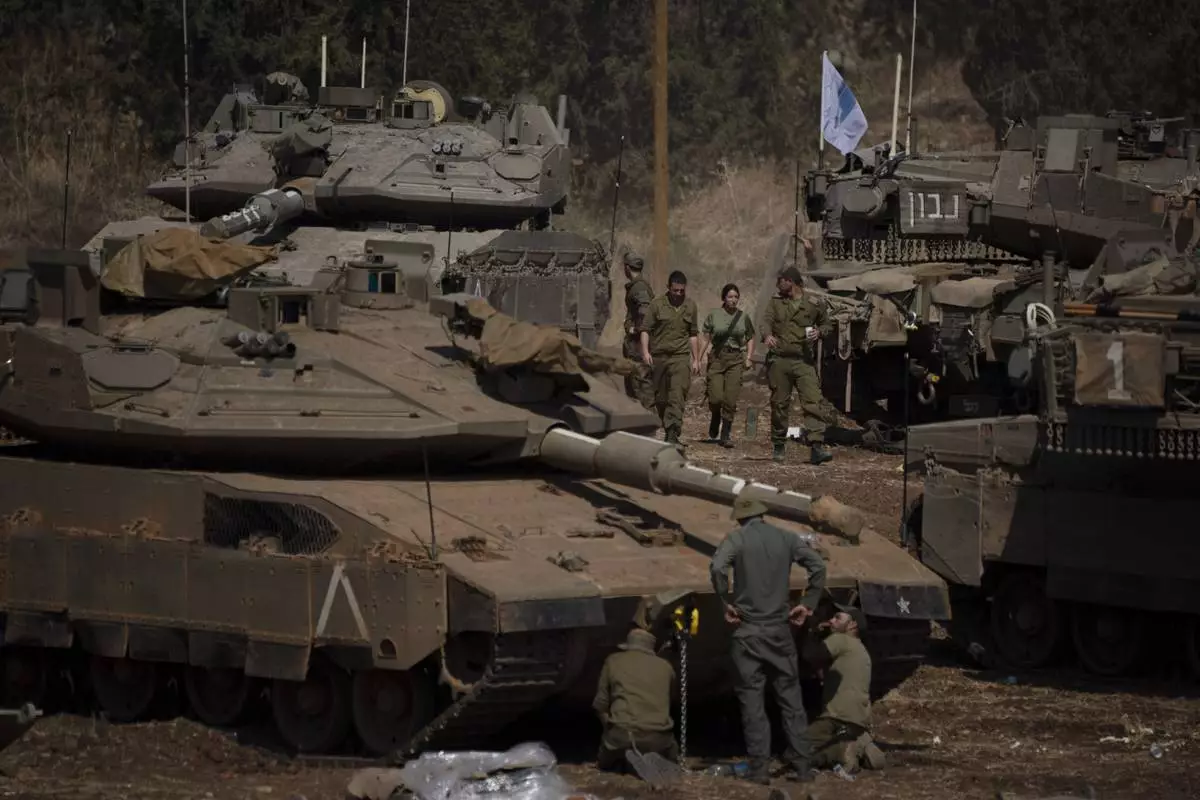
FILE - Israeli soldiers work on tanks and armoured personnel carriers (APC) in northern Israel, on Sept. 30, 2024. (AP Photo/Leo Correa, File)
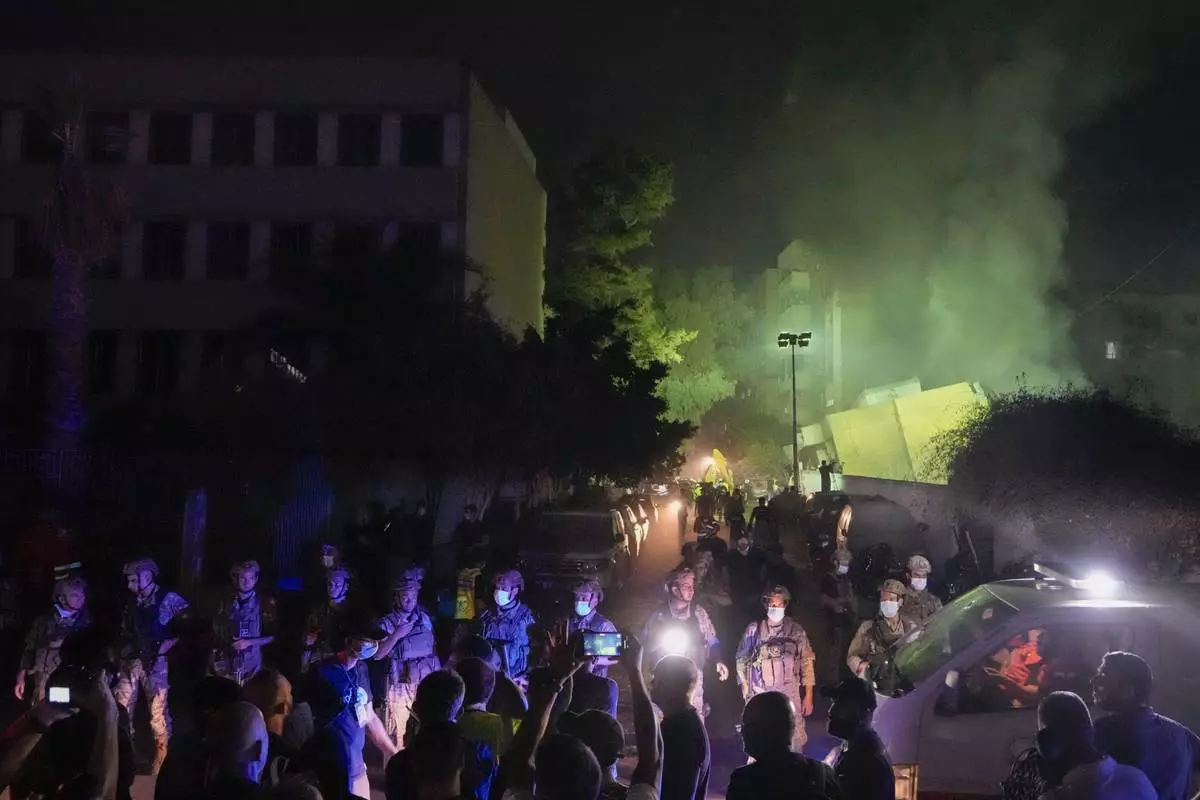
FILE - Lebanese soldiers secure the area at the site of an Israeli airstrike in Beirut's southern suburbs on Sept. 27, 2024. (AP Photo/Bilal Hussein, File)
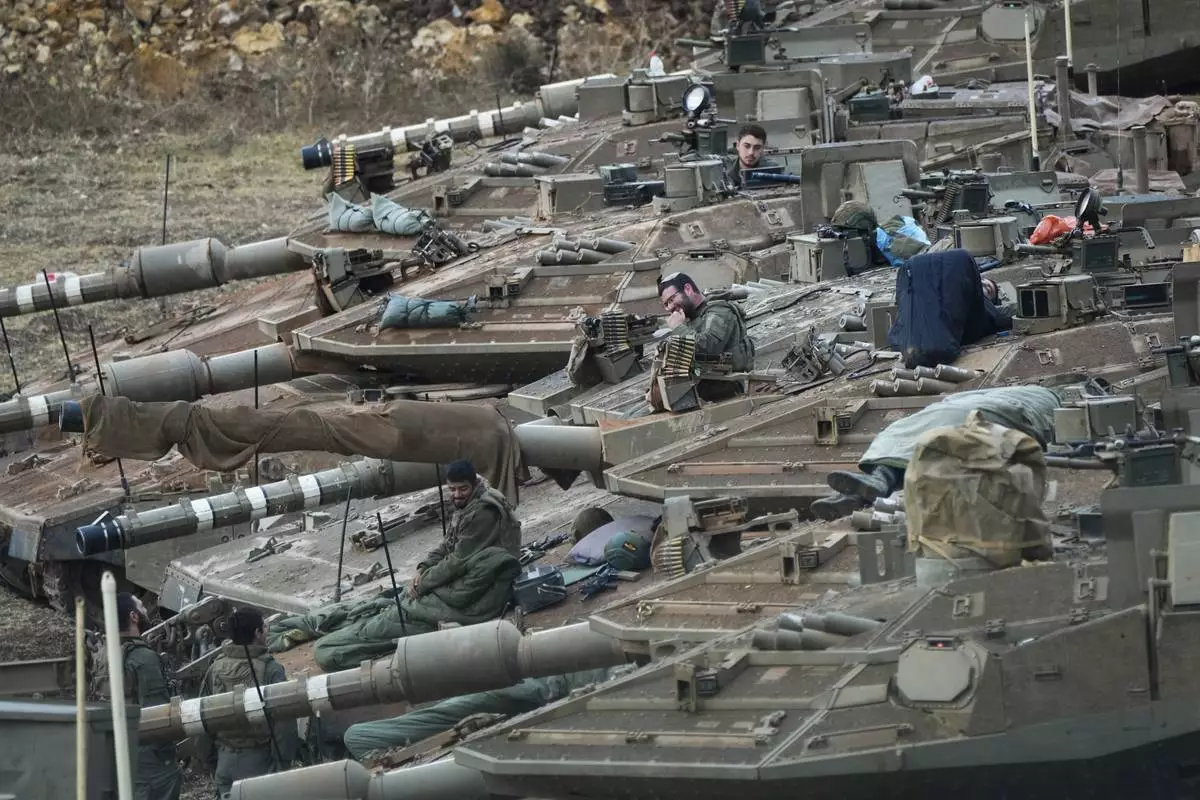
FILE - Israeli soldiers work on tanks in a staging area in northern Israel near the Israel-Lebanon border, on Oct. 1, 2024. (AP Photo/Baz Ratner, File)
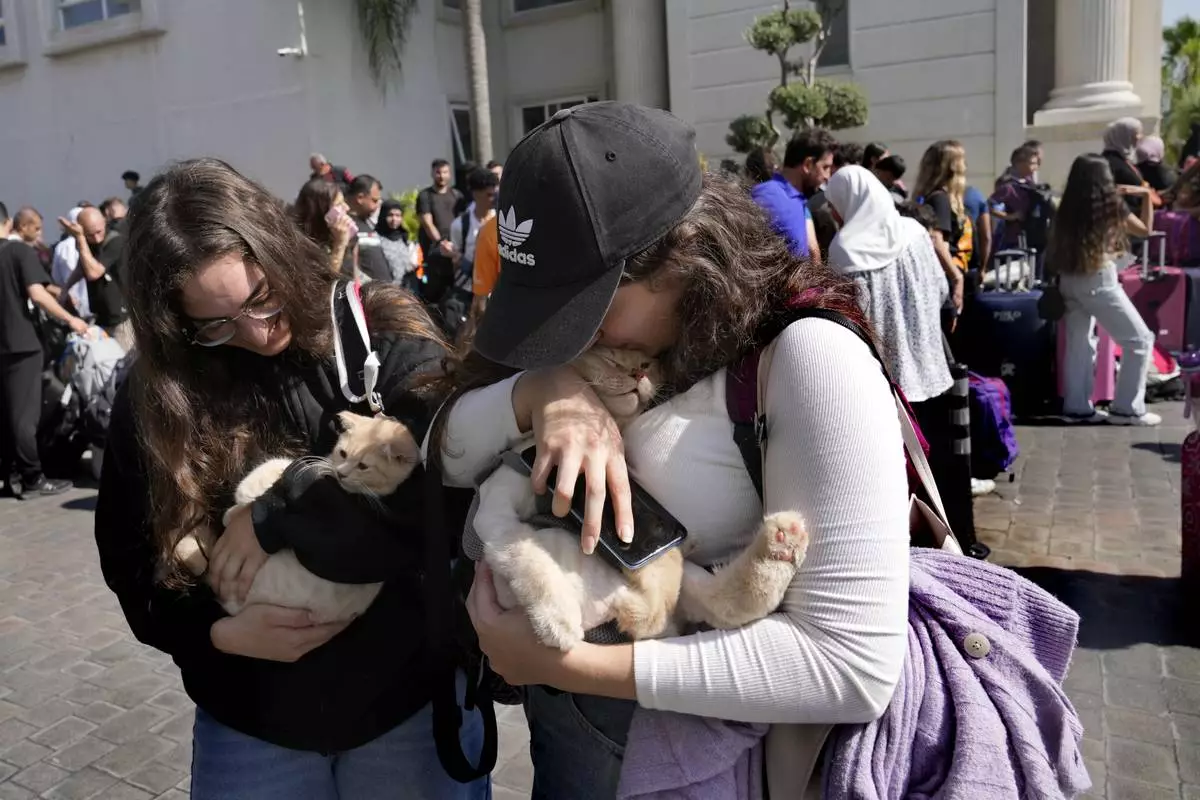
Turkish citizens carry their cats as they wait to board a Turkish navy vessel to be evacuated to Turkey at a gathering point, in Beirut, Lebanon, Wednesday, Oct. 9, 2024. (AP Photo/Hussein Malla)
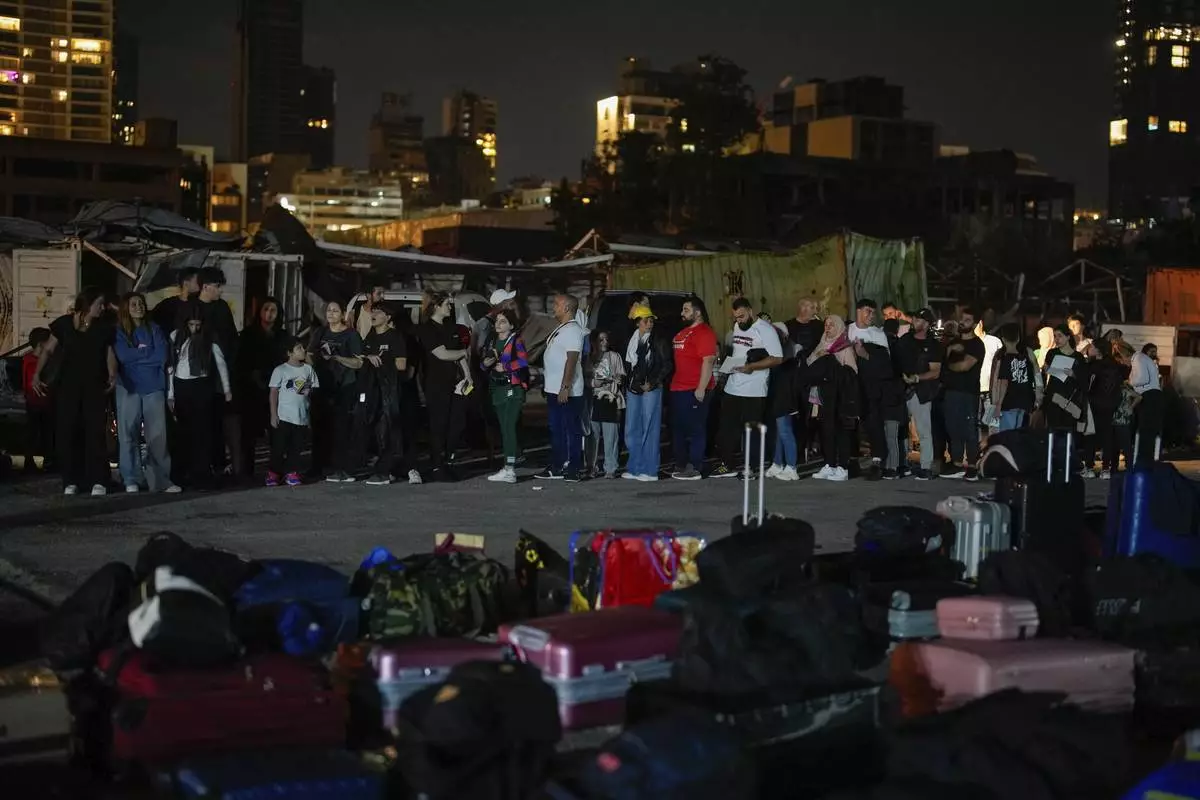
Turkish citizens stand in line waiting for their turn to board two Turkish military ships to evacuate them from Lebanon to Turkey, in Beirut port, Wednesday, Oct. 9, 2024. (AP Photo/Emrah Gurel)
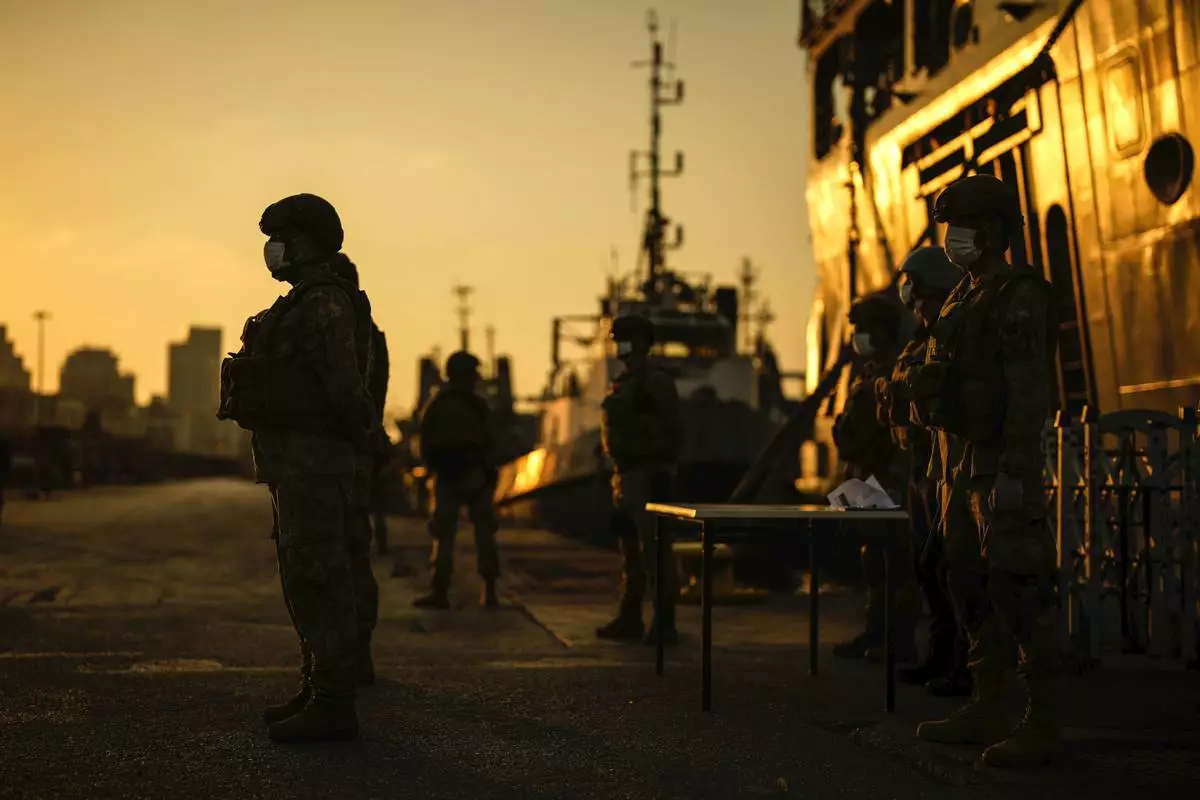
Turkish security officials stand guard next to Turkish military ships preparing to evacuate citizens from Lebanon to Turkey in Beirut port, Wednesday, Oct. 9, 2024. (AP Photo/Emrah Gurel)
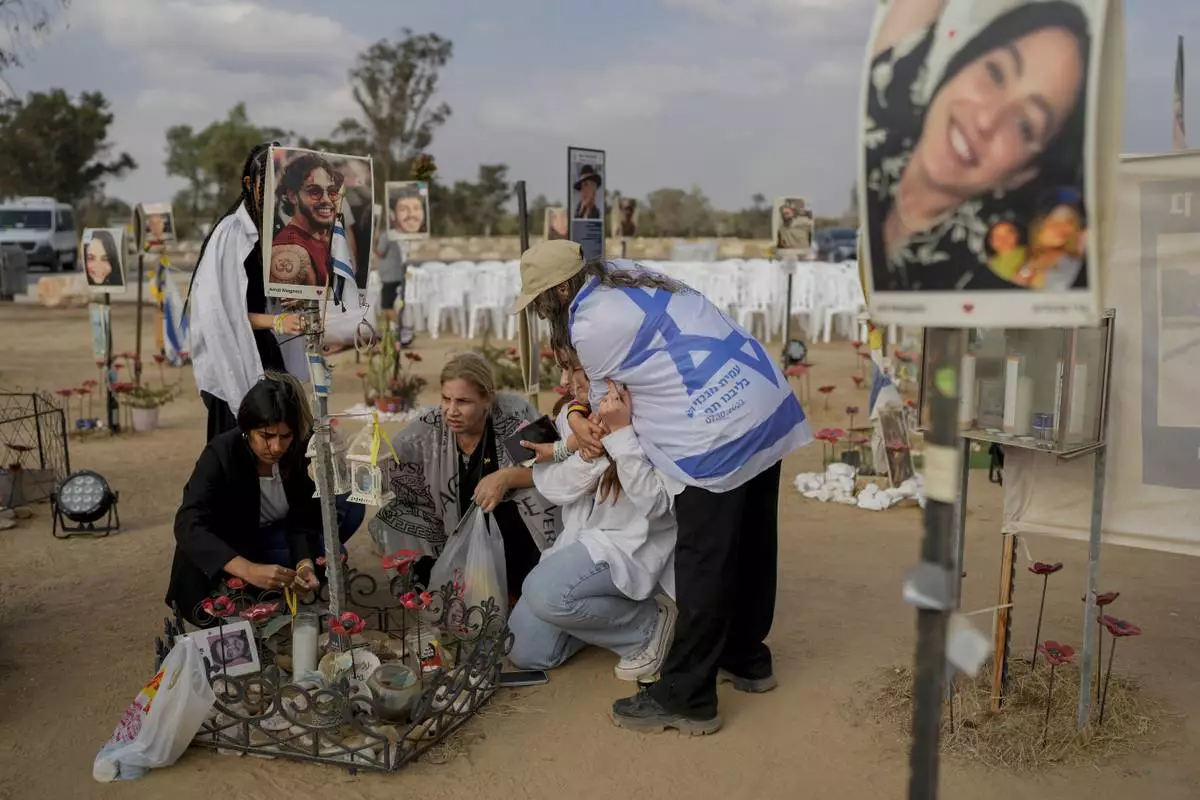
Peopls visit the site of the Nova music festival, where hundreds of revelers were killed and abducted by Hamas, on the eve of the one-year anniversary of the attack, near Kibbutz Reim, southern Israel, Sunday, Oct. 6, 2024. (AP Photo/Ohad Zwigenberg)

People pray during a pro-Israel demonstration to mark the first anniversary of the Hamas attack on Israel, in Brasilia, Brazil, Sunday, Oct. 6, 2024. (AP Photo/Eraldo Peres)
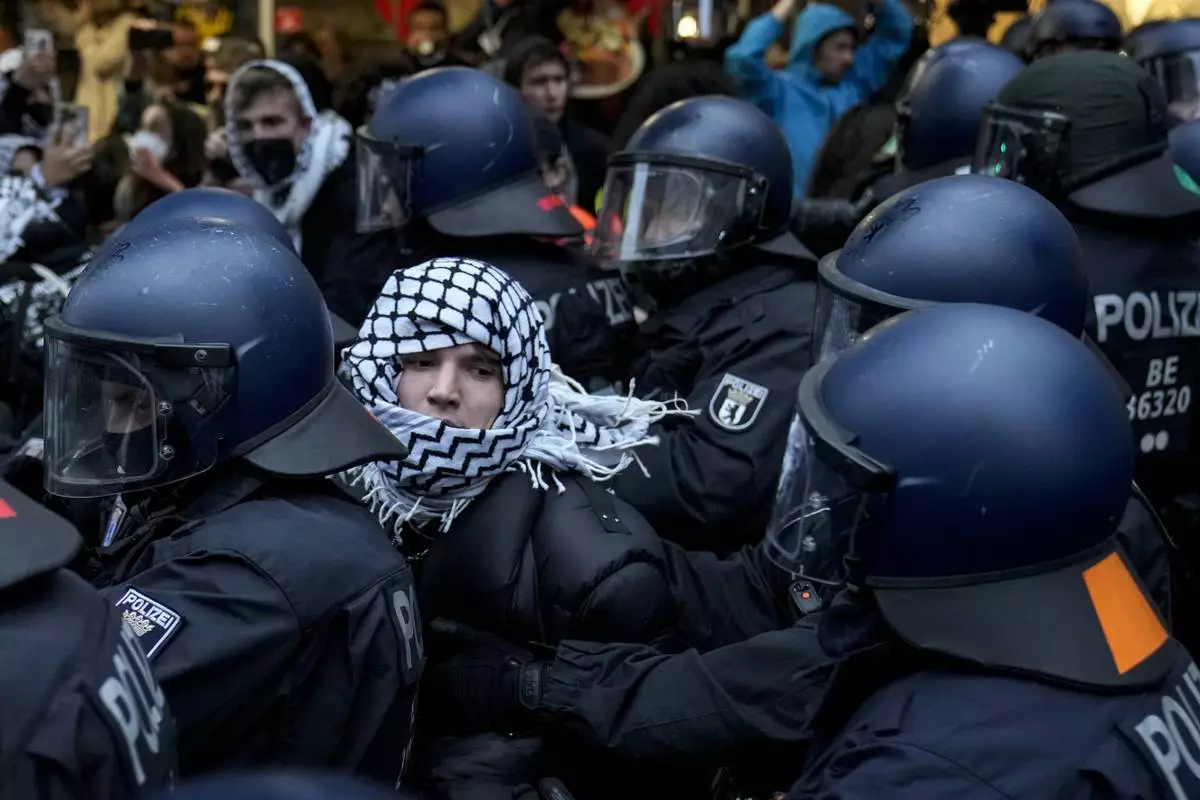
Police officers clash with protesters during a pro-Palestinian rally in Berlin, Germany, Sunday, Oct. 6, 2024. (AP Photo/Ebrahim Noroozi)

An Israeli soldier looks at the scene of a stabbing and shooting attack where Israel's Magen David Adom rescue service said one person was killed and several others were wounded in Beersheba, Israel, Sunday, Oct. 6, 2024. (AP Photo/Tsafrir Abayov)
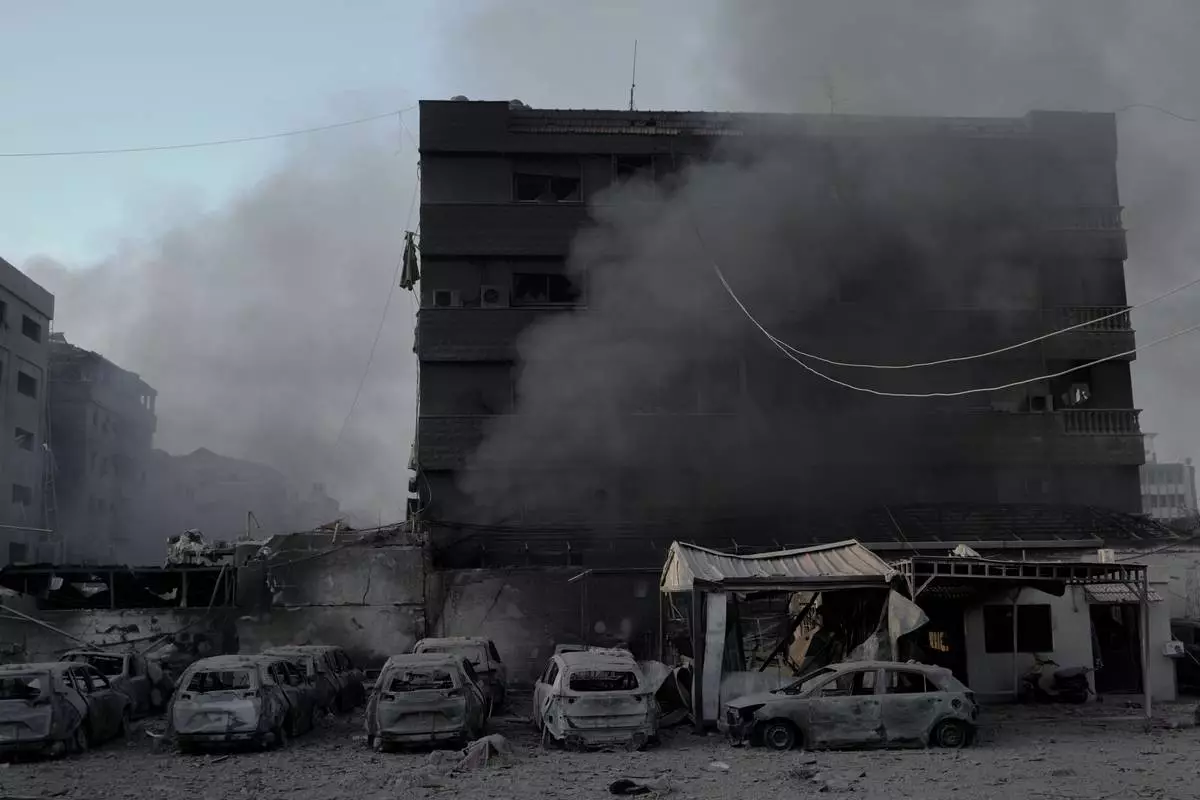
Smoke rises near charred cars at the site of an Israeli airstrike in Dahiyeh, Beirut, Lebanon, Sunday, Oct. 6, 2024. (AP Photo/Bilal Hussein)
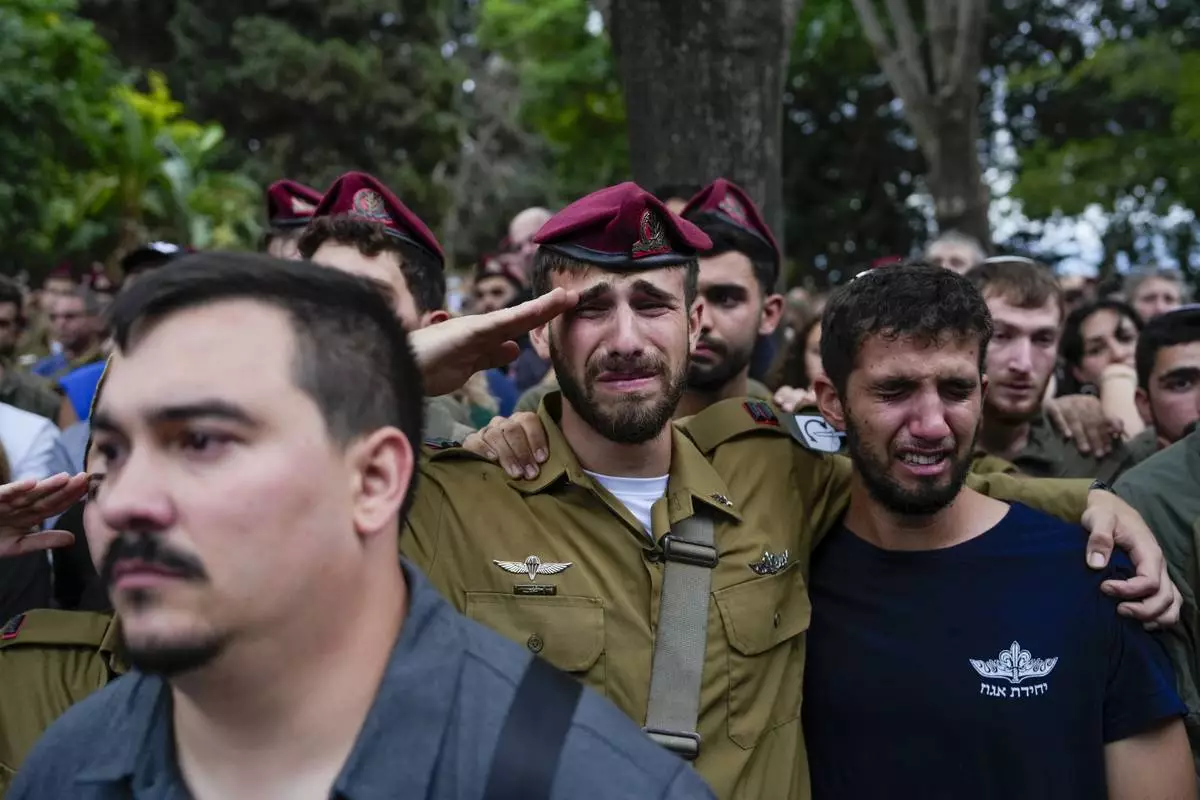
Mourners attend the funeral of Sgt. First Class Nazar Itkin who was killed during Israel's ground operation against Hezbollah militants in Lebanon, in Kiryat Ata, Israel, Sunday, Oct. 6, 2024. (AP Photo/Baz Ratner)
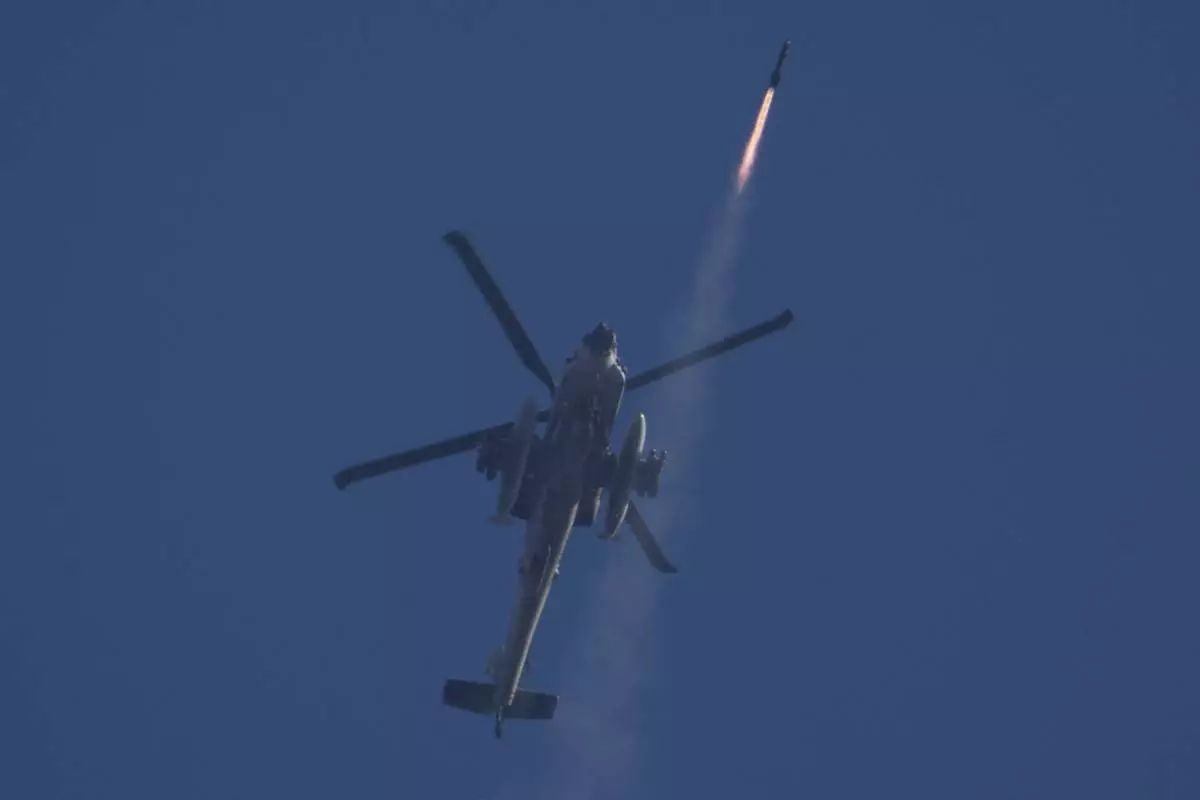
An Israeli Apache helicopter fires a missile towards southern Lebanon as seen from northern Israel, Friday, Oct. 4, 2024. (AP Photo/Leo Correa)
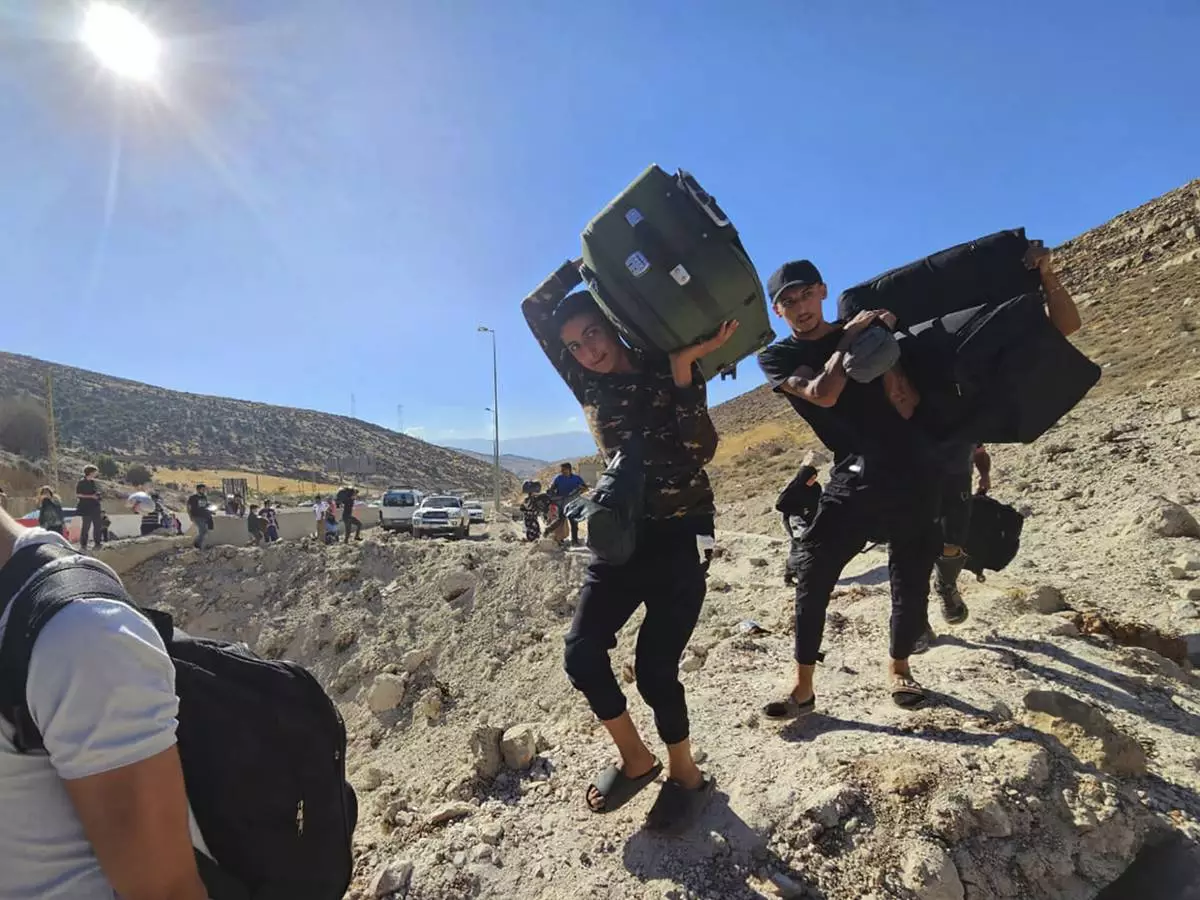
Syrians carry their luggage as they cross on foot into Syria through a crater caused by an Israeli airstrike to cut the road between the Lebanese and the Syrian checkpoints, at the Masnaa crossing, in the eastern Bekaa Valley, Lebanon, Friday, Oct. 4, 2024. (AP Photo/Samer Husseini)
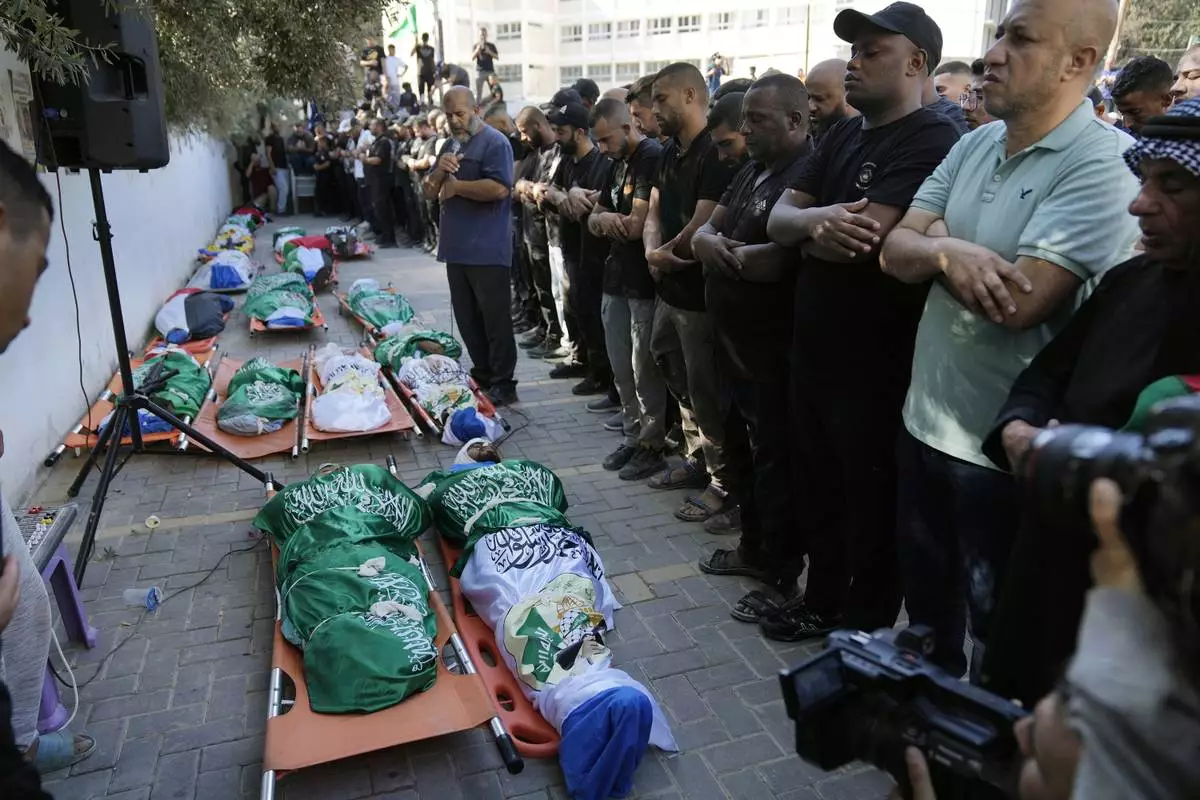
Draped in the Palestinian, Hamas and Islamic Jihad flags, mourners pray by the bodies of 18 Palestinians who were killed in an Israeli airstrike during their funeral in Tulkarem, Friday, Oct. 4, 2024. (AP Photo/Nasser Nasser)
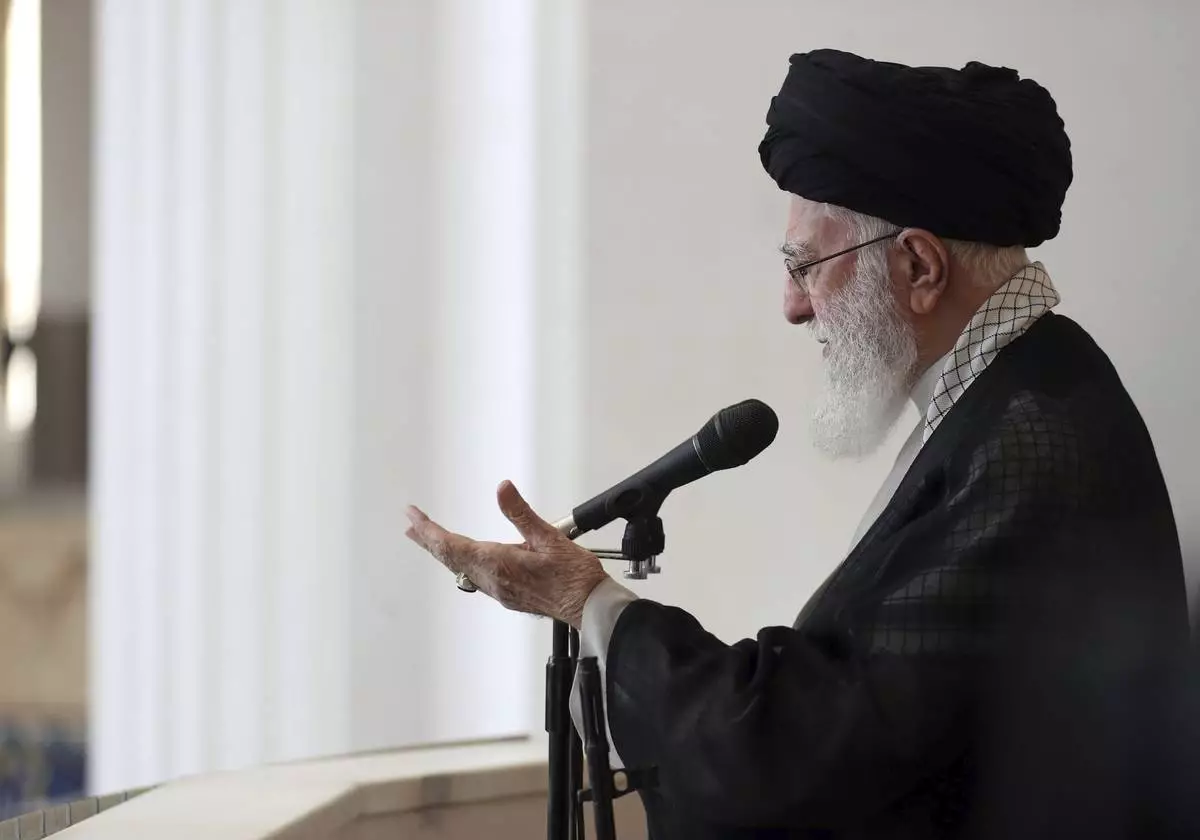
In this photo released by the official website of the office of the Iranian supreme leader, Supreme Leader Ayatollah Ali Khamenei gestures as he delivers his sermon during Friday prayers at Imam Khomeini grand mosque, in Tehran, Iran, Friday, Oct. 4, 2024. (Office of the Iranian Supreme Leader via AP)
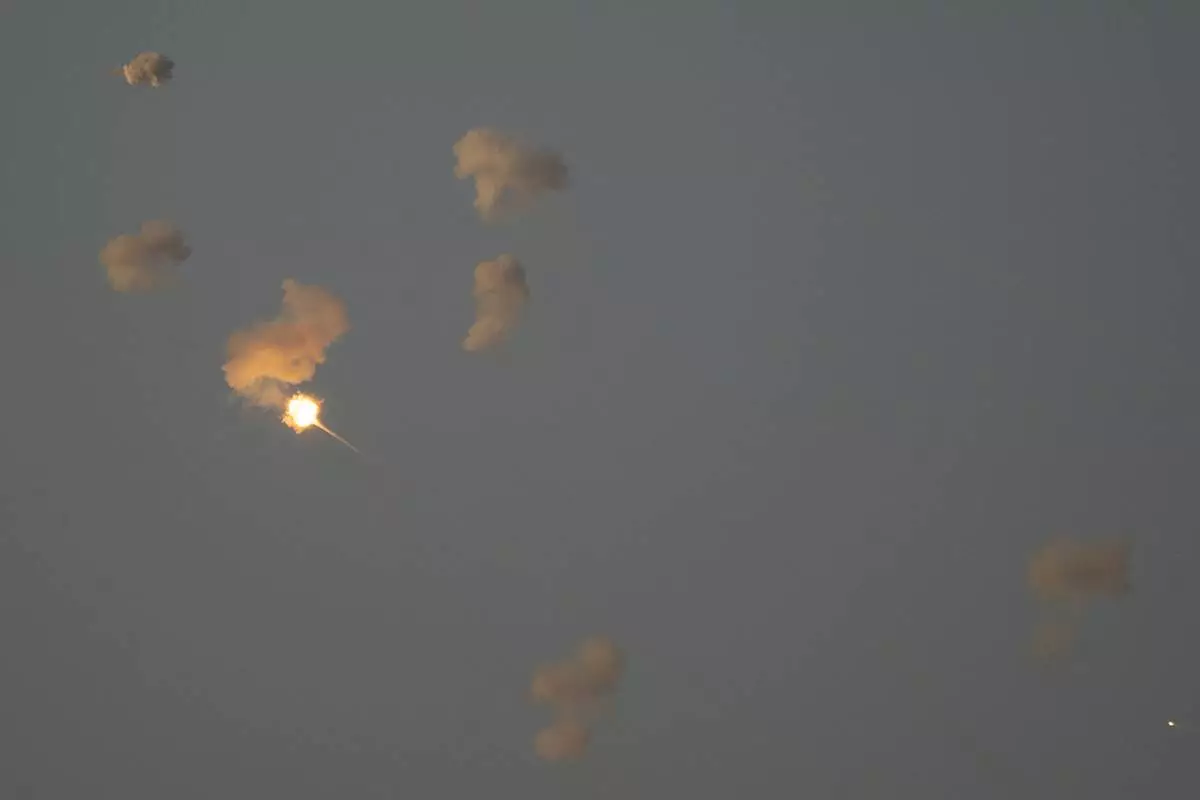
Israeli Iron Dome air defense system fires to intercept rockets that were launched from Lebanon, in northern Israel, Friday, Oct. 4, 2024. (AP Photo/Leo Correa)
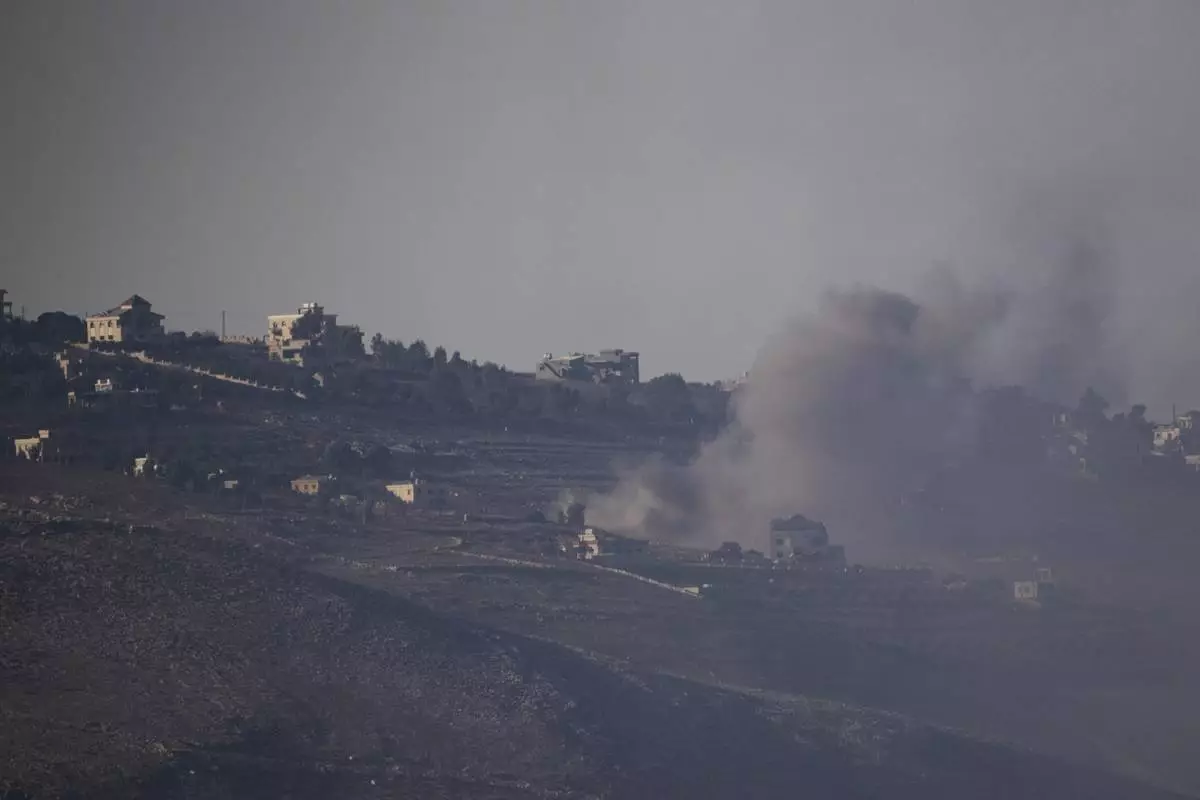
Smoke rises following an Israeli shelling in southern Lebanon as seen from northern Israel, Friday, Oct. 4, 2024. (AP Photo/Leo Correa)
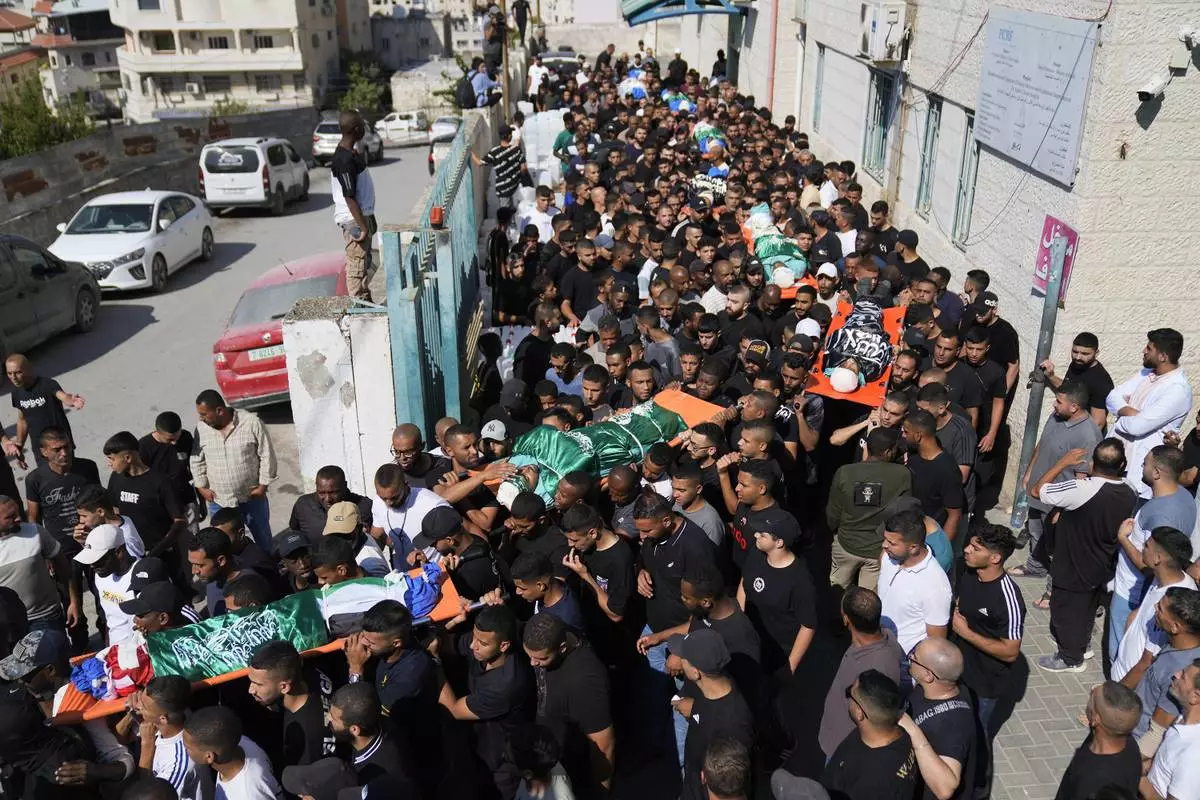
Draped in the Palestinian, Hamas and Islamic Jihad flags, mourners carry the bodies of 18 Palestinians who were killed in an Israeli airstrike during their funeral in Tulkarem, Friday, Oct. 4, 2024. (AP Photo/Nasser Nasser)
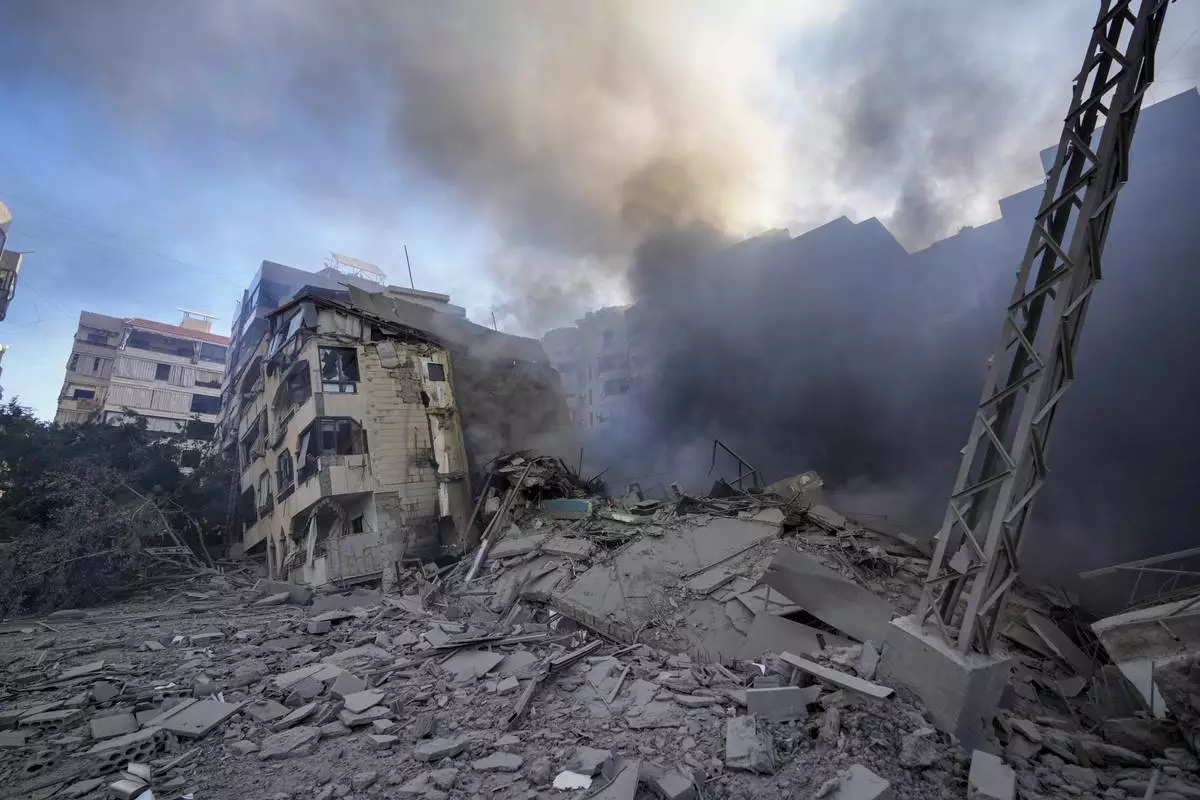
Smoke rises from the site of an Israeli airstrike in Dahiyeh, Beirut, Lebanon, Thursday, Oct. 3, 2024. (AP Photo/Hassan Ammar)
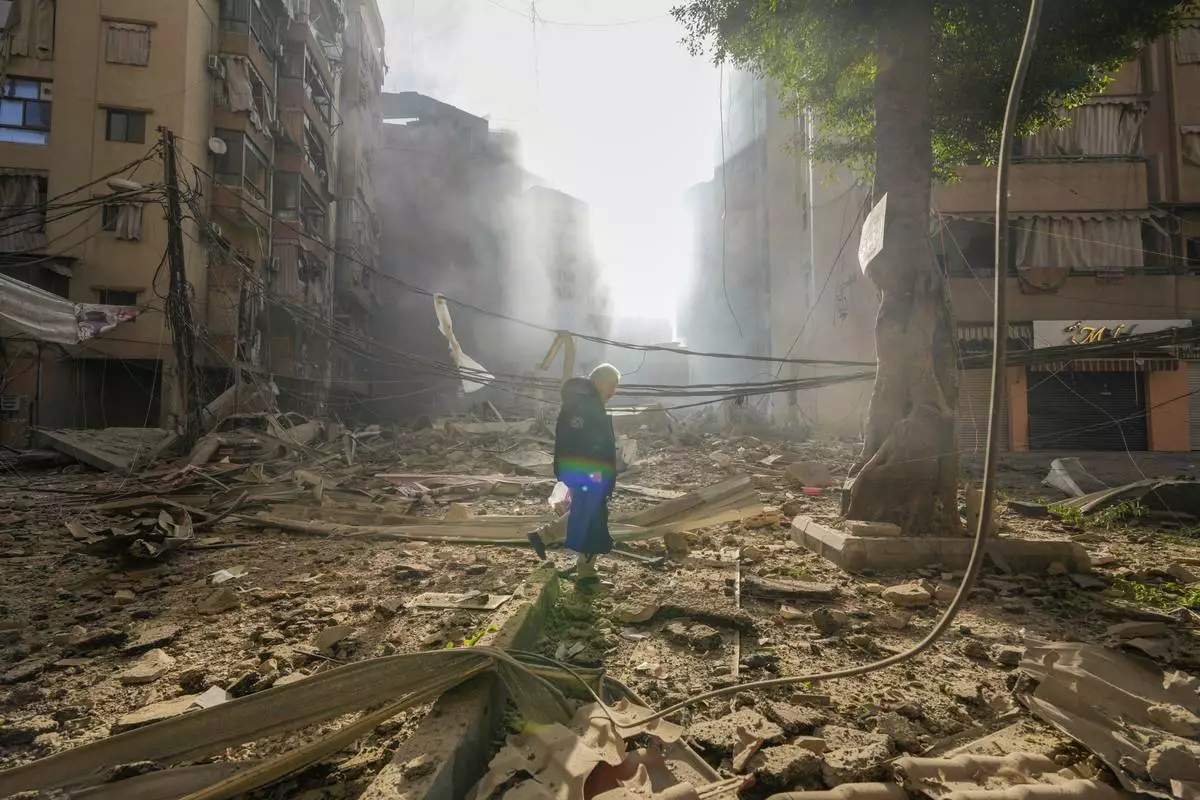
Smoke rises from the site of an Israeli airstrike in Dahiyeh, Beirut, Lebanon, Thursday, Oct. 3, 2024. (AP Photo/Hassan Ammar)
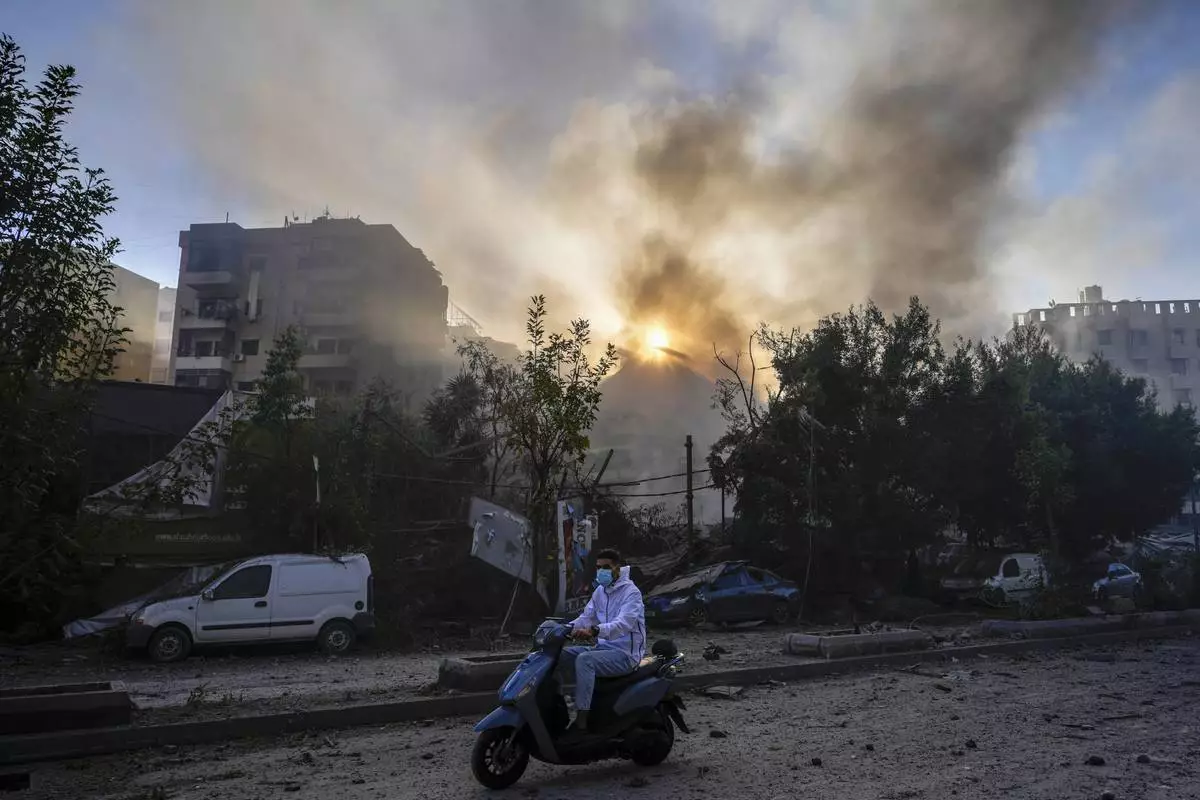
Smoke rises from the site of an Israeli airstrike in Dahiyeh, Beirut, Lebanon, Thursday, Oct. 3, 2024. (AP Photo/Hassan Ammar)
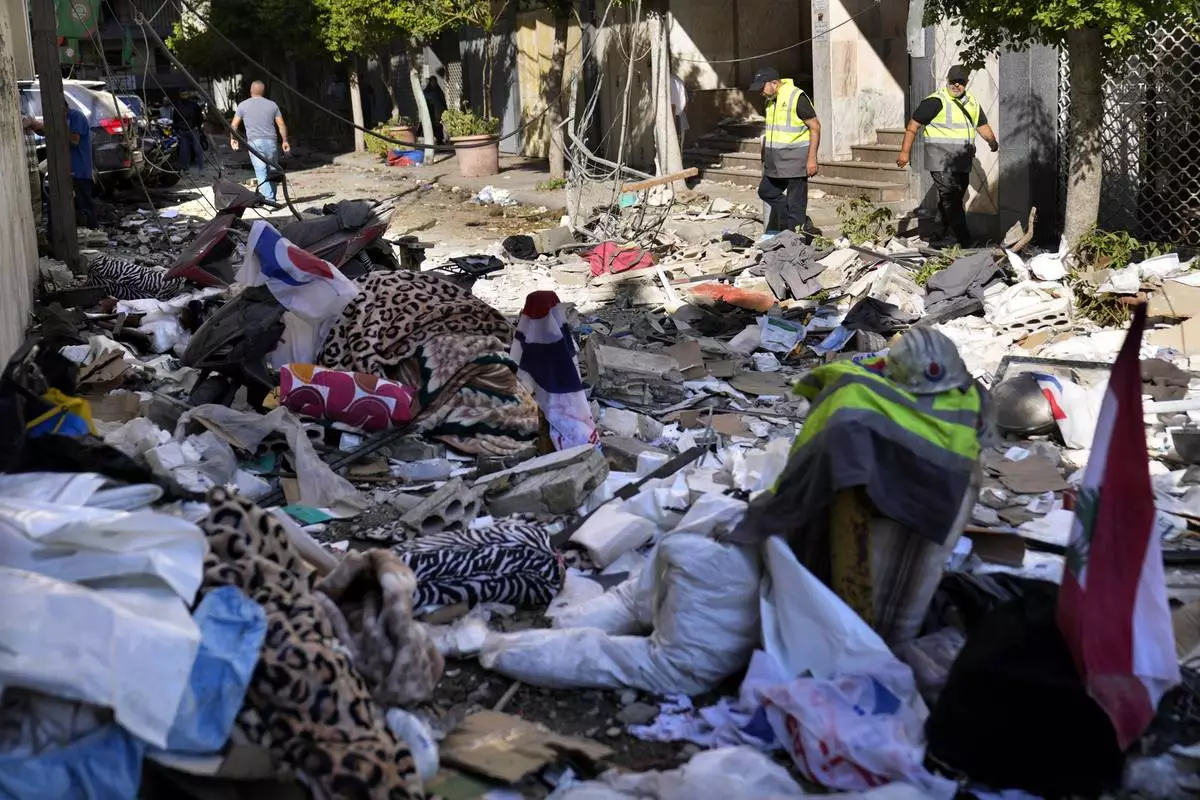
Hezbollah paramedics walk between debris after an airstrike hit an apartment in a multistory building, in central Beirut, Lebanon, Thursday, Oct. 3, 2024. (AP Photo/Hussein Malla)
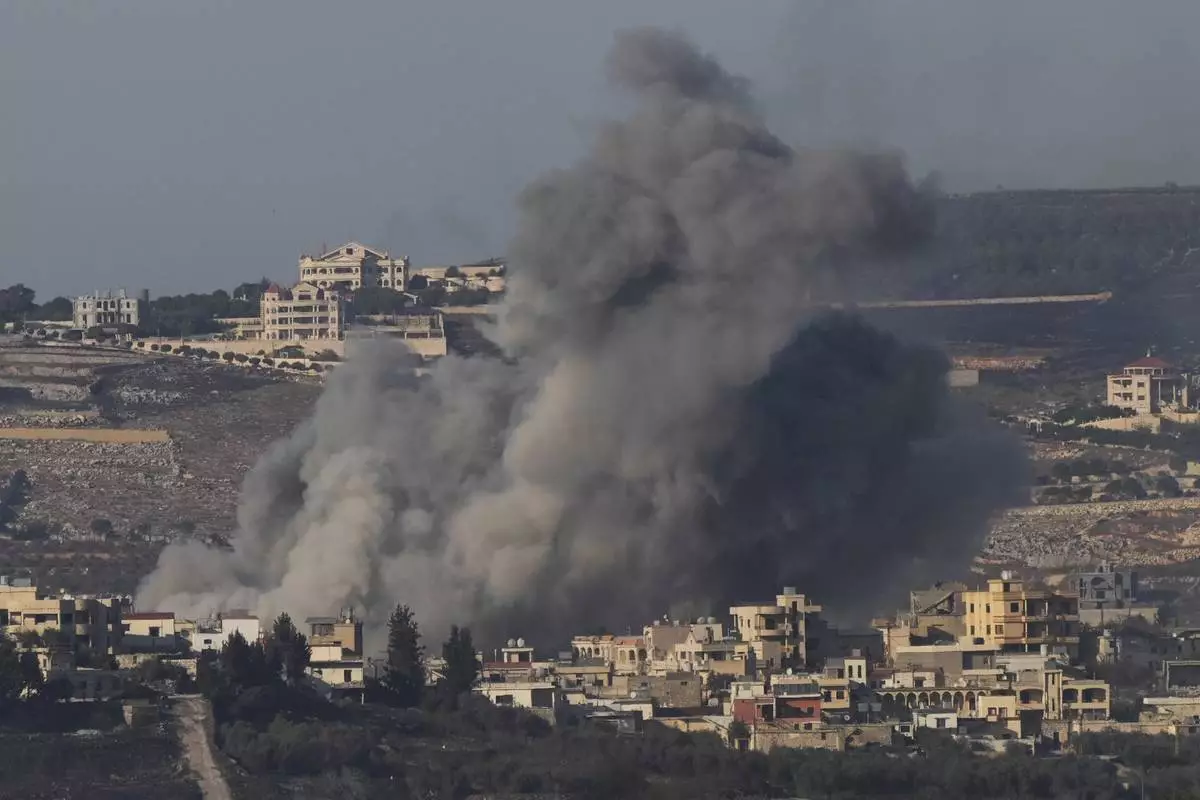
Smoke rises following an Israeli bombardment in southern Lebanon as seen from northern Israel, Thursday, Oct. 3, 2024. (AP Photo/Baz Ratner)
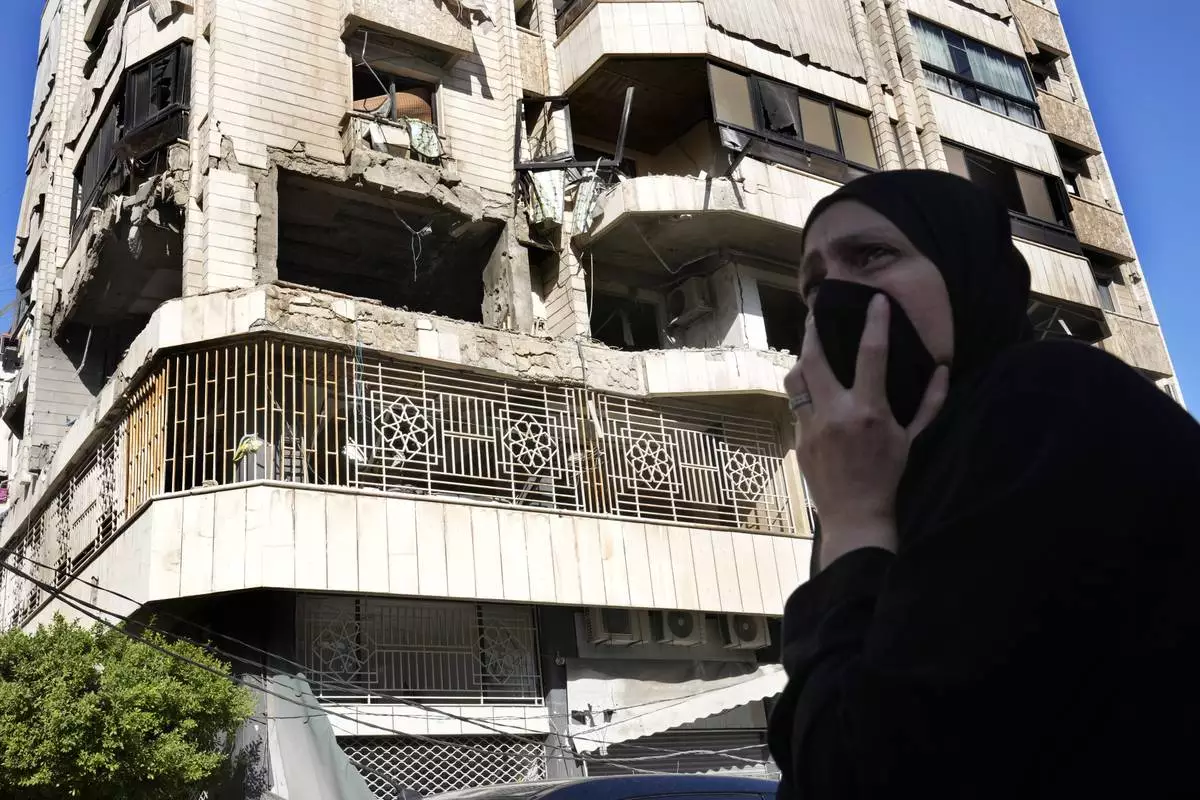
A woman reacts in front an apartment in a multistory building hit by Israeli airstrike, in central Beirut, Lebanon, Thursday, Oct. 3, 2024. (AP Photo/Hussein Malla)
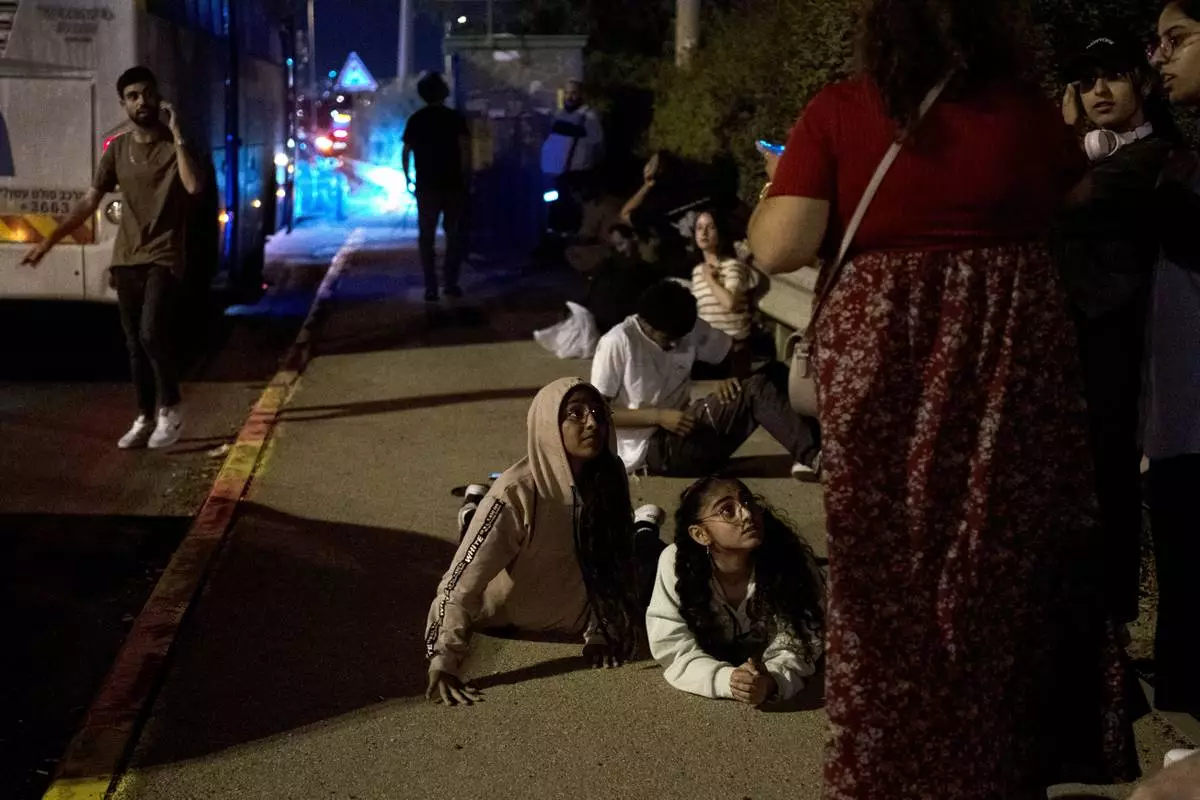
Israelis wait to re-board their bus after projectiles were launched from Iran are being intercepted in the skies over in Rosh HaAyin, Israel, Tuesday, Oct. 1, 2024. (AP Photo/Maya Alleruzzo)
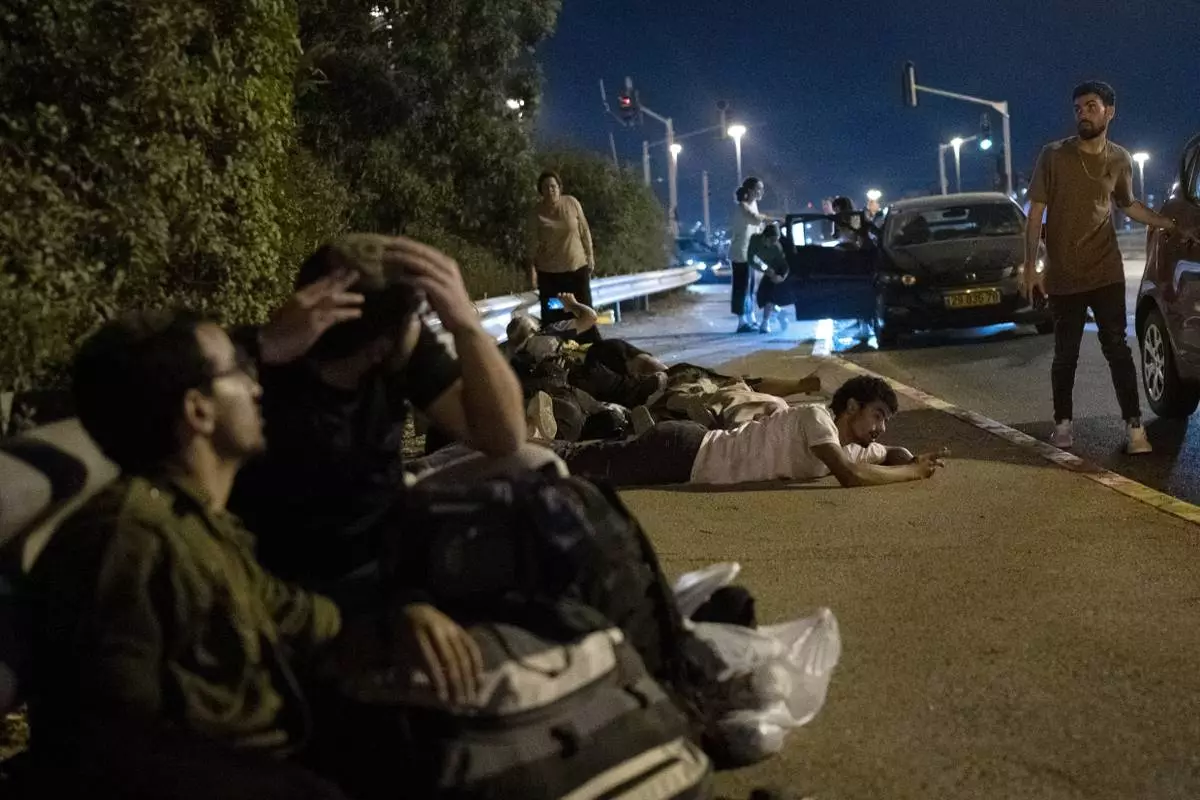
Israelis take cover as projectiles launched from Iran are being intercepted in the skies over in Rosh HaAyin, Israel, Tuesday, Oct. 1, 2024. (AP Photo/Maya Alleruzzo)
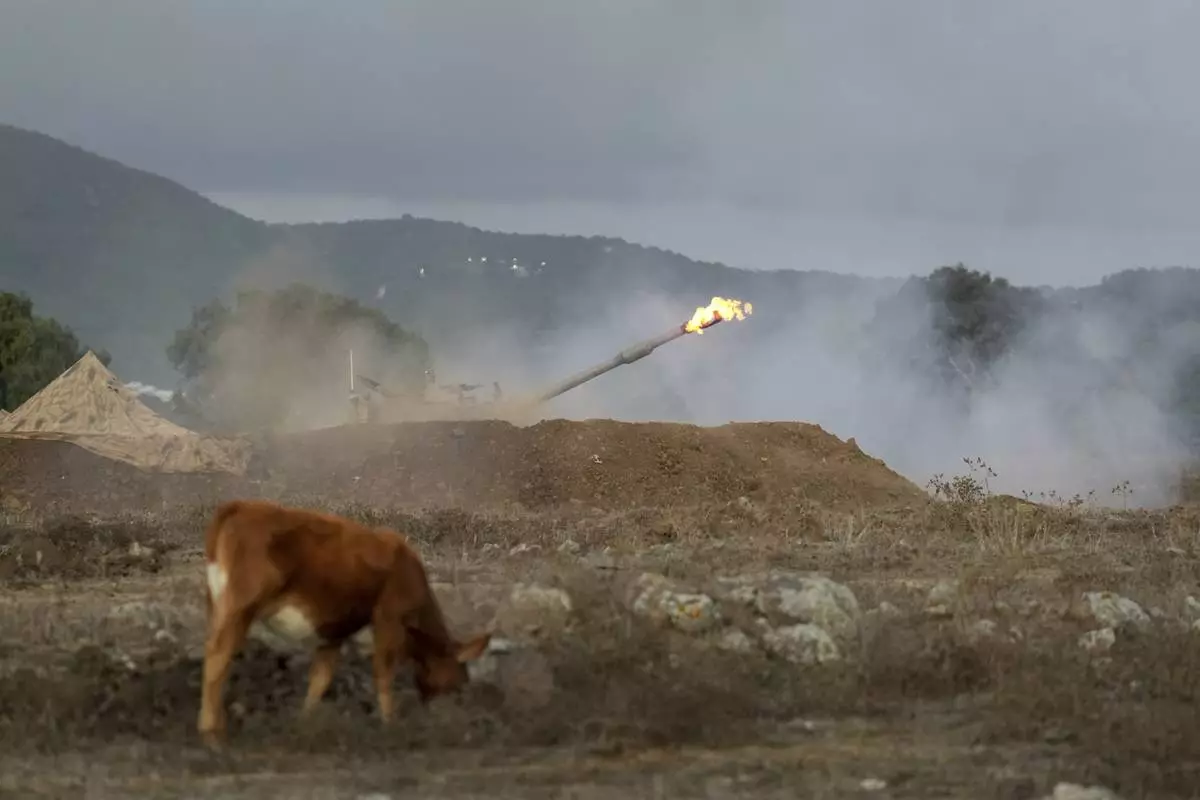
An Israeli mobile artillery unit fires a shell from northern Israel towards Lebanon, Wednesday, Oct. 2, 2024. (AP Photo/Baz Ratner)
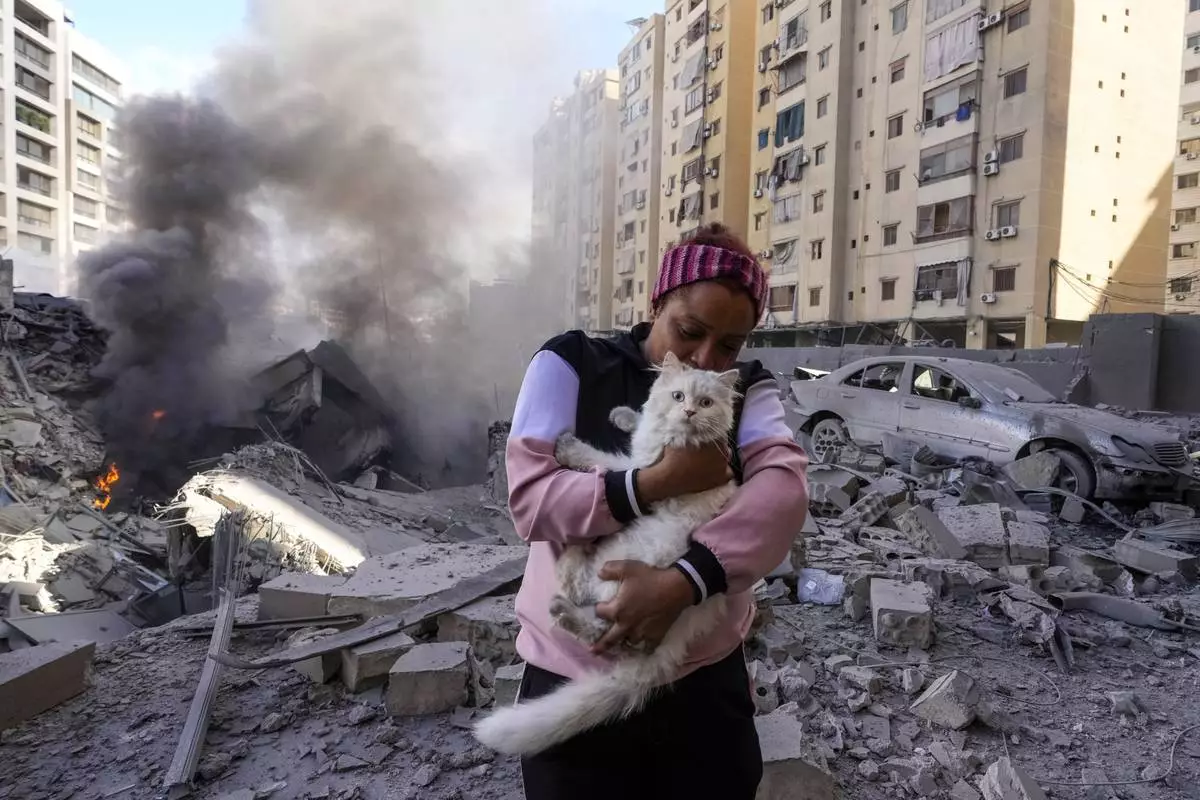
A woman holds her cat in front of a destroyed building at the site of an Israeli airstrike in Dahiyeh, Beirut, Lebanon, Wednesday, Oct. 2, 2024. (AP Photo/Hassan Ammar)
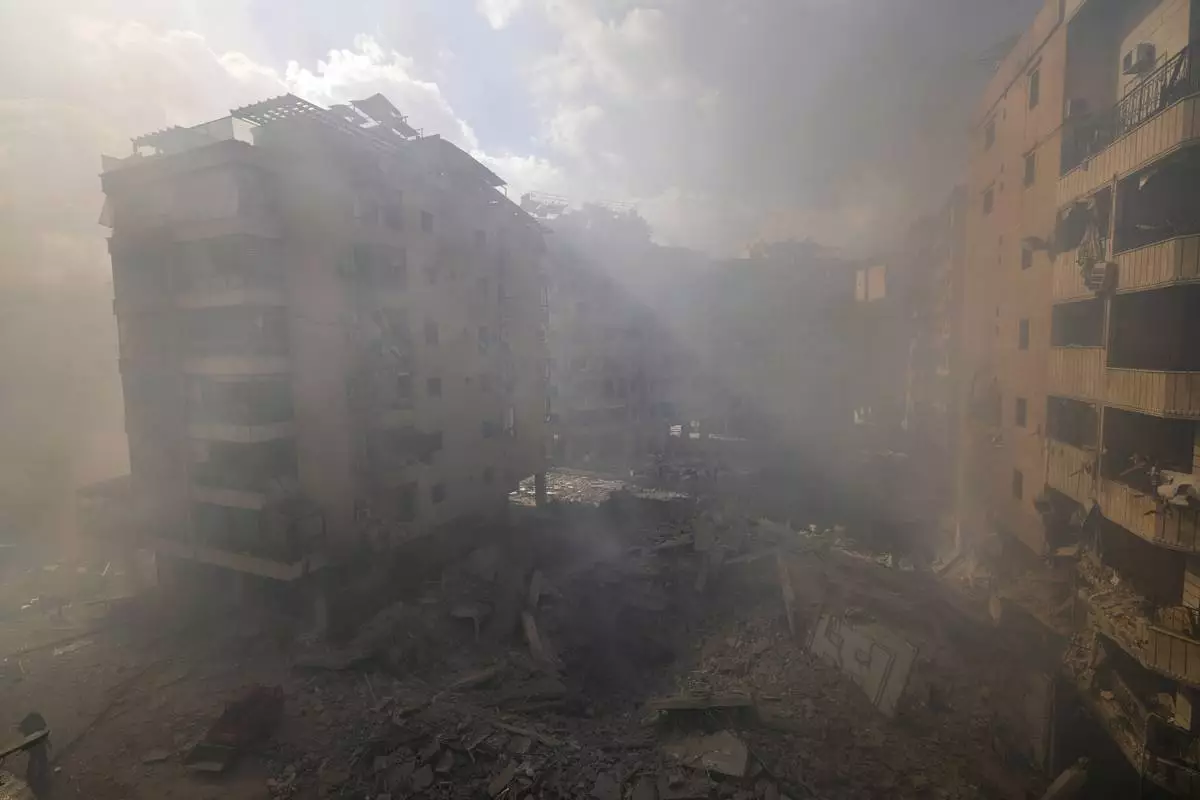
Smoke envelops the area near destroyed buildings at the site of an Israeli airstrike in Dahiyeh, Beirut, Lebanon, Wednesday, Oct. 2, 2024. (AP Photo/Hassan Ammar)
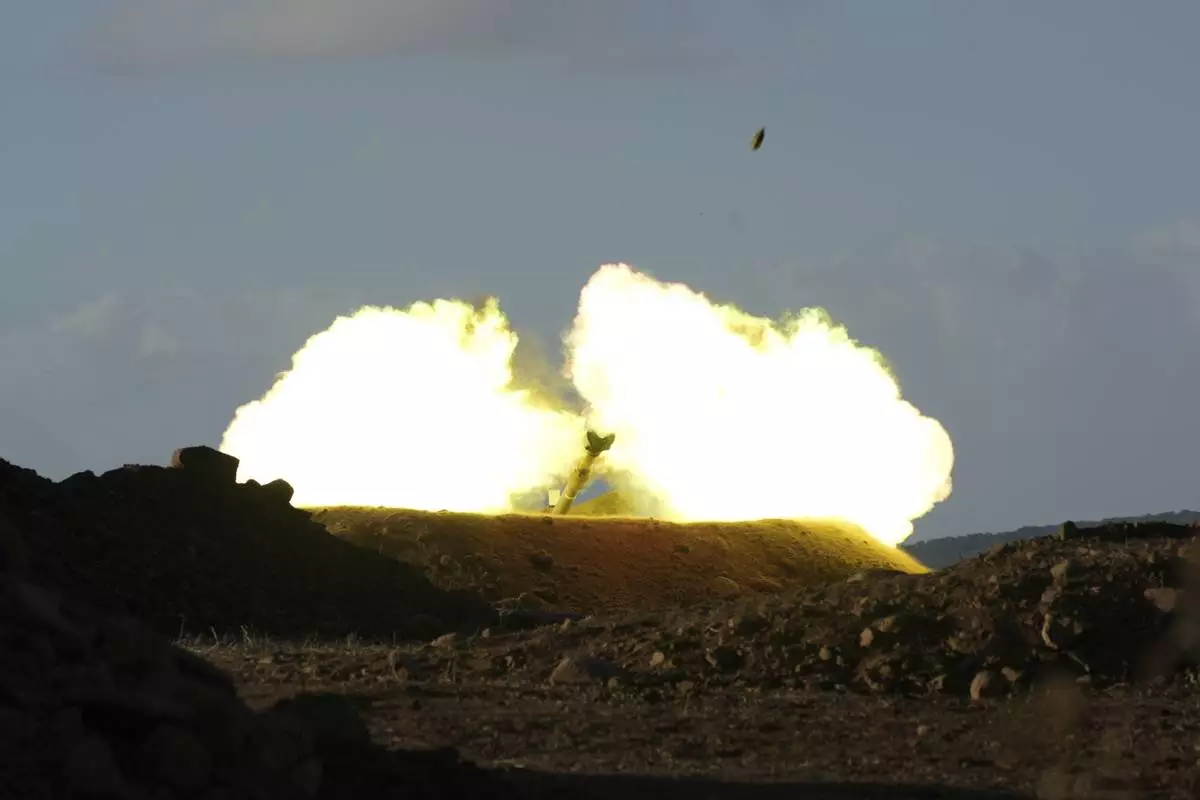
An Israeli mobile artillery unit fires a shell from northern Israel towards Lebanon, Wednesday, Oct. 2, 2024. (AP Photo/Baz Ratner)
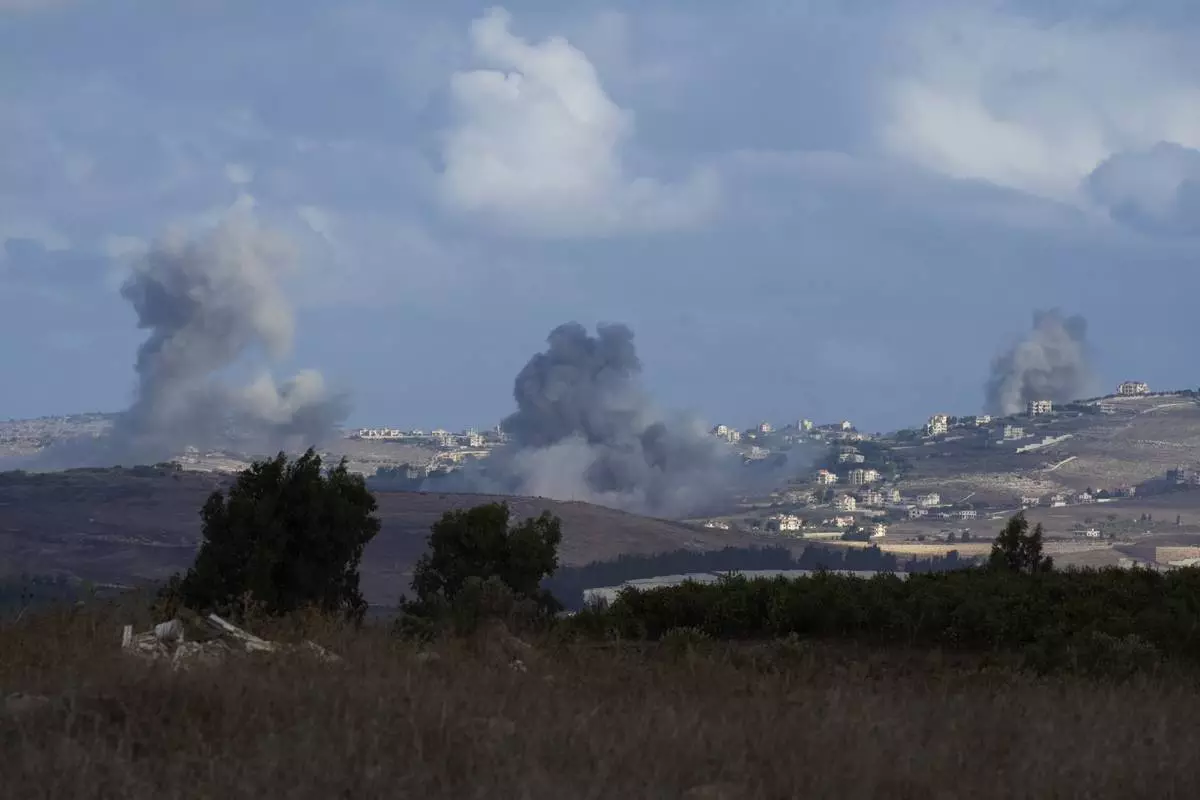
Smoke rises following Israeli bombardment in southern Lebanon as seen from northern Israel, Wednesday, Oct. 2, 2024. (AP Photo/Baz Ratner)
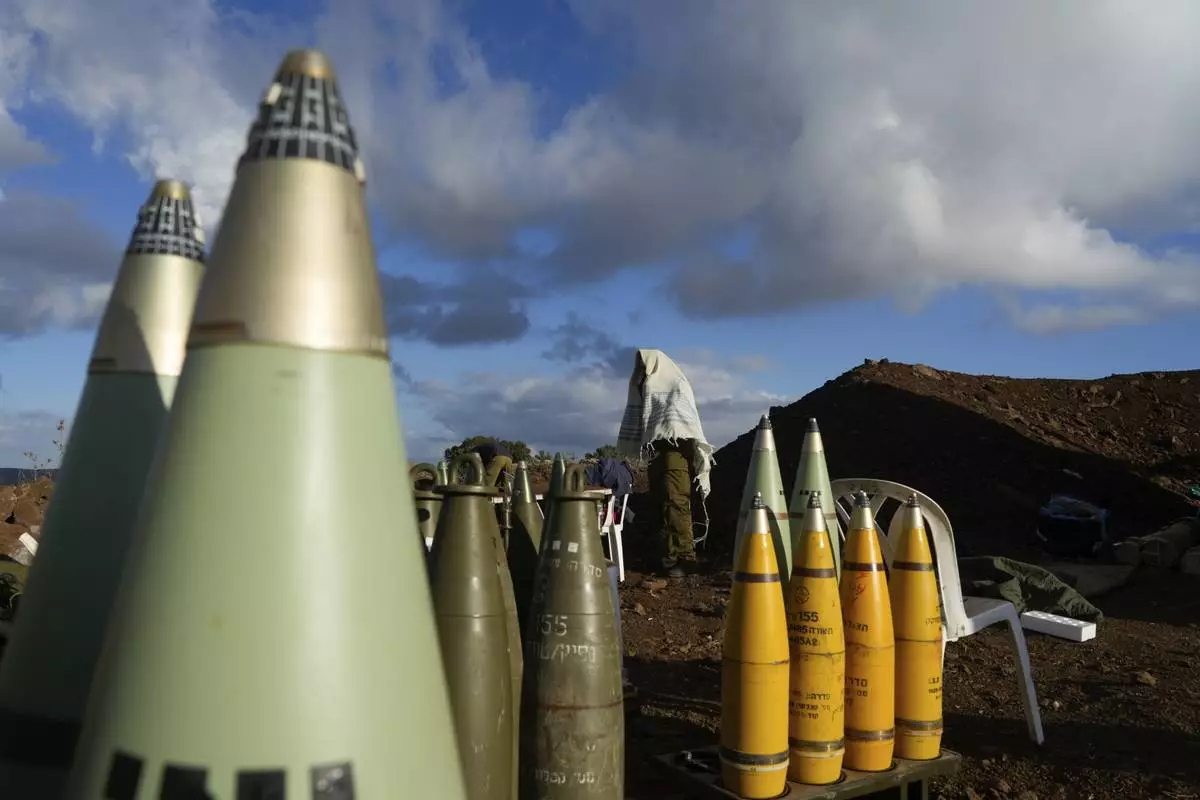
An Israeli soldier covered in a prayer shawl prays at a mobile artillery position in northern Israel, Wednesday, Oct. 2, 2024. (AP Photo/Baz Ratner)
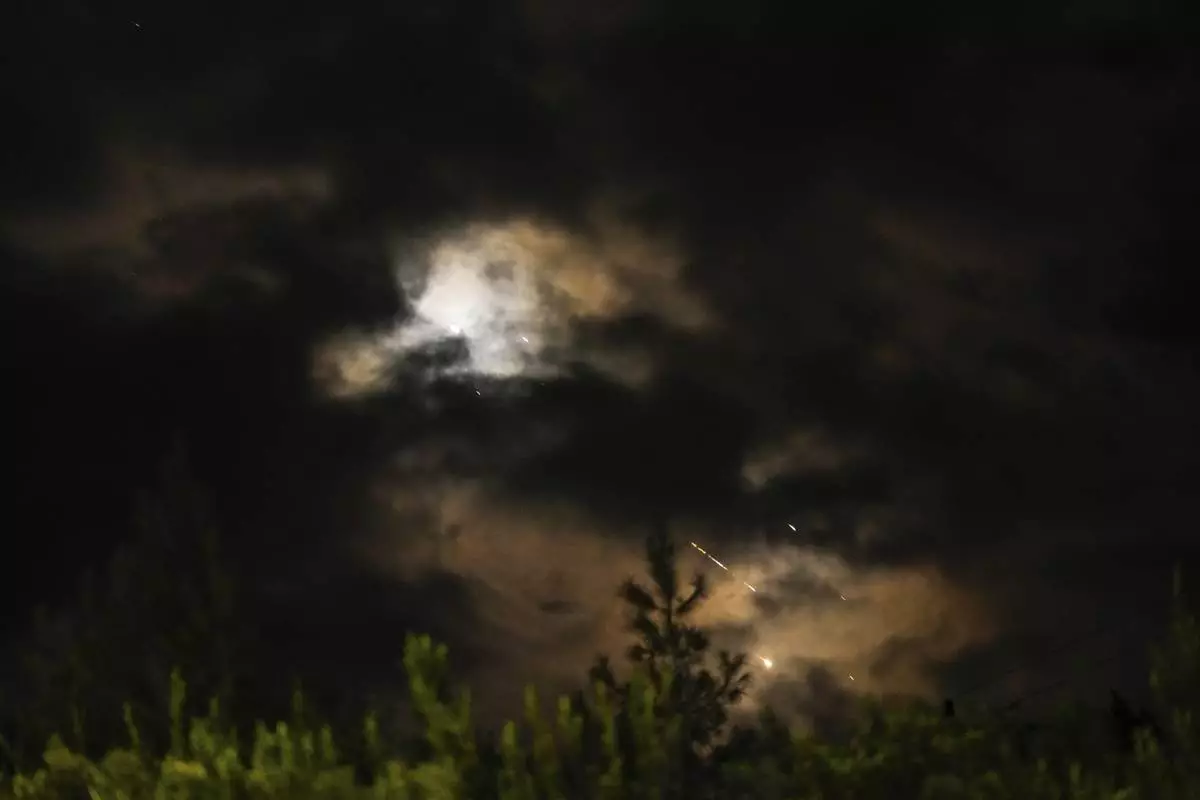
Projectiles fly through the sky in central Israel as a siren sounds a warning of incoming missiles fired from Iran towards Israel, Tuesday, Oct. 1, 2024. (AP Photo/Ohad Zwigenberg)
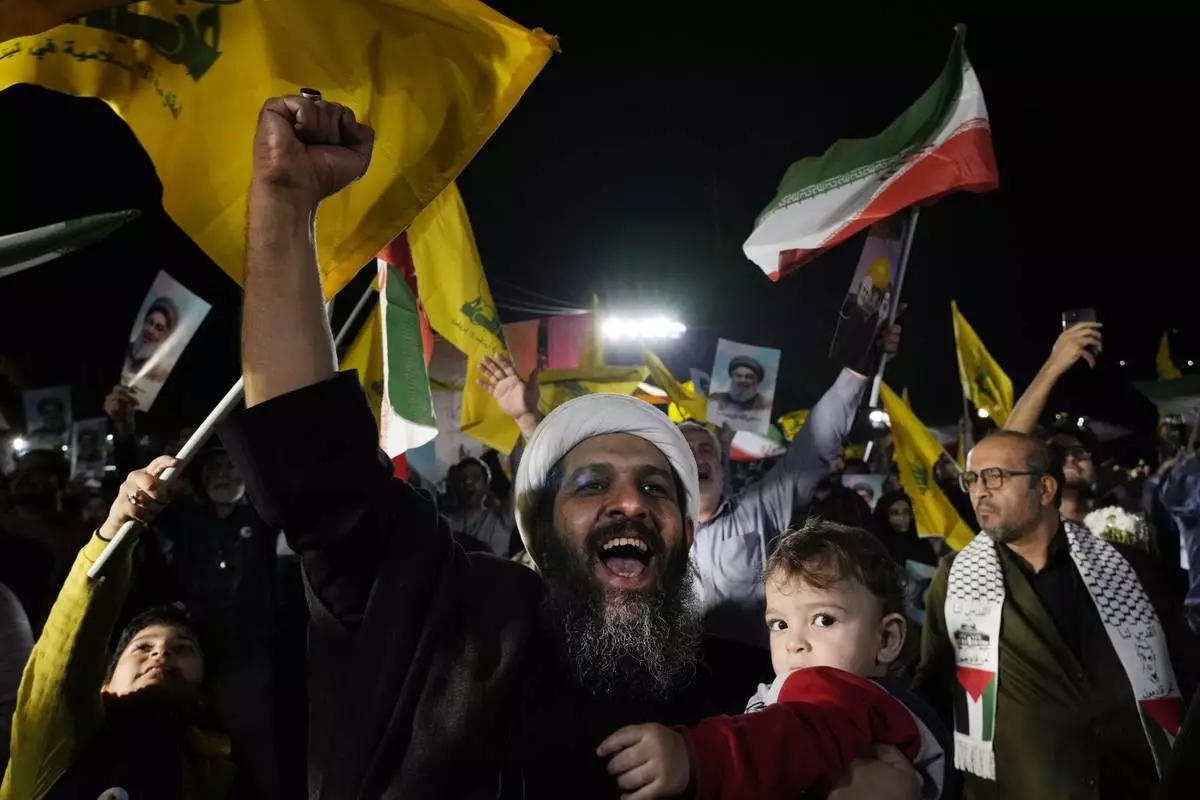
A cleric clenches his fist as he celebrates Iran's missile strike against Israel in an anti-Israeli gathering at Felestin (Palestine) Sq. in Tehran, Iran, Tuesday, Oct. 1, 2024. (AP Photo/Vahid Salemi)
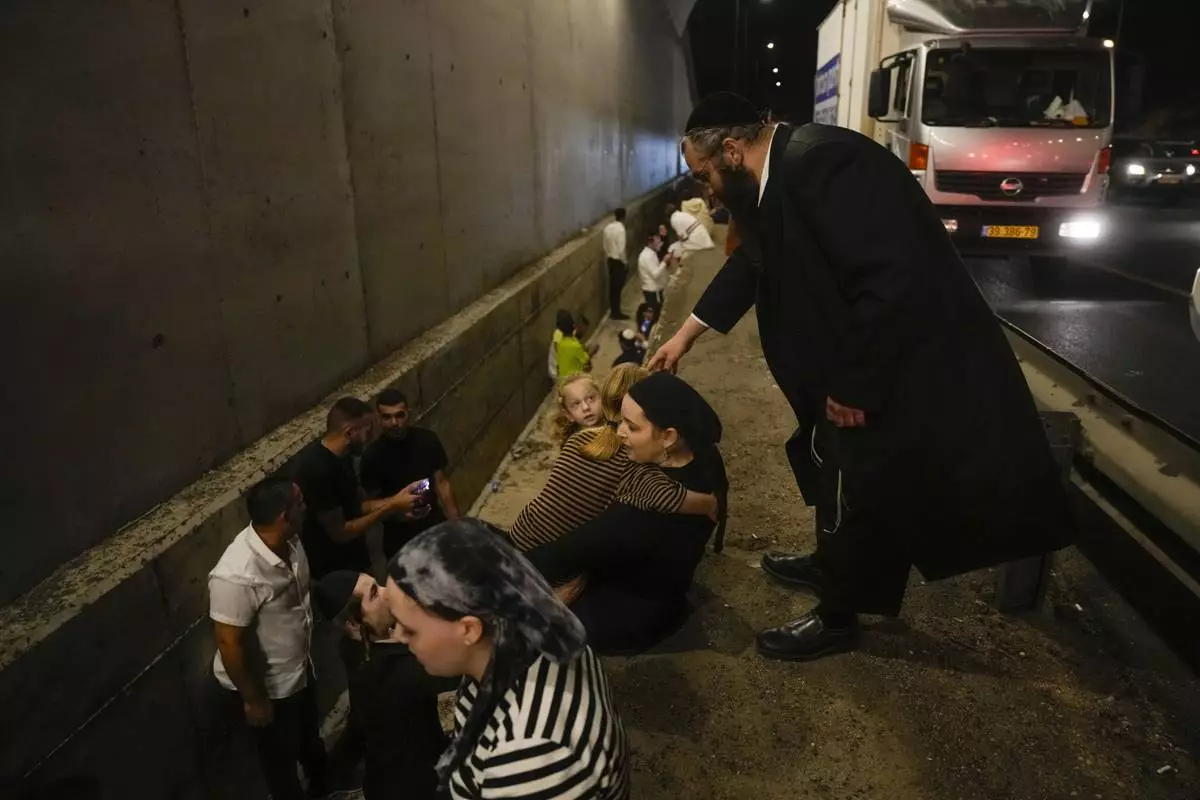
People take cover on the side of a road as a siren sounds a warning of incoming missiles fired from Iran on a freeway in Shoresh, between Jerusalem and Tel Aviv in Israel Tuesday, Oct. 1, 2024. (AP Photo/Ohad Zwigenberg)
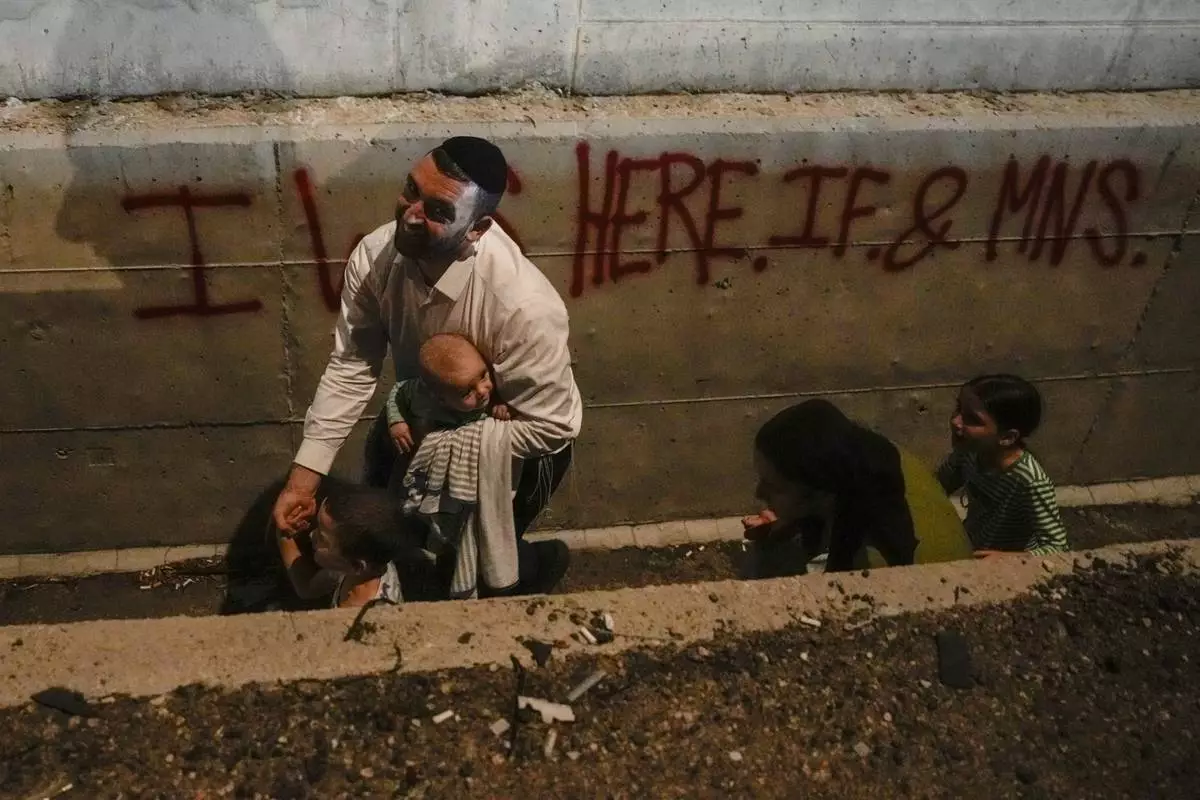
People take cover on the side of the road as a siren sounds a warning of incoming missiles fired from Iran on a freeway in Shoresh, between Jerusalem and Tel Aviv in Israel Tuesday, Oct. 1, 2024. (AP Photo/Ohad Zwigenberg)
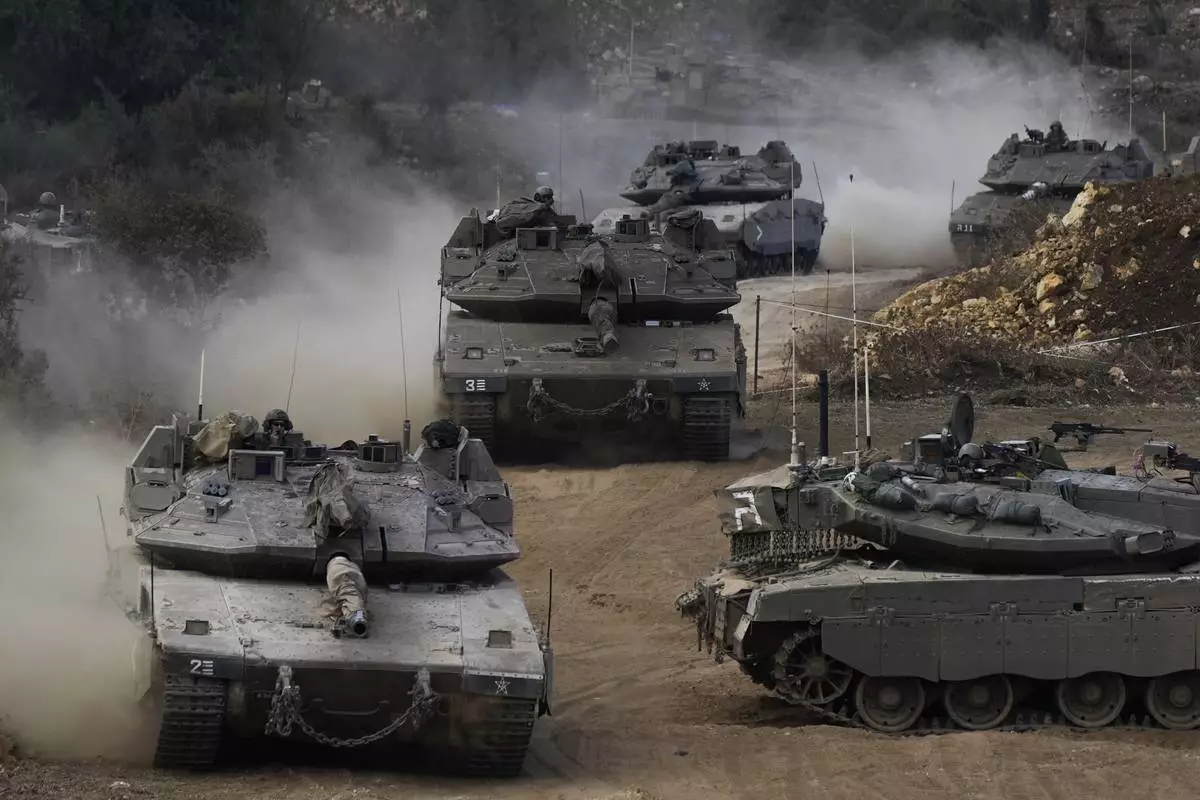
Israeli army tanks manoeuvre in a staging area in northern Israel near the Israel-Lebanon border, Tuesday, Oct. 1, 2024. (AP Photo/Baz Ratner)
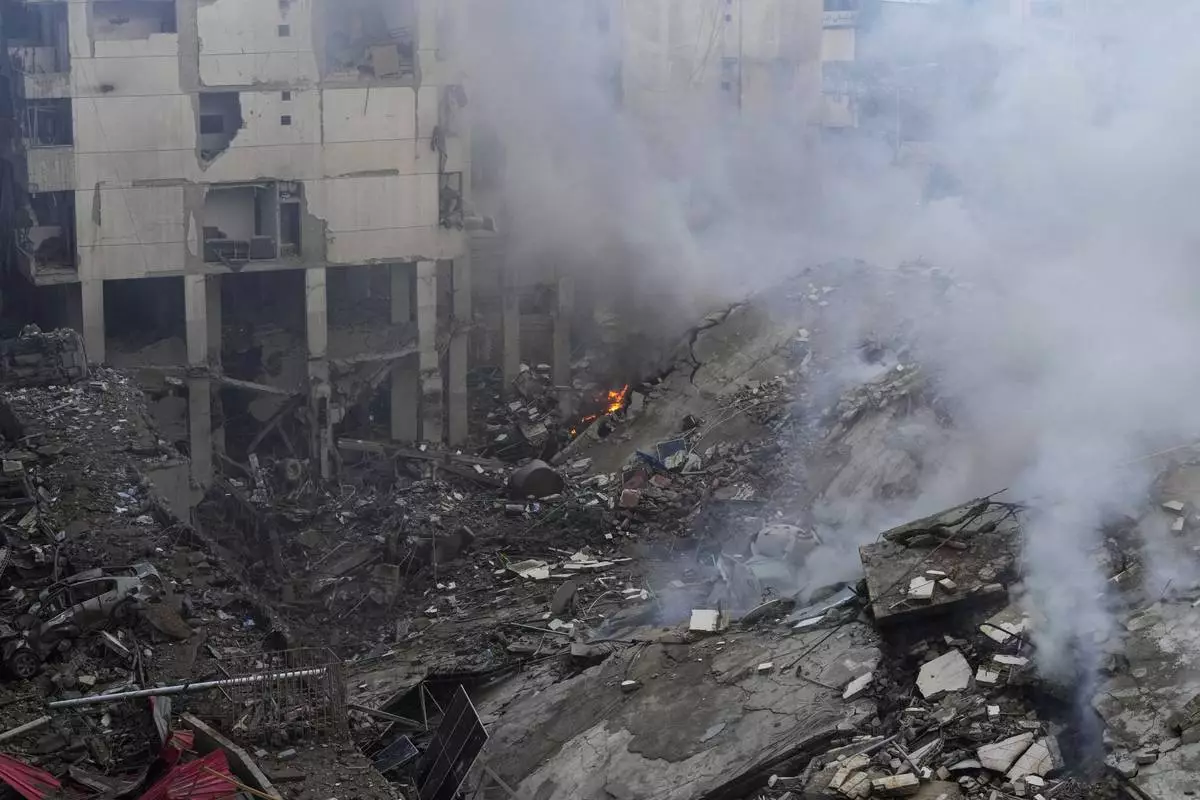
Smoke rises from the site of an Israeli airstrike in Beirut's southern suburb, Lebanon, Tuesday, Oct. 1, 2024. (AP Photo/Hassan Ammar)
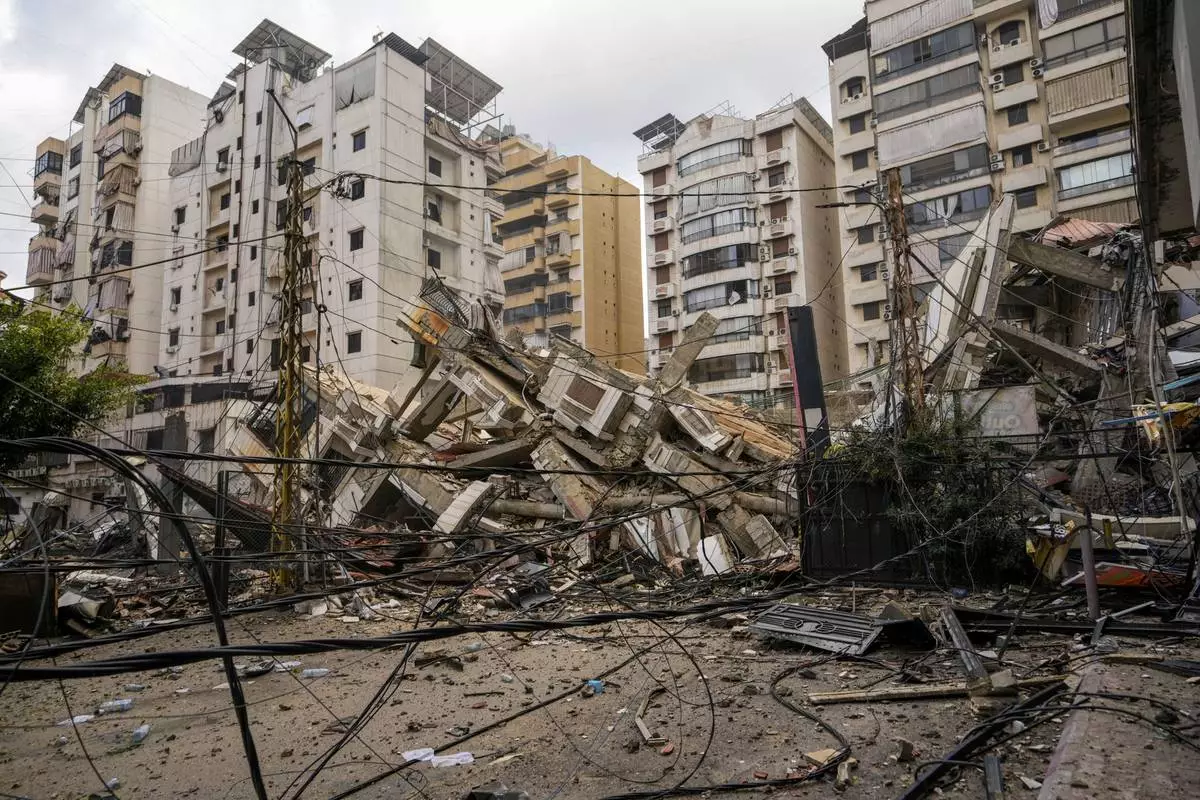
A damaged building is seen at the site of an Israeli airstrike in Beirut's southern suburb, Lebanon, Tuesday, Oct. 1, 2024. (AP Photo/Hassan Ammar)
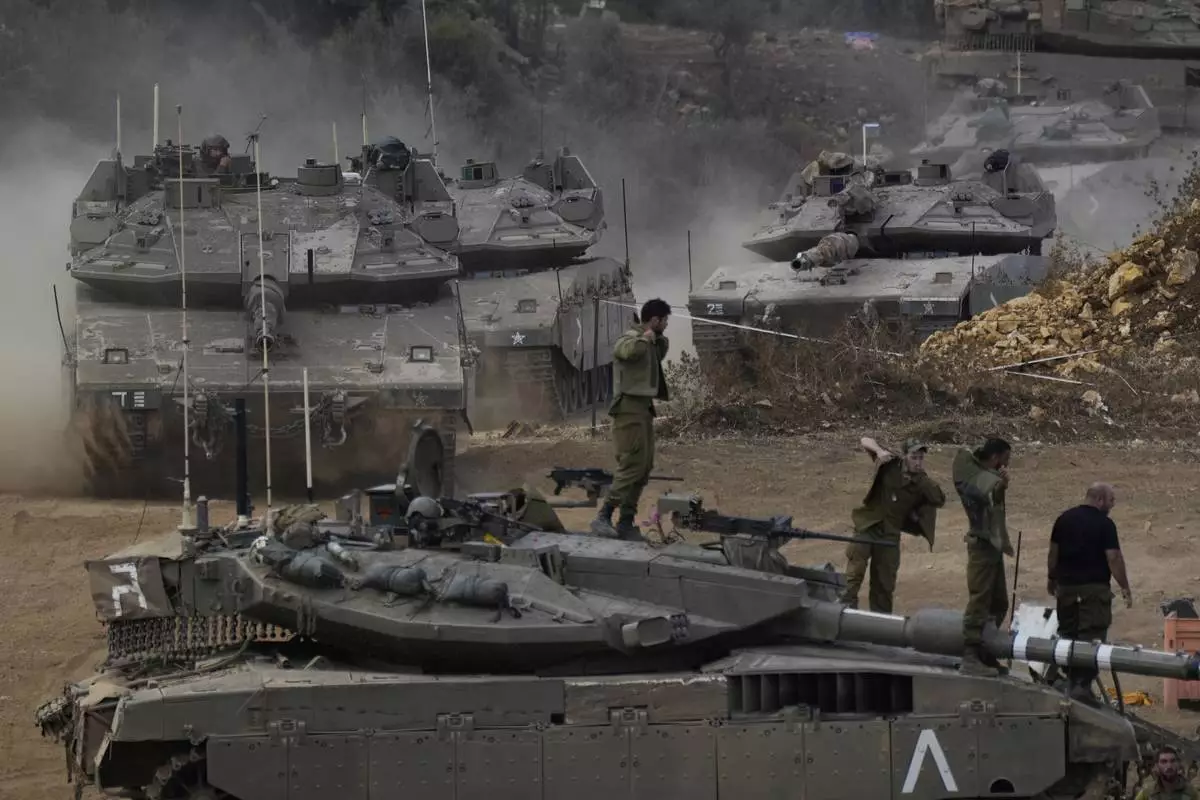
Israeli army tanks manoeuvre in a staging area in northern Israel near the Israel-Lebanon border, Tuesday, Oct. 1, 2024. (AP Photo/Baz Ratner)
MAGDEBURG, Germany (AP) — Germans on Saturday mourned both the victims and their shaken sense of security after a Saudi doctor intentionally drove into a Christmas market teeming with holiday shoppers, killing at least five people, including a small child, and injuring at least 200 others.
Authorities arrested a 50-year-old man at the site of the attack in Magdeburg on Friday evening and took him into custody for questioning. He has lived in Germany for nearly two decades, practicing medicine in Bernburg, about 40 kilometers (25 miles) south of Magdeburg. officials said.
The governor of the surrounding state of Saxony-Anhalt, Reiner Haseloff, told reporters that the death toll rose from two to five and that more than 200 people in total were injured.
Chancellor Olaf Scholz said that nearly 40 of them "are so seriously injured that we must be very worried about them.”
Several German media outlets identified the suspect as Taleb A., withholding his last name in line with privacy laws, and reported that he was a specialist in psychiatry and psychotherapy.
Mourners lit candles and placed flowers outside a church near the market on the cold and gloomy day. Several people stopped and cried. A Berlin church choir whose members witnessed a previous Christmas market attack in 2016 sang Amazing Grace, a hymn about God's mercy, offering their prayers and solidarity with the victims.
There were still no answers Saturday as to what caused him to drive into a crowd in the eastern German city of Magdeburg.
Describing himself as a former Muslim, the suspect shared dozens of tweets and retweets daily focusing on anti-Islam themes, criticizing the religion and congratulating Muslims who left the faith.
He also accused German authorities of failing to do enough to combat what he said was the “Islamism of Europe.” Some described him as an activist who helped Saudi women flee their homeland. He has also voiced support for the far-right and anti-immigrant Alternative for Germany (AfD) party.
Recently, he seemed focused on his theory that German authorities have been targeting Saudi asylum seekers.
Prominent German terrorism expert Peter Neumann said he had yet to come across a suspect in an act of mass violence with that profile.
“After 25 years in this ‘business’ you think nothing could surprise you anymore. But a 50-year-old Saudi ex-Muslim who lives in East Germany, loves the AfD and wants to punish Germany for its tolerance towards Islamists — that really wasn’t on my radar, " Neumann, the director of the International Centre for the Study of Radicalization and Political Violence at King’s College London, wrote on X.
“As things stand, he is a lone perpetrator, so that as far as we know there is no further danger to the city,” Saxony-Anhalt’s governor, Reiner Haseloff, told reporters. “Every human life that has fallen victim to this attack is a terrible tragedy and one human life too many.”
The violence shocked Germany and the city, bringing its mayor to the verge of tears and marring a festive event that’s part of a centuries-old German tradition. It prompted several other German towns to cancel their weekend Christmas markets as a precaution and out of solidarity with Magdeburg’s loss. Berlin kept its markets open but has increased its police presence at them.
Germany has suffered a string of extremist attacks in recent years, including a knife attack that killed three people and wounded eight at a festival in the western city of Solingen in August.
Magdeburg is a city of about 240,000 people, west of Berlin, that serves as Saxony-Anhalt’s capital. Friday’s attack came eight years after an Islamic extremist drove a truck into a crowded Christmas market in Berlin, killing 13 people and injuring many others. The attacker was killed days later in a shootout in Italy.
Chancellor Scholz and Interior Minister Nancy Faeser traveled to Magdeburg on Saturday, and a memorial service is to take place in the city cathedral in the evening. Faeser ordered flags lowered to half-staff at federal buildings across the country.
Verified bystander footage distributed by the German news agency dpa showed the suspect’s arrest at a tram stop in the middle of the road. A nearby police officer pointing a handgun at the man shouted at him as he lay prone, his head arched up slightly. Other officers swarmed around the suspect and took him into custody.
Thi Linh Chi Nguyen, a 34-year-old manicurist from Vietnam whose salon is located in a mall across from the Christmas market, was on the phone during a break when she heard loud bangs and thought at first they were fireworks. She then saw a car drive through the market at high speed. People screamed and a child was thrown into the air by the car.
Shaking as she described the horror of what she witnessed, she recalled seeing the car bursting out of the market and turning right onto Ernst-Reuter-Allee street and then coming to a standstill at the tram stop where the suspect was arrested.
The number of injured people was overwhelming.
“My husband and I helped them for two hours. He ran back home and grabbed as many blankets as he could find because they didn’t have enough to cover the injured people. And it was so cold," she said.
The market itself was still cordoned off Saturday with red-and-white tape and police vans every 50 meters (about 54 yards). Police with machine pistols guarded every entry to the market.
Some thermal security blankets still lay on the street.
Christmas markets are a German holiday tradition cherished since the Middle Ages, now successfully exported to much of the Western world.
Saudi Arabia’s foreign ministry condemned the attack on X.
Aboubakr reported from Cairo and Gera from Warsaw, Poland.
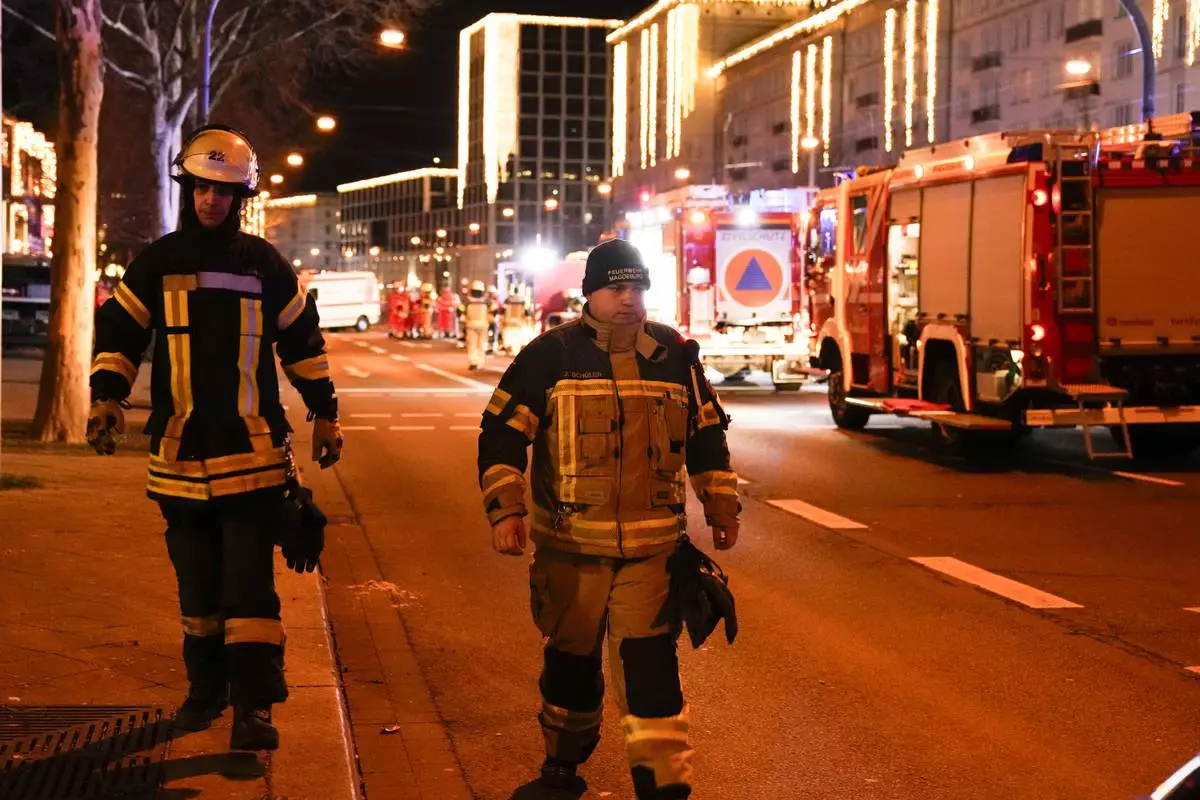
Two firefighters walk through a cordoned-off area near a Christmas Market, after a car drove into a crowd in Magdeburg, Germany, Saturday, Dec. 21, 2024. (AP Photo/Ebrahim Noroozi)
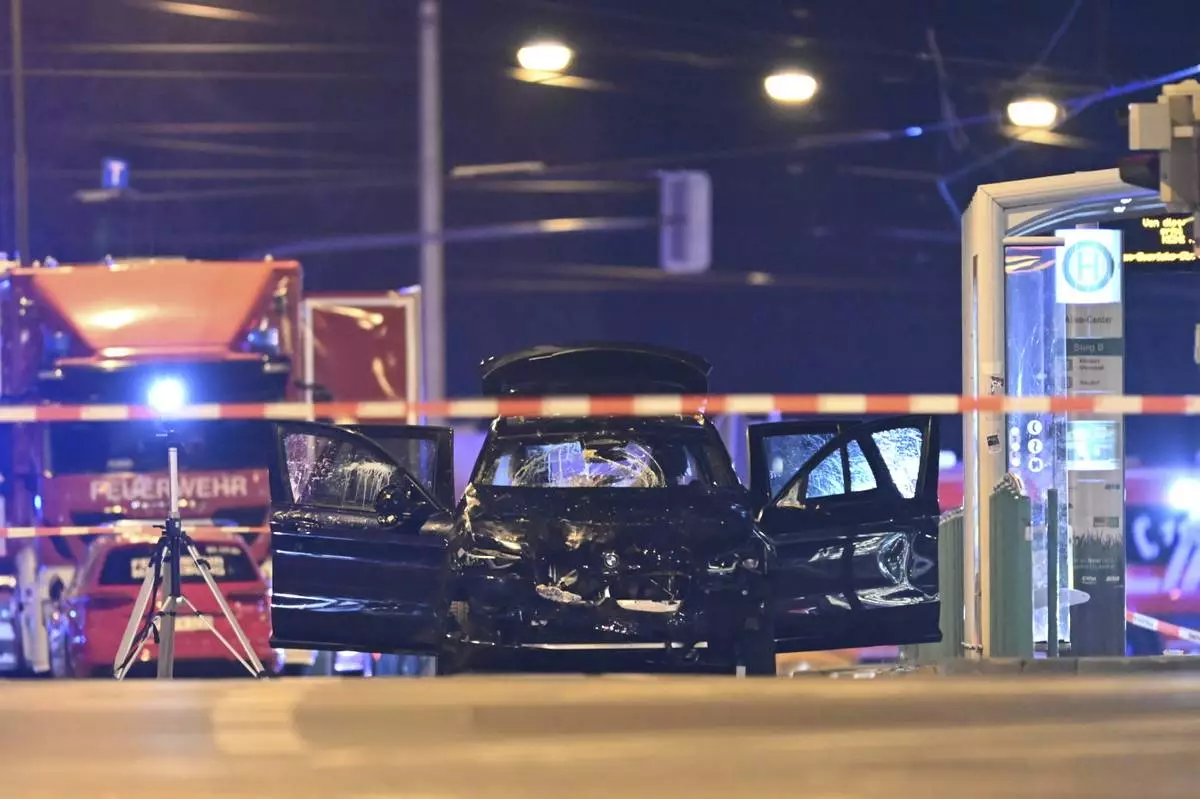
A damaged car sits with its doors open after a driver plowed into a busy Christmas market in Magdeburg, Germany, early Saturday, Dec. 21, 2024. (Hendrik Schmidt/dpa via AP)
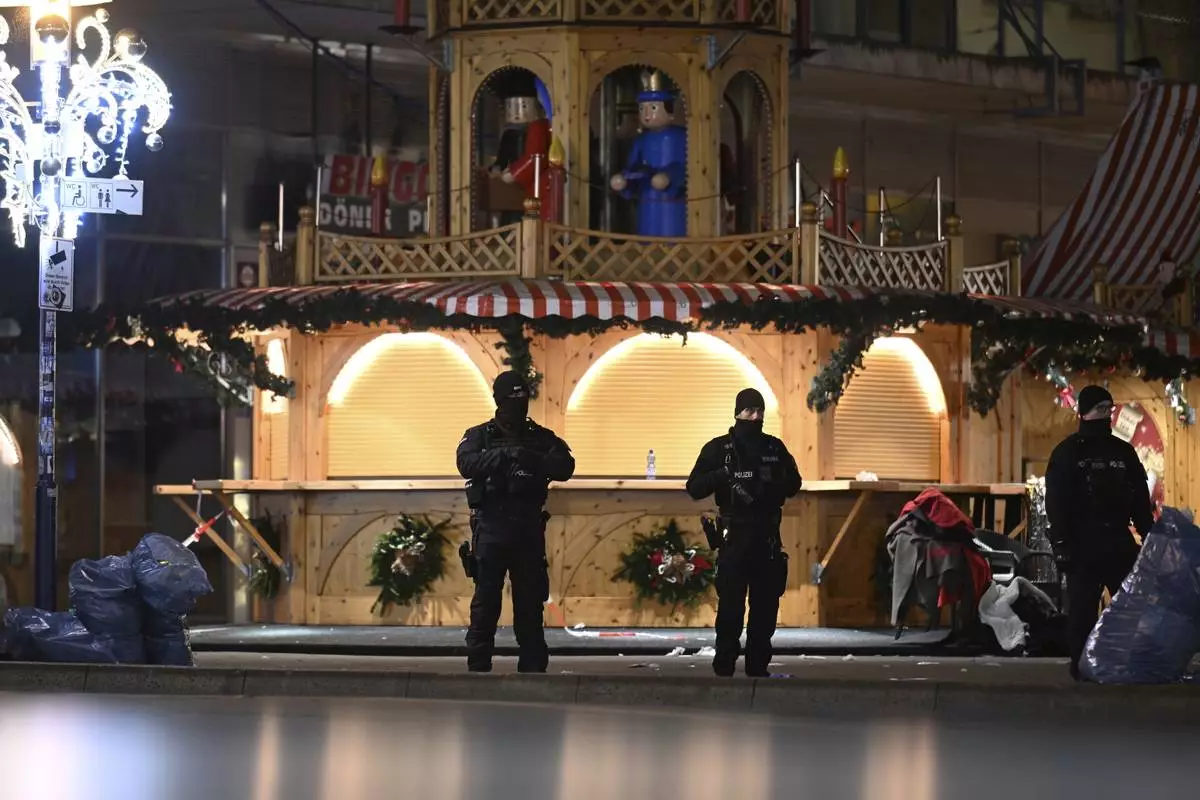
Police stand at a Christmas market in Magdeburg, Germany, early Saturday, Dec. 21, 2024, after a driver plowed into a group of people at the market late Friday. (Hendrik Schmidt/dpa via AP)

Police stand at a Christmas market in Magdeburg, Germany, early Saturday, Dec. 21, 2024, after a driver plowed into a group of people at the market late Friday. (Hendrik Schmidt/dpa via AP)
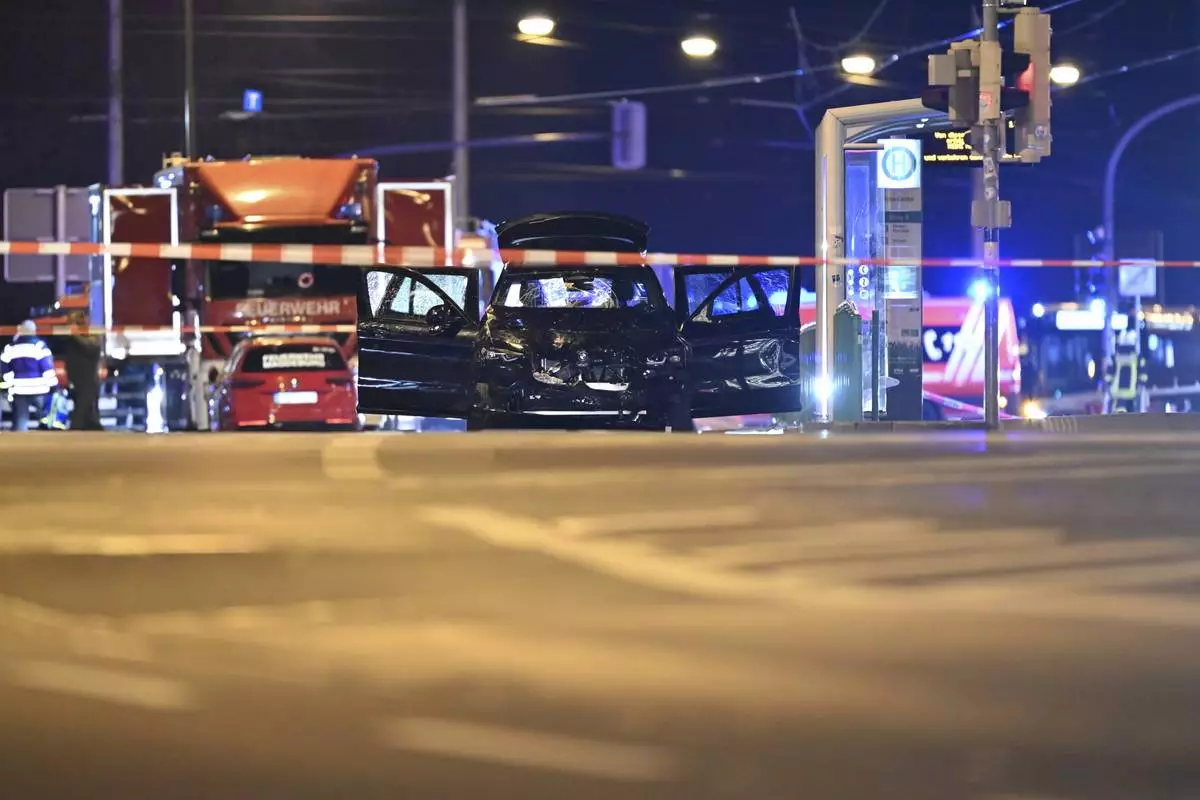
A damaged car sits with its doors open after a driver plowed into a busy Christmas market in Magdeburg, Germany, early Saturday, Dec. 21, 2024. (Hendrik Schmidt/dpa via AP)
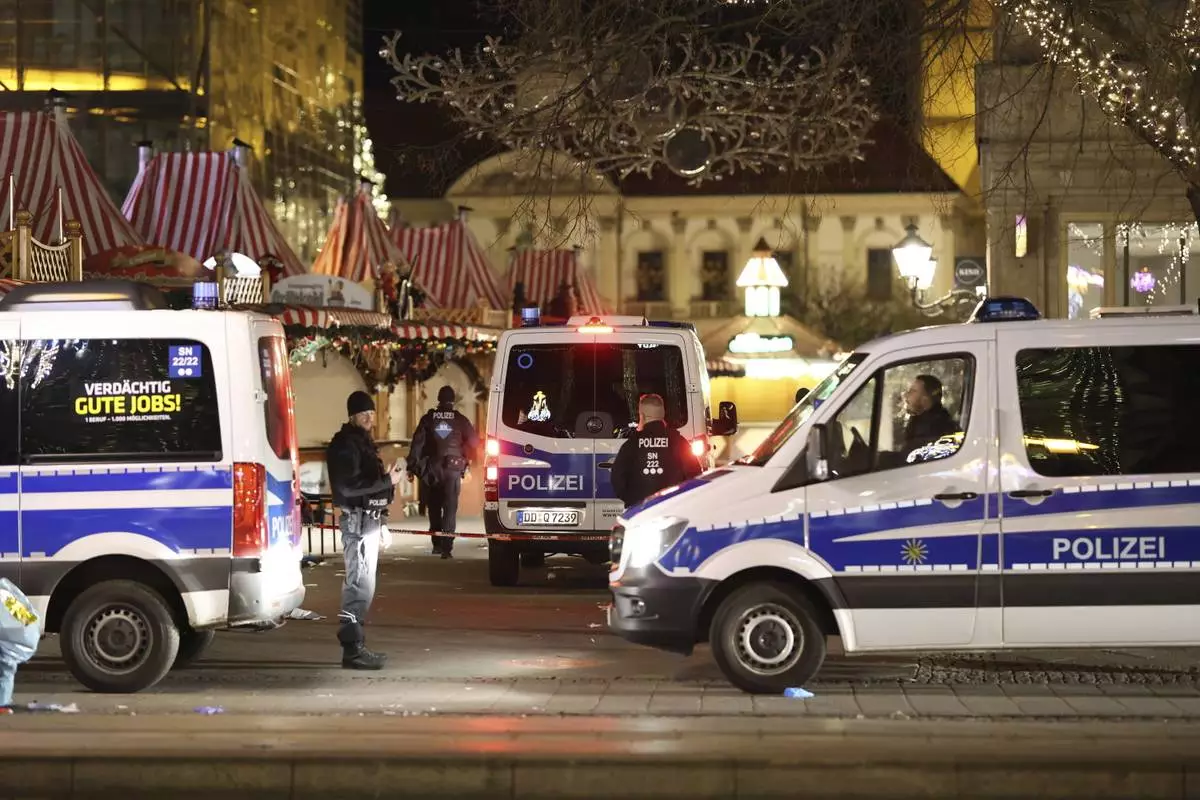
Police officers and police emergency vehicles are seen at the Christmas market in Magdeburg after a driver plowed into a busy Christmas market in Magdeburg, Germany, Saturday, Dec. 21, 2024. (Matthias Bein/dpa via AP)
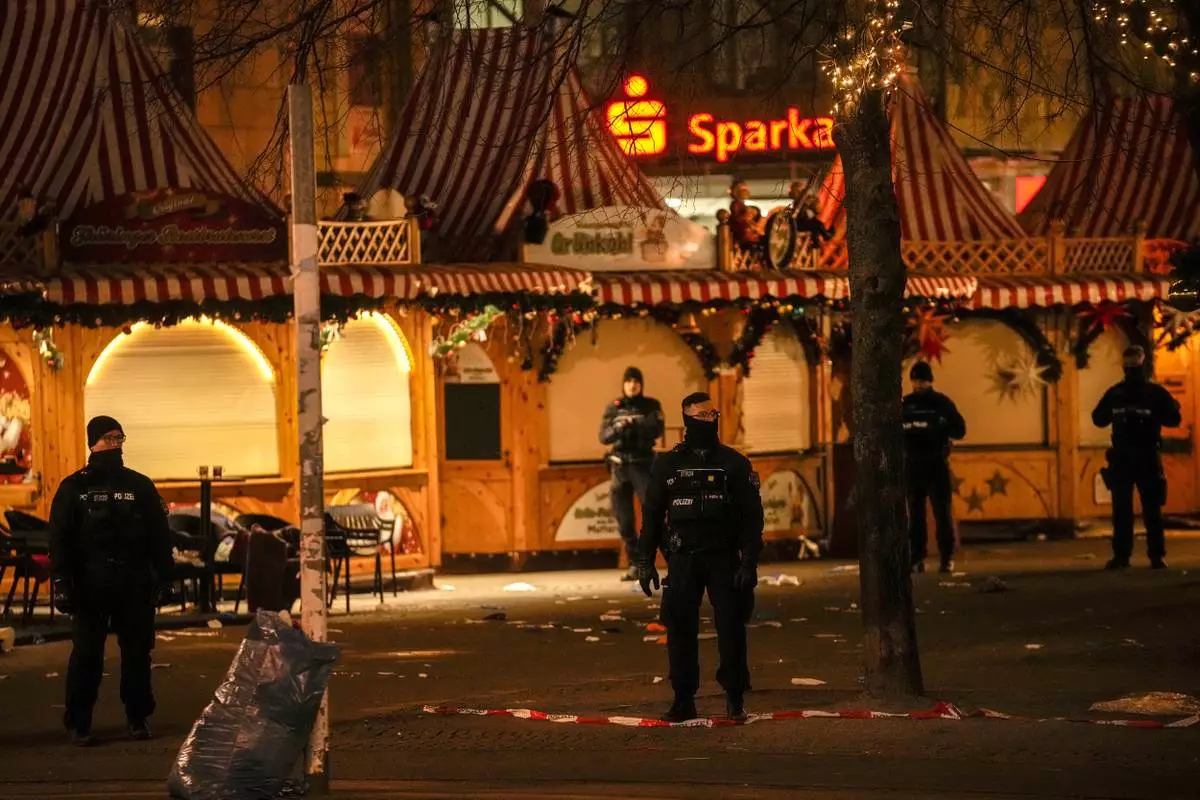
Security guards stand in front of a cordoned-off Christmas Market after a car crashed into a crowd of people, in Magdeburg, Germany, Saturday early morning, Dec. 21, 2024. (AP Photo/Ebrahim Noroozi)
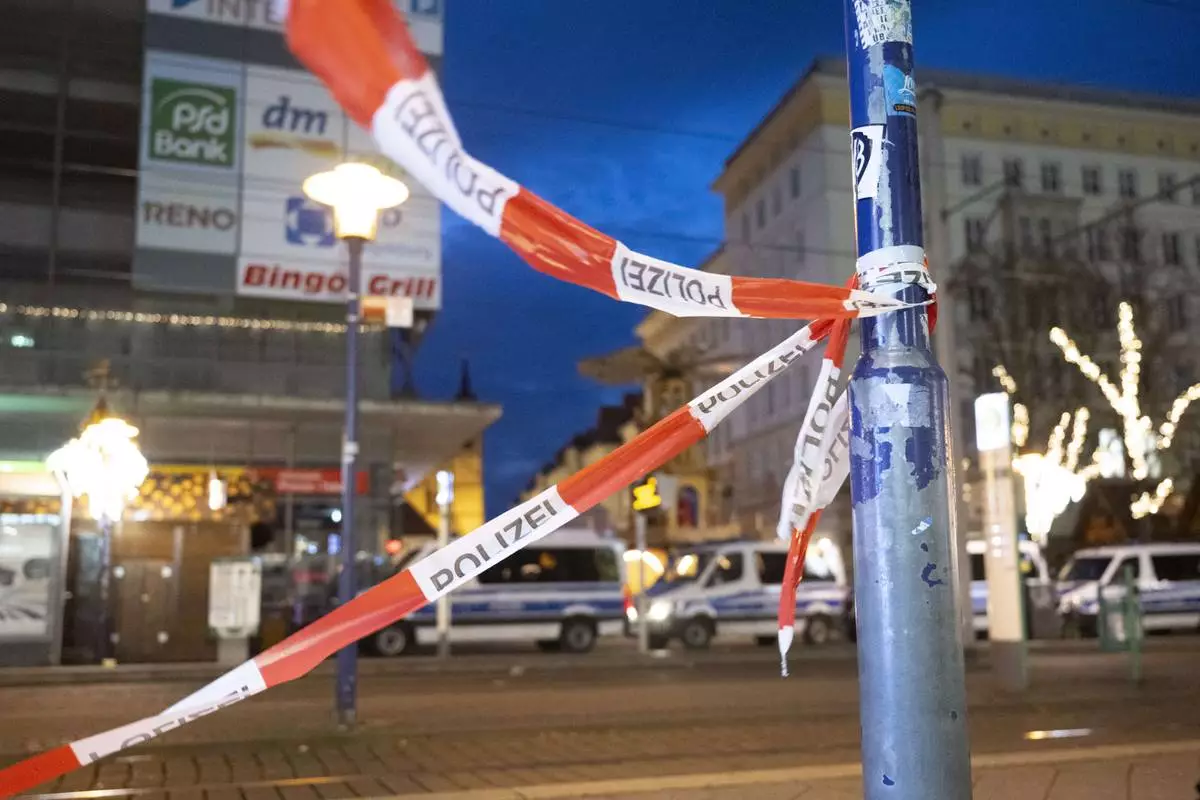
A barrier tape and police vehicles are seen in front of the entrance to the Christmas market in Magdeburg after a driver plowed into a busy Christmas market in Magdeburg, Germany, Saturday, Dec. 21, 2024. (Sebastian Kahnert/dpa via AP)
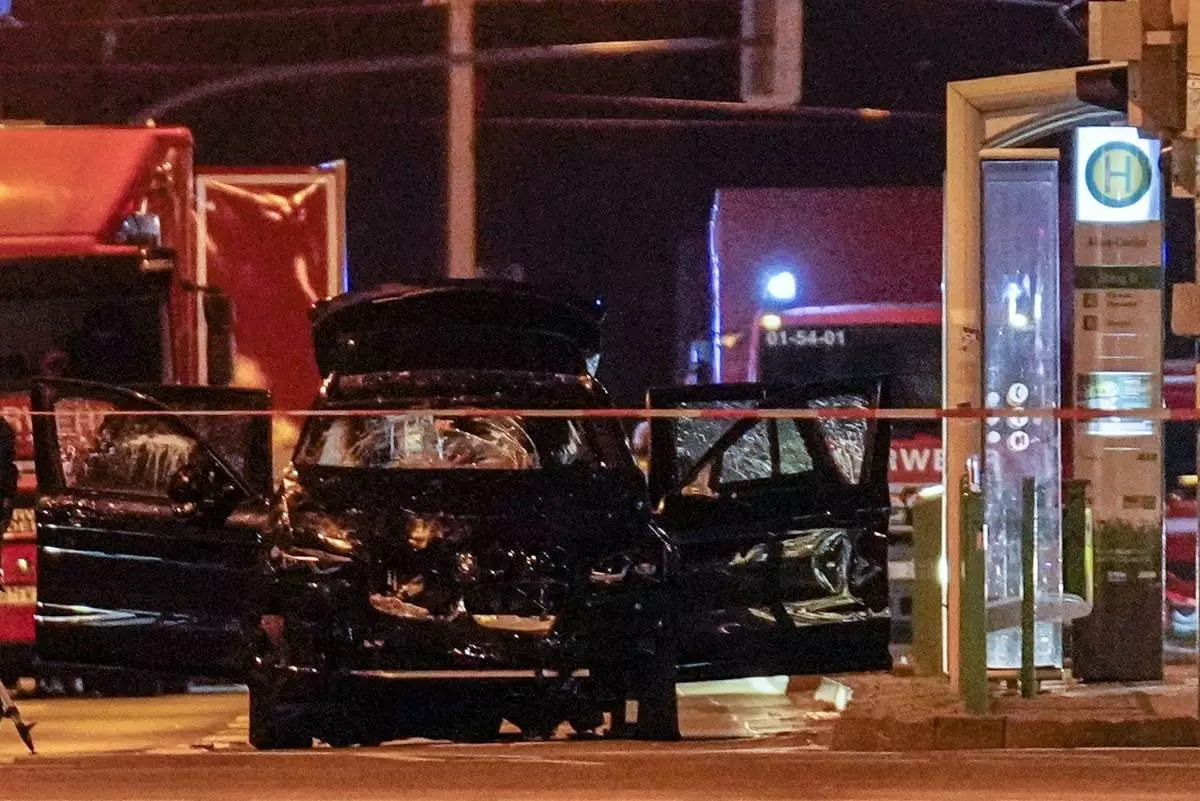
The car that was crashed into a crowd of people at the Magdeburg Christmas market is seen following the attack in Magdeburg, Germany, Saturday early morning, Dec. 21, 2024. (AP Photo/Ebrahim Noroozi)
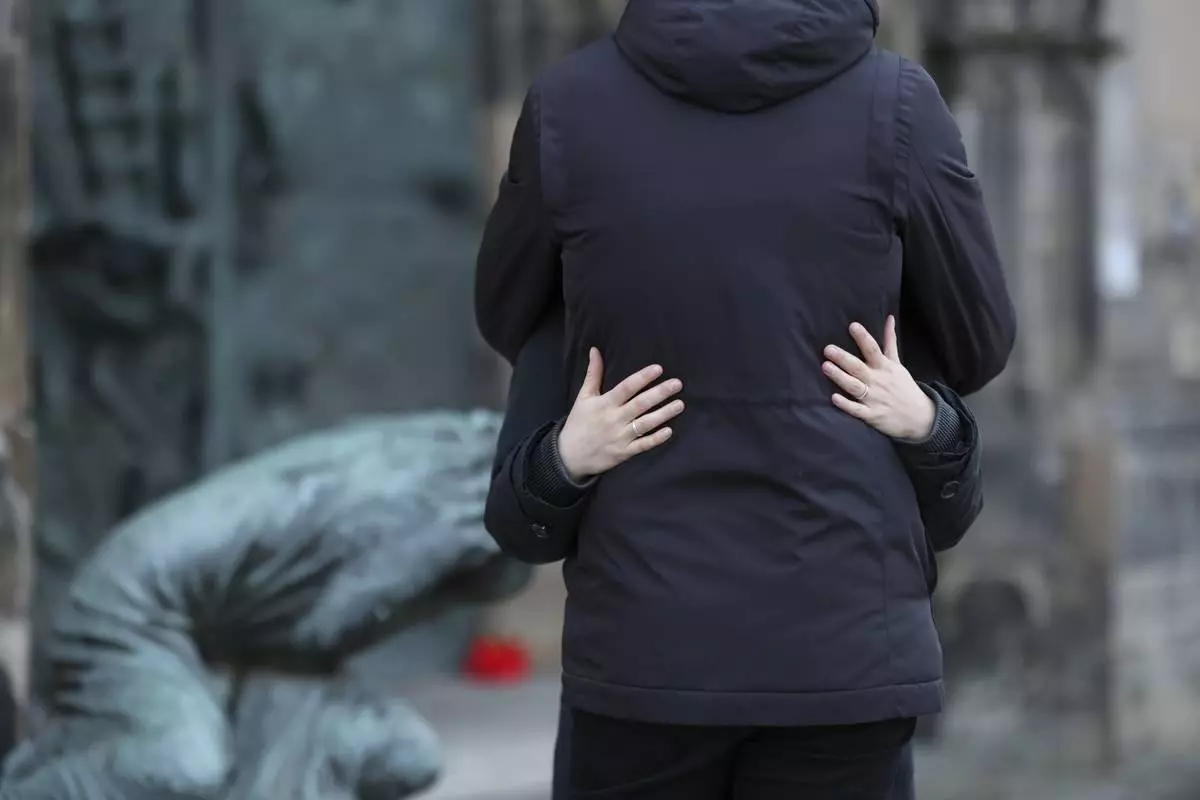
People mourn in front of St. John's Church for the victims of Friday's attack at the Christmas market in Magdeburg, Germany, Saturday, Dec. 21, 2024. (Matthias Bein/dpa via AP)
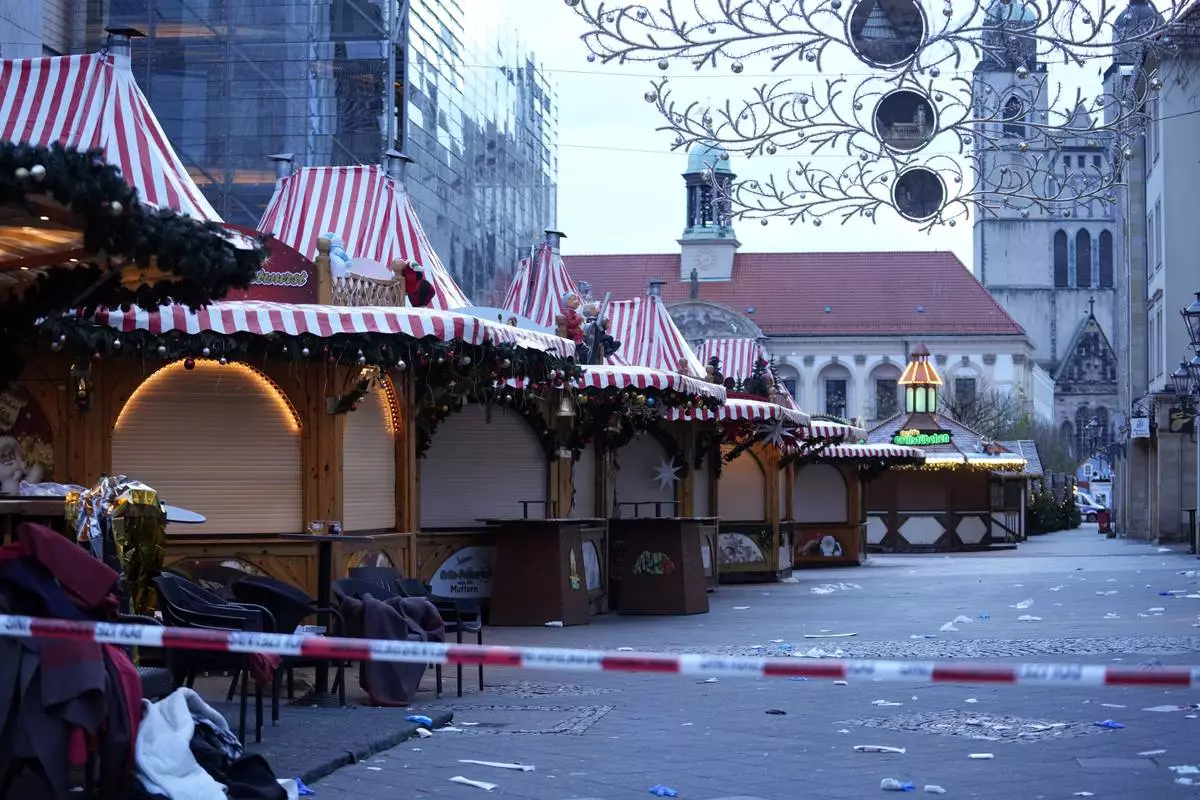
Police tape cordons-off a Christmas Market, where a car drove into a crowd on Friday evening, in Magdeburg, Germany, Saturday, Dec. 21, 2024. (AP Photo/Ebrahim Noroozi)
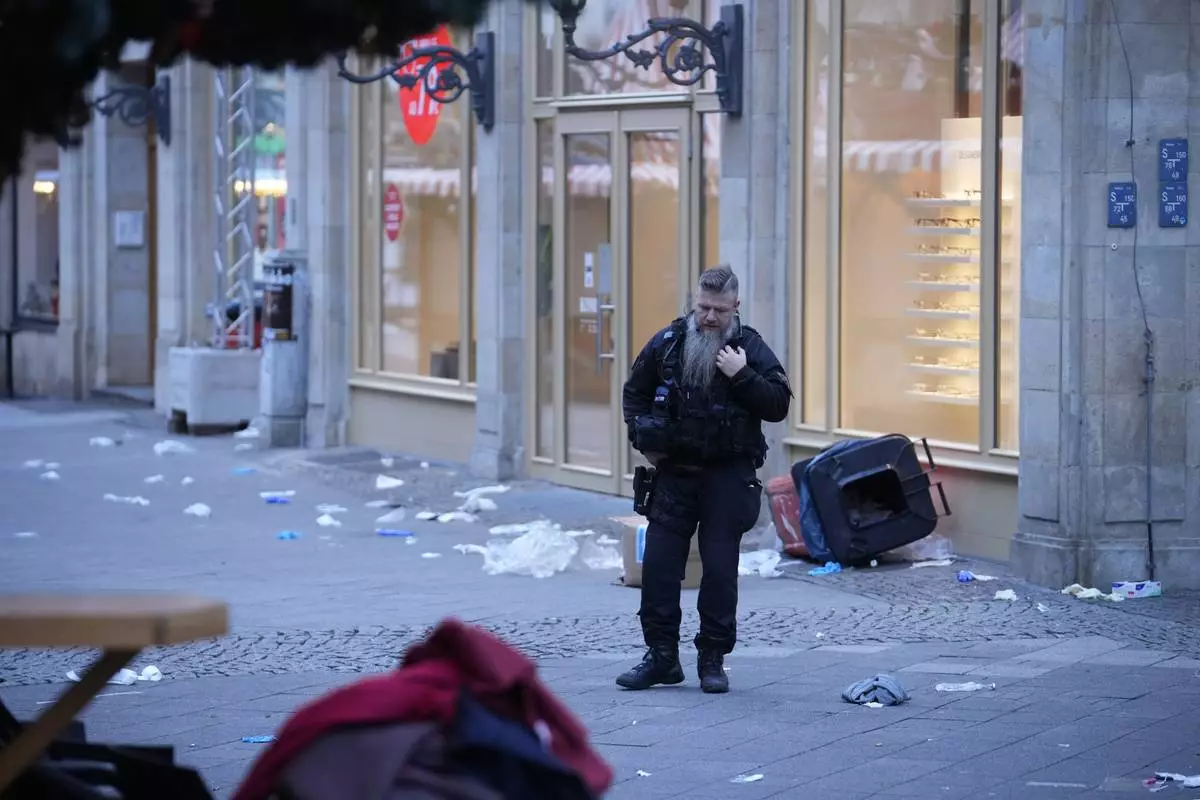
A police officer stands guard at at a cordoned-off area near a Christmas Market, where a car drove into a crowd on Friday evening, in Magdeburg, Germany, Saturday, Dec. 21, 2024. (AP Photo/Ebrahim Noroozi)
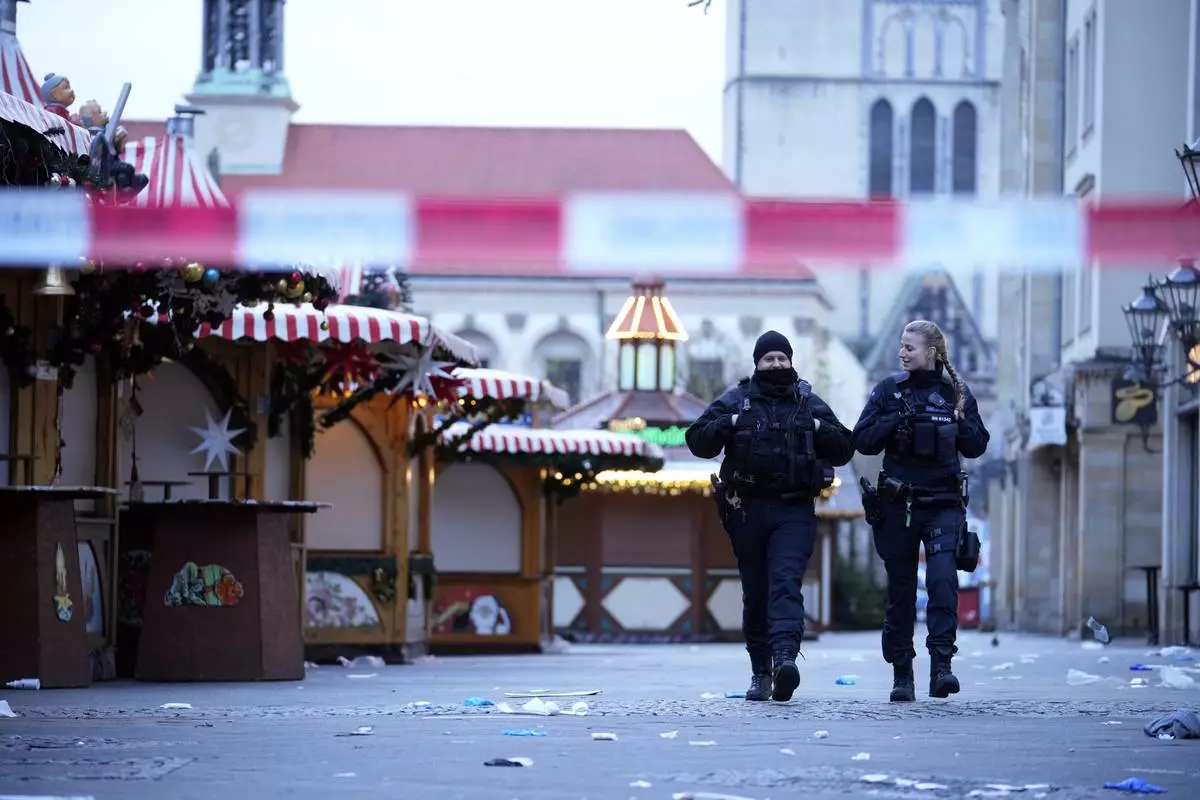
Police officers patrol a cordoned-off area at a Christmas Market, where a car drove into a crowd on Friday evening, in Magdeburg, Germany, Saturday, Dec. 21, 2024. (AP Photo/Ebrahim Noroozi)
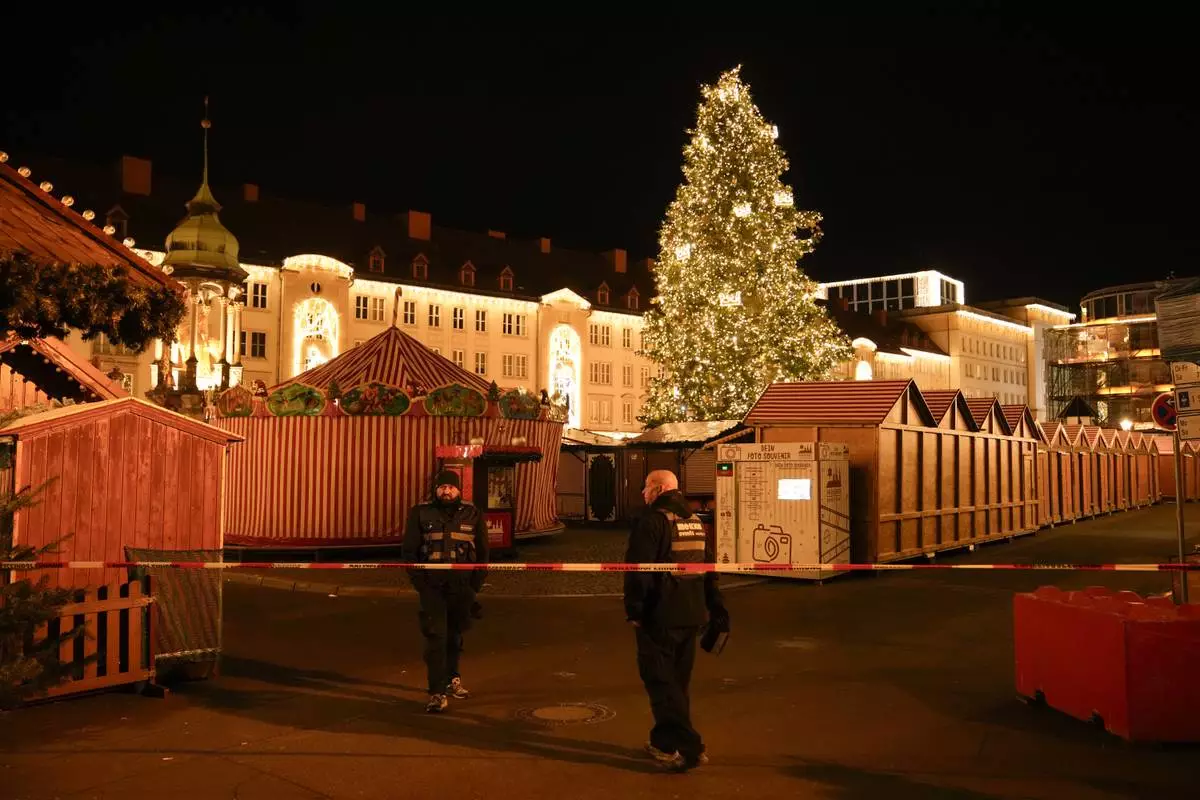
Security guards stand in front of a cordoned-off Christmas Market after a car crashed into a crowd of people, in Magdeburg, Germany, Saturday, Dec. 21, 2024. (AP Photo/Ebrahim Noroozi)
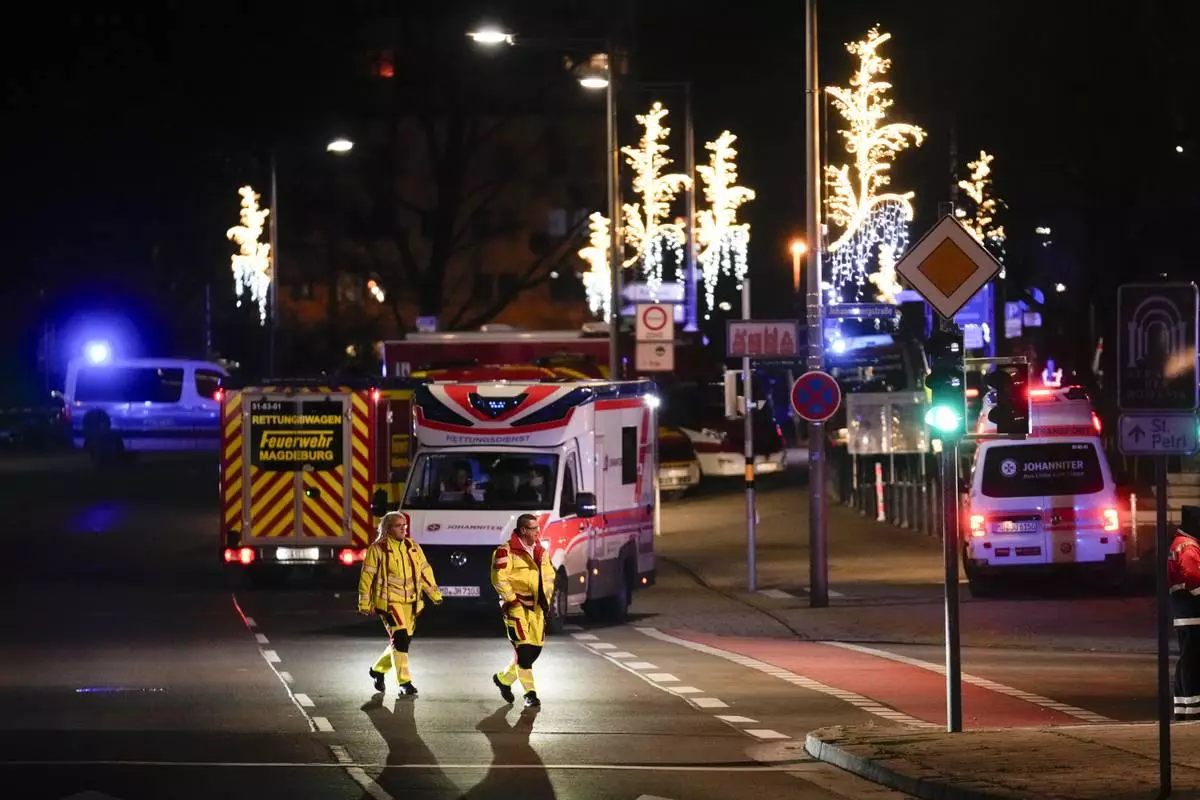
Emergency services work in a cordoned-off area near a Christmas Market, after a car drove into a crowd in Magdeburg, Germany, Saturday, Dec. 21, 2024. (AP Photo/Ebrahim Noroozi)
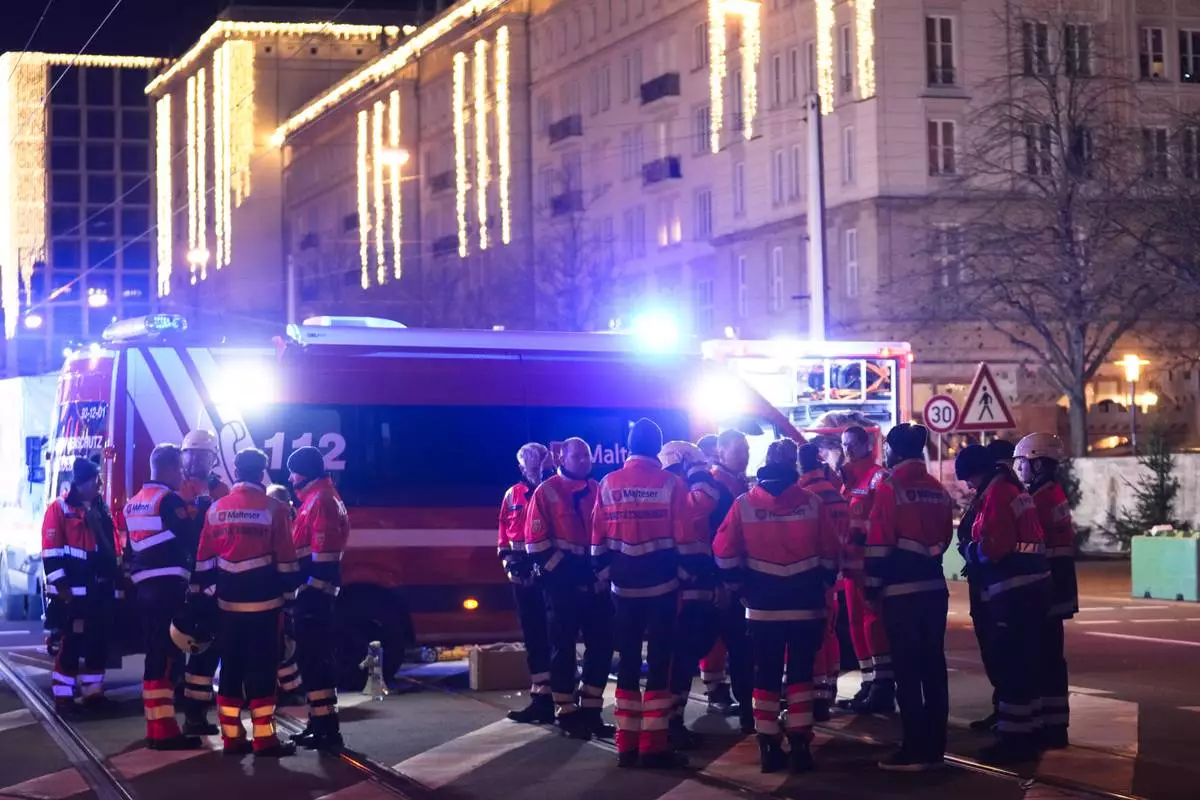
Emergency services work in a cordoned-off area near a Christmas Market, after a car drove into a crowd in Magdeburg, Germany, Friday, Dec. 20, 2024. (AP Photo/Ebrahim Noroozi)
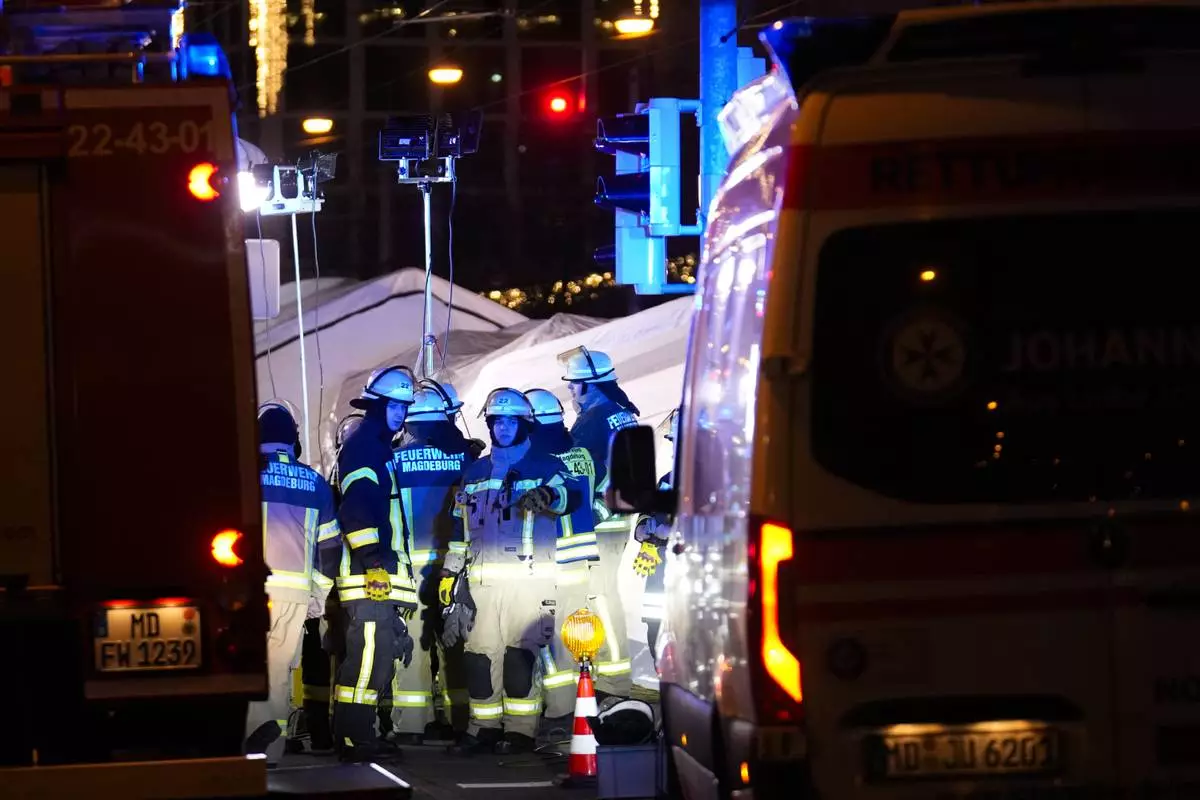
Emergency services work in a cordoned-off area near a Christmas Market, after a car drove into a crowd in Magdeburg, Germany, Friday, Dec. 20, 2024. (AP Photo/Ebrahim Noroozi)

Reiner Haseloff, Minister President of Saxony-Anhalt, center, is flanked by Tamara Zieschang, Minister of the Interior and Sport of Saxony-Anhalt, left, and Simone Borris, Mayor of the City of Magdeburg, at a press conference after a car plowed into a busy outdoor Christmas market in Magdeburg, Germany Friday, Dec. 20, 2024. (Hendrik Schmidt/dpa via AP)
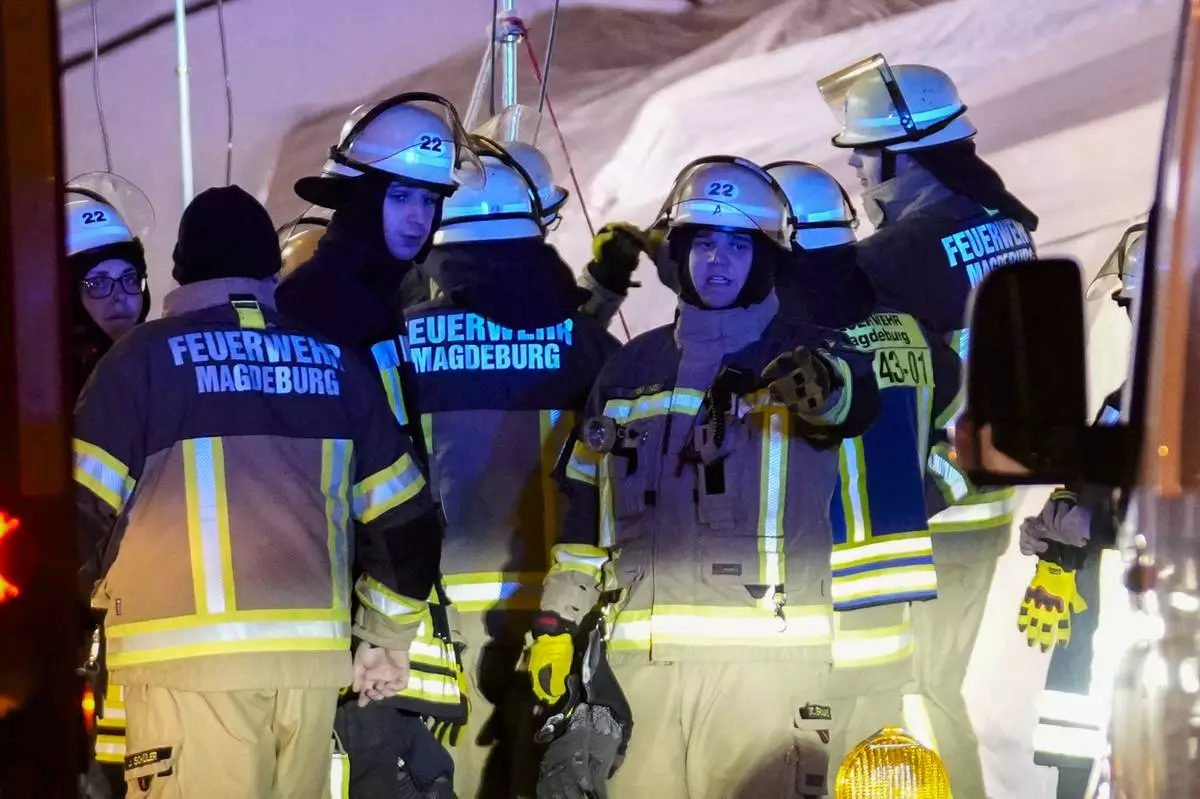
Emergency services work in a cordoned-off area near a Christmas Market, after a car drove into a crowd in Magdeburg, Germany, Friday, Dec. 20, 2024. (AP Photo/Ebrahim Noroozi)

Emergency services work in a cordoned-off area near a Christmas Market, after a car drove into a crowd in Magdeburg, Germany, Friday, Dec. 20, 2024. (AP Photo/Ebrahim Noroozi)
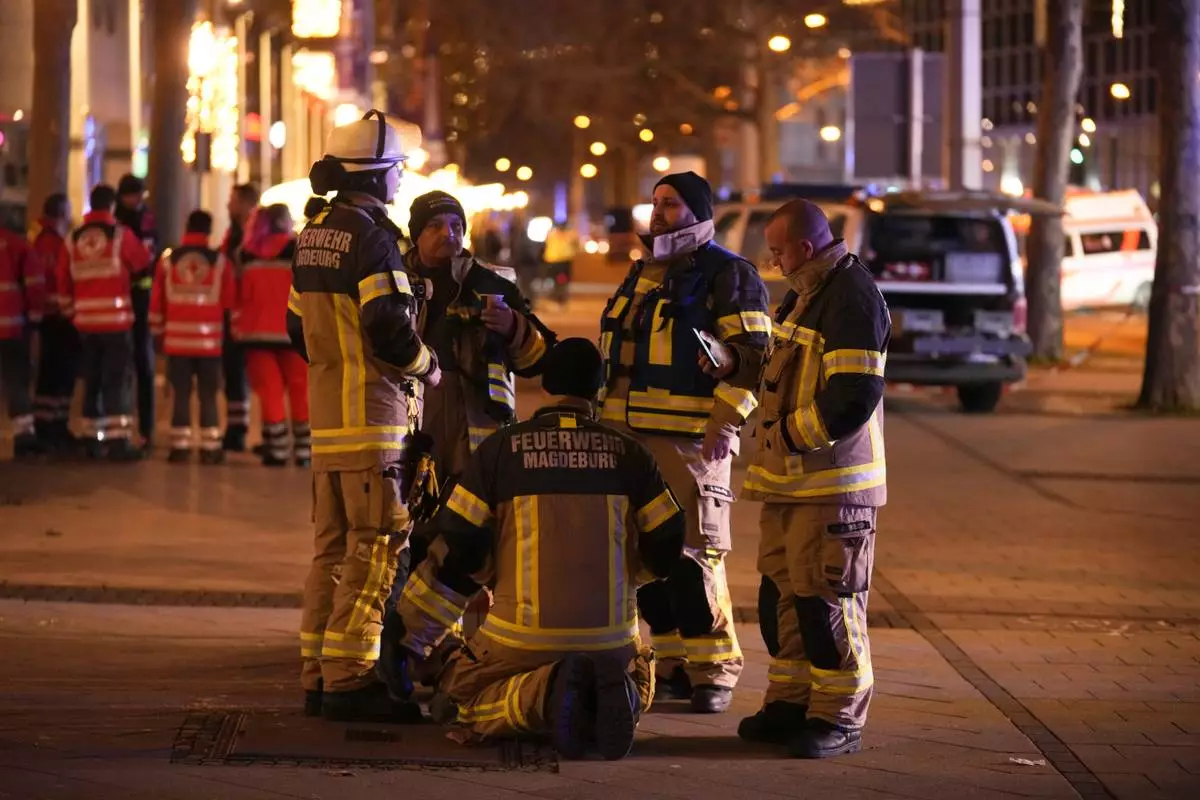
Emergency services work in a cordoned-off area near a Christmas Market, after a car drove into a crowd in Magdeburg, Germany, Friday, Dec. 20, 2024. (AP Photo/Ebrahim Noroozi)

A police officer guards at a blocked road near a Christmas Market, after an incident in Magdeburg, Germany, Friday, Dec. 20, 2024. (AP Photo/Ebrahim Noroozi)
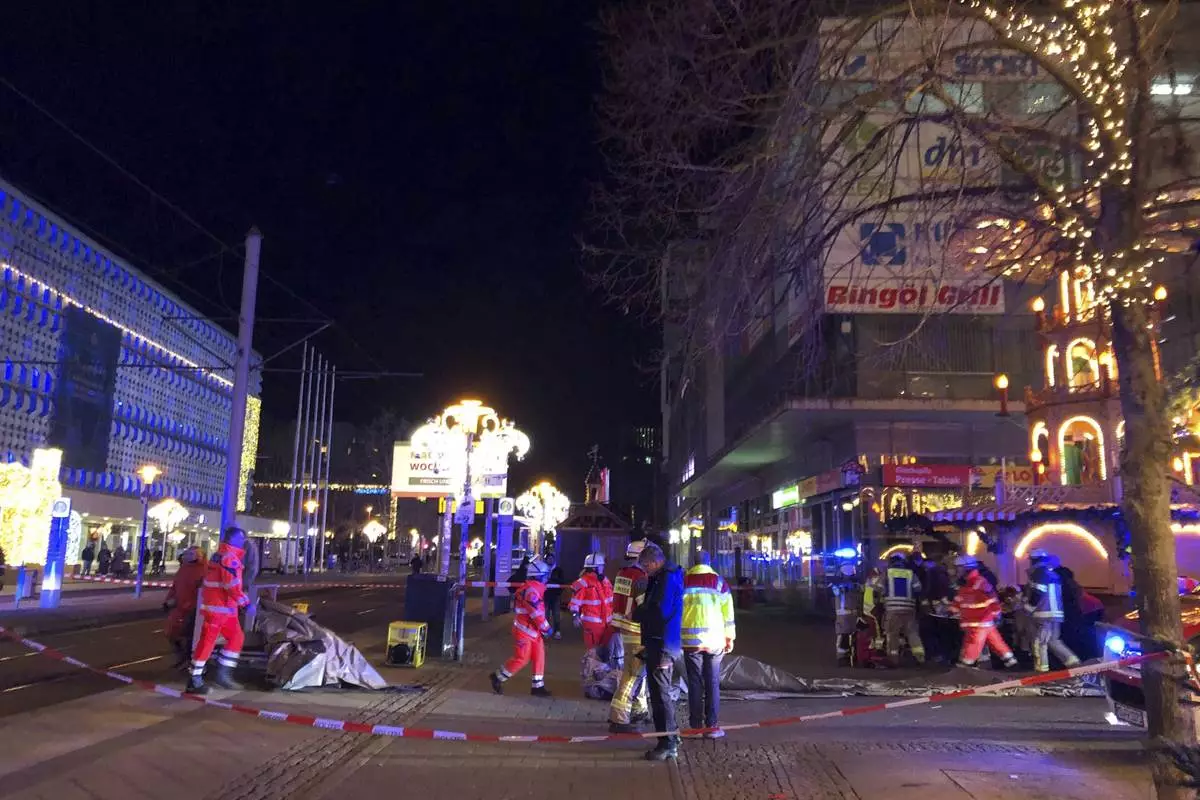
Emergency services attend an incident at the Christmas market in Magdeburg, Germany, Friday Dec. 20, 2024. (Dörthe Hein/dpa via AP)
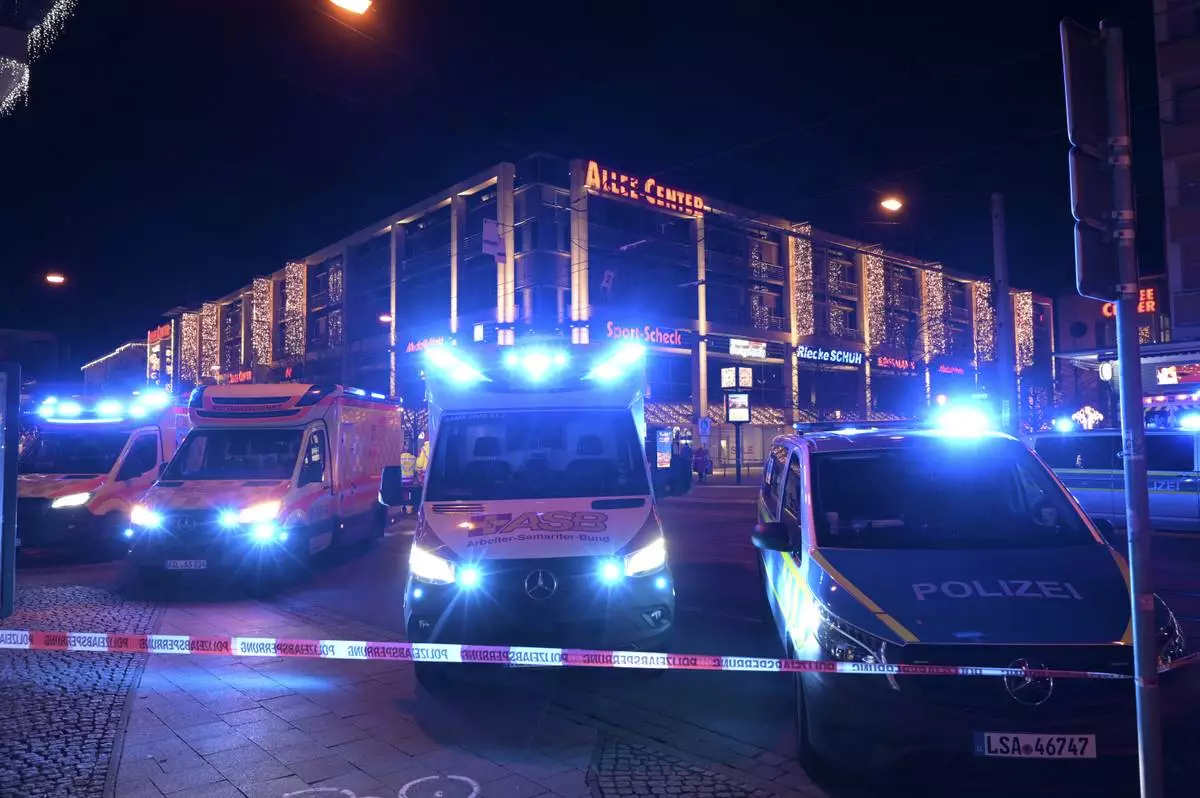
Emergency services attend an incident at the Christmas market in Magdeburg, Germany, Friday Dec. 20, 2024. (Heiko Rebsch/dpa via AP)
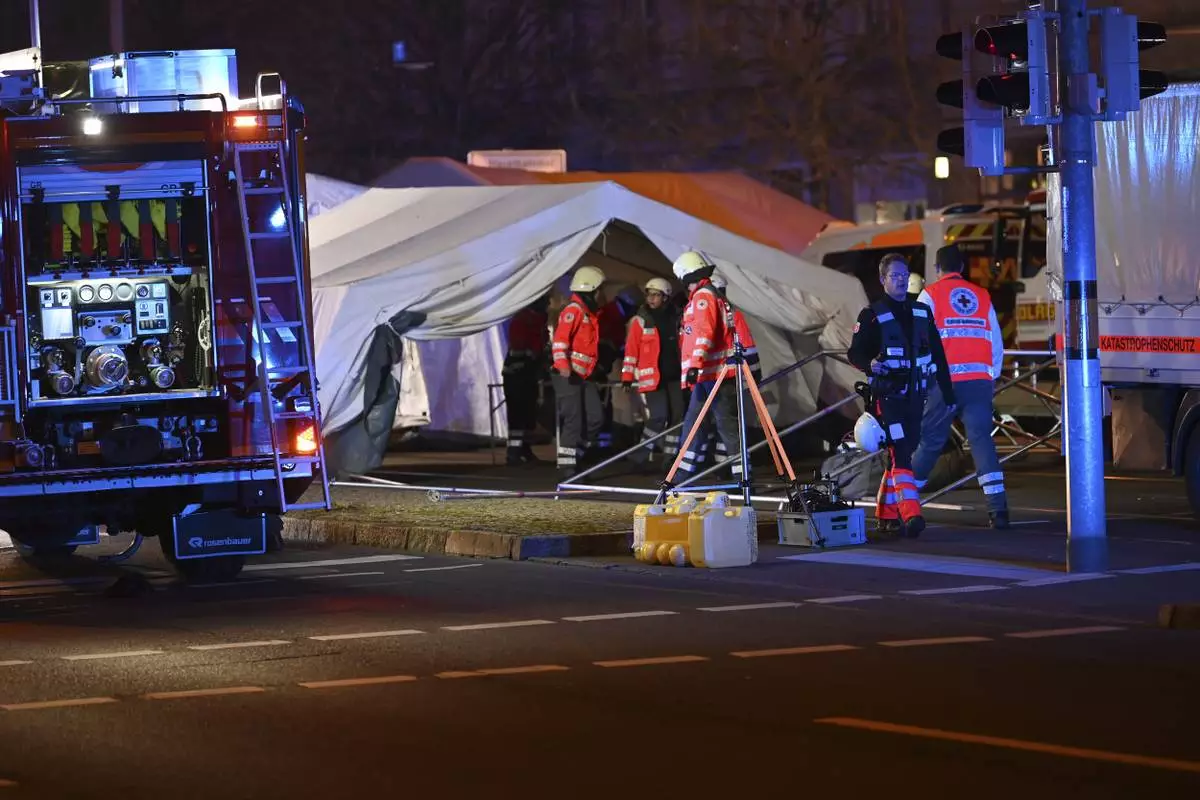
Emergency services attend an incident at the Christmas market in Magdeburg, Germany, Friday Dec. 20, 2024. (Heiko Rebsch/dpa via AP)

A police officer guards at a cordoned-off area near a Christmas Market after an incident in Magdeburg, Germany, Friday, Dec. 20, 2024. (AP Photo/Ebrahim Noroozi)
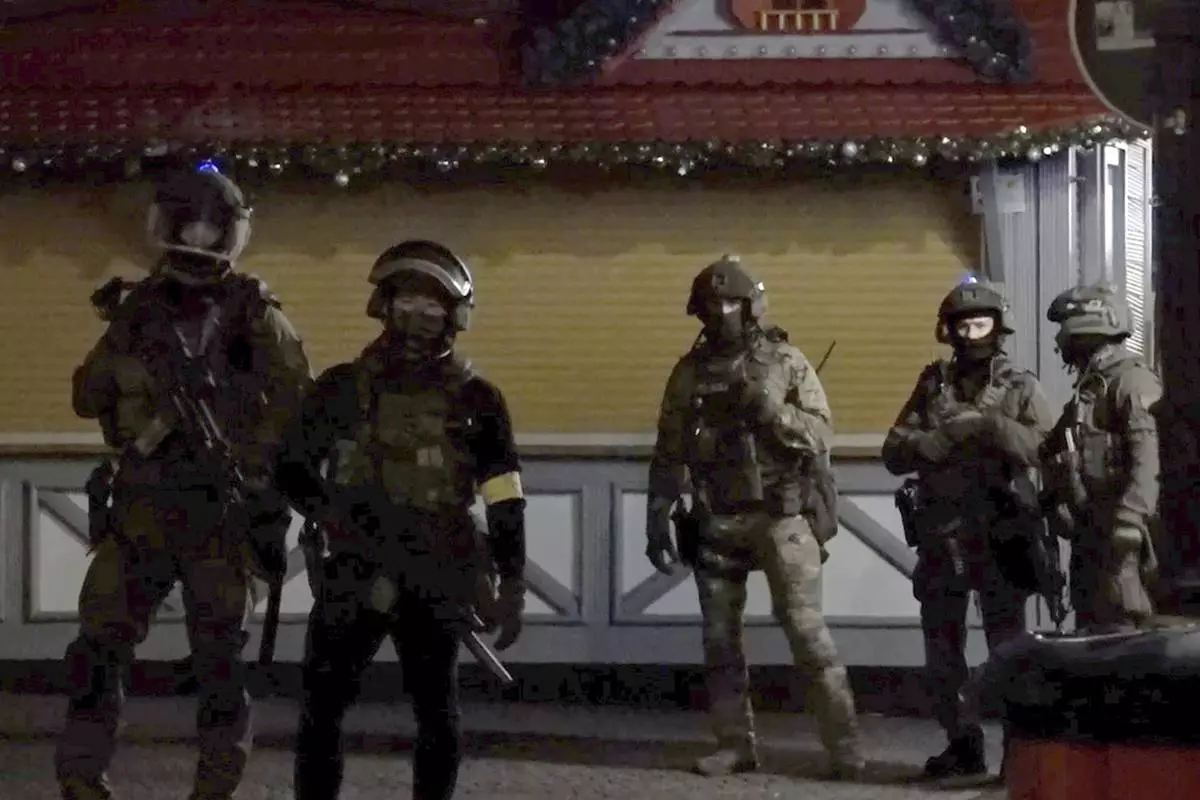
In this screen grab image from video, special police forces attend an incident at the Christmas market in Magdeburg, Germany, Friday Dec. 20, 2024. (Thomas Schulz/dpa via AP)

Reiner Haseloff (M, CDU), Minister President of Saxony-Anhalt, makes a statement after an incident at the Christmas market in Magdeburg, Germany, Friday Dec. 20, 2024. (Heiko Rebsch/dpa via AP)

A police officer speaks with a man at a cordoned-off area near a Christmas Market after an incident in Magdeburg, Germany, Friday, Dec. 20, 2024. (AP Photo/Ebrahim Noroozi)
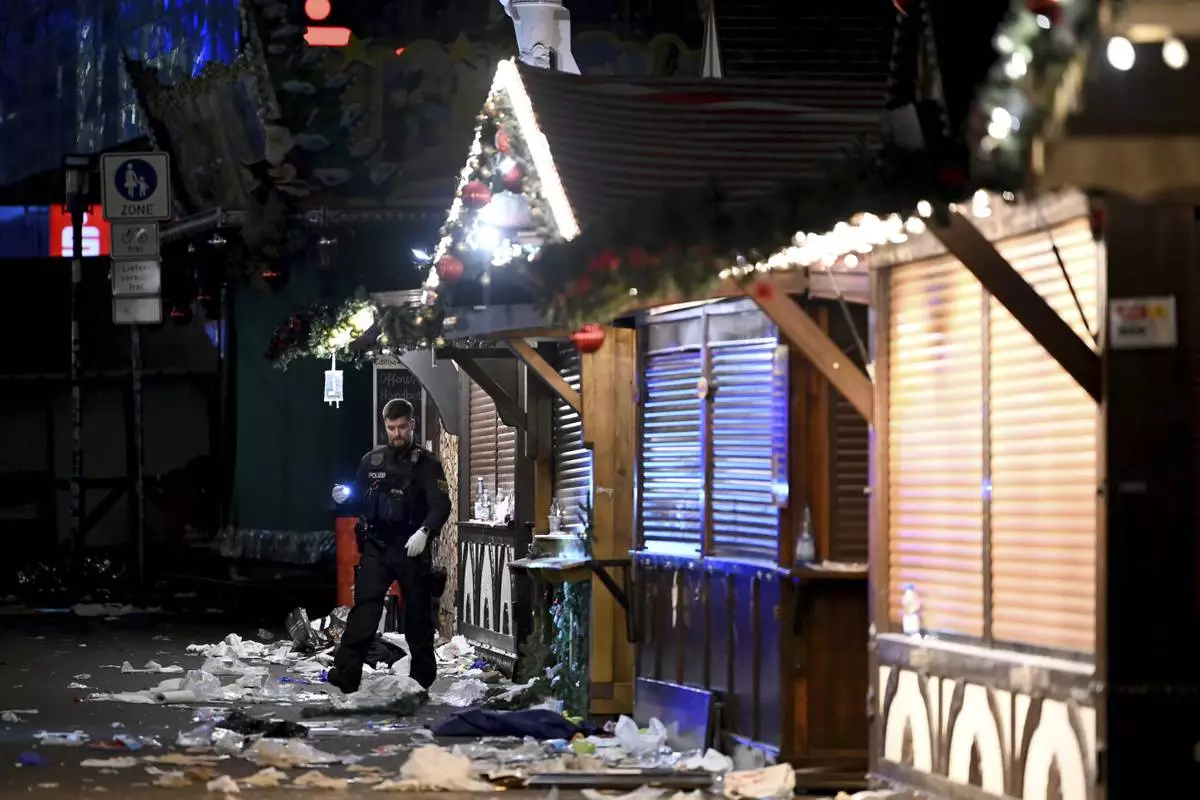
A policeman is seen at the Christmas market where an incident happened in Magdeburg, Germany, Friday Dec. 20, 2024. (Heiko Rebsch/dpa via AP)
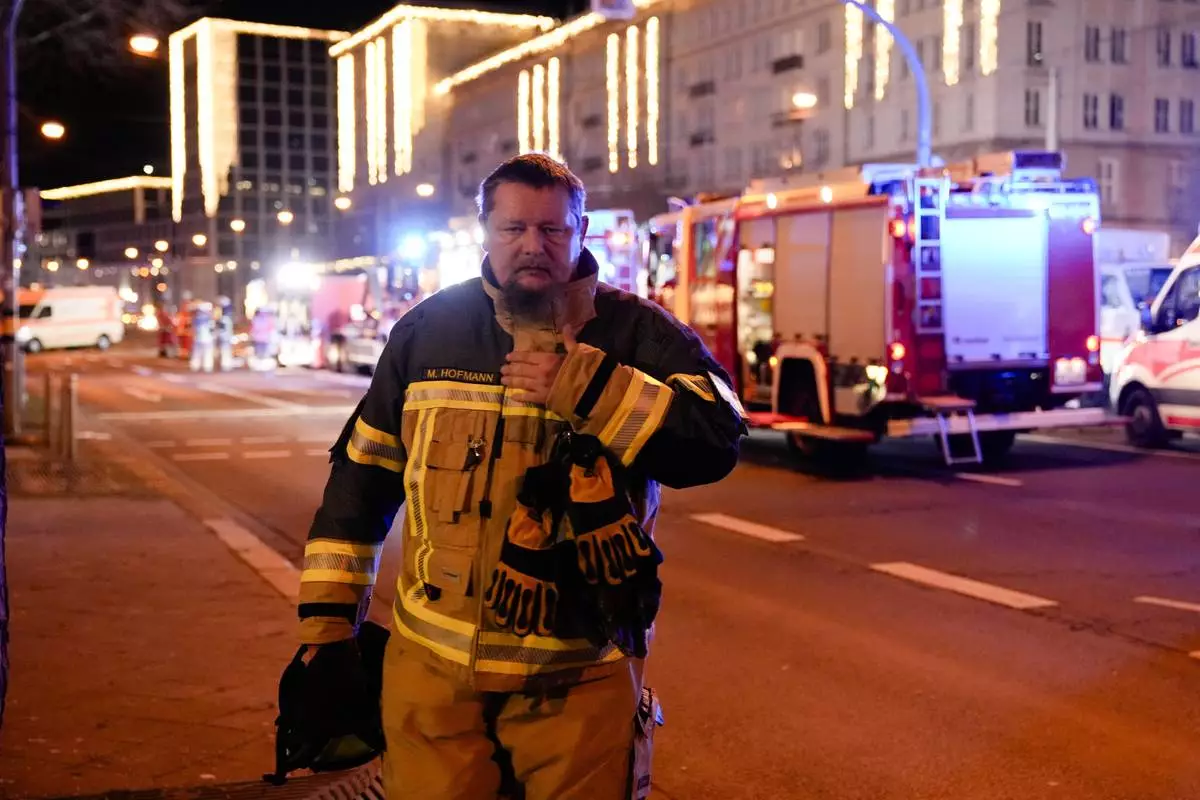
A firefighter walks through a cordoned-off area near a Christmas Market, after a car drove into a crowd in Magdeburg, Germany, Saturday, Dec. 21, 2024. (AP Photo/Ebrahim Noroozi)
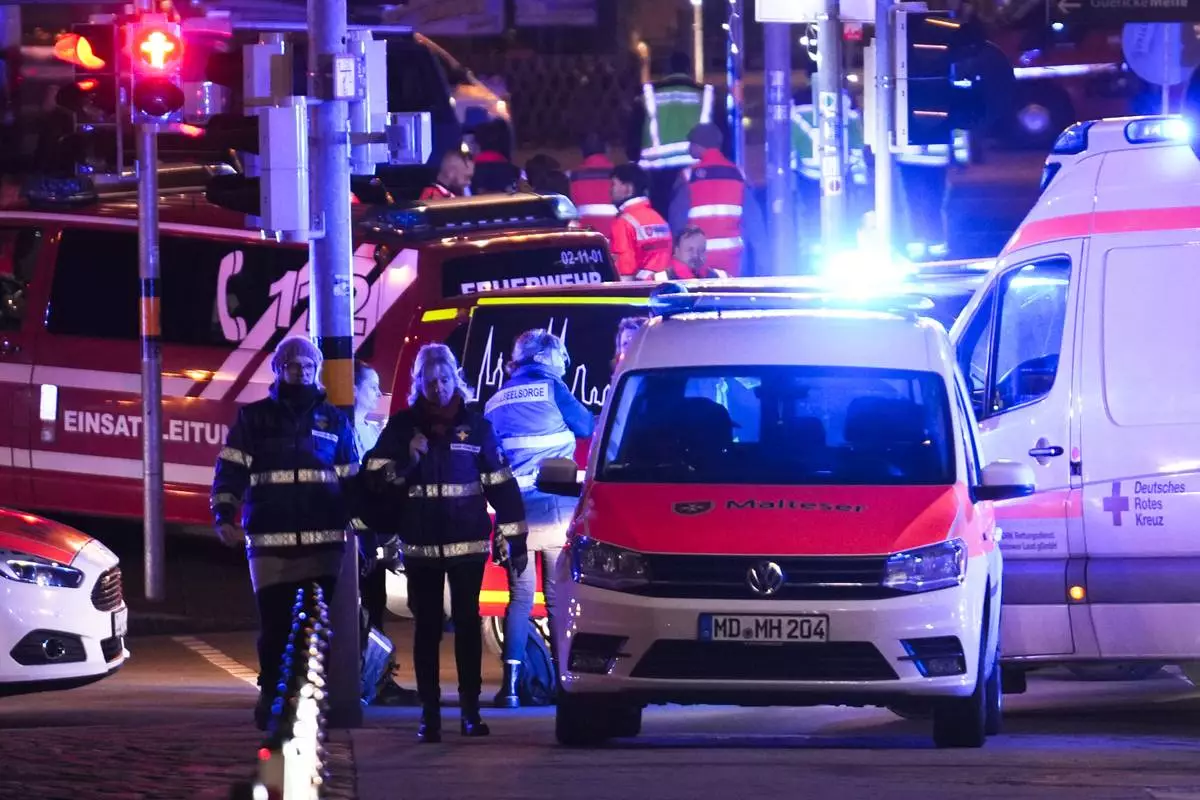
Emergency services work in a cordoned-off area near a Christmas Market, after an incident in Magdeburg, Germany, Friday, Dec. 20, 2024. (AP Photo/Ebrahim Noroozi)
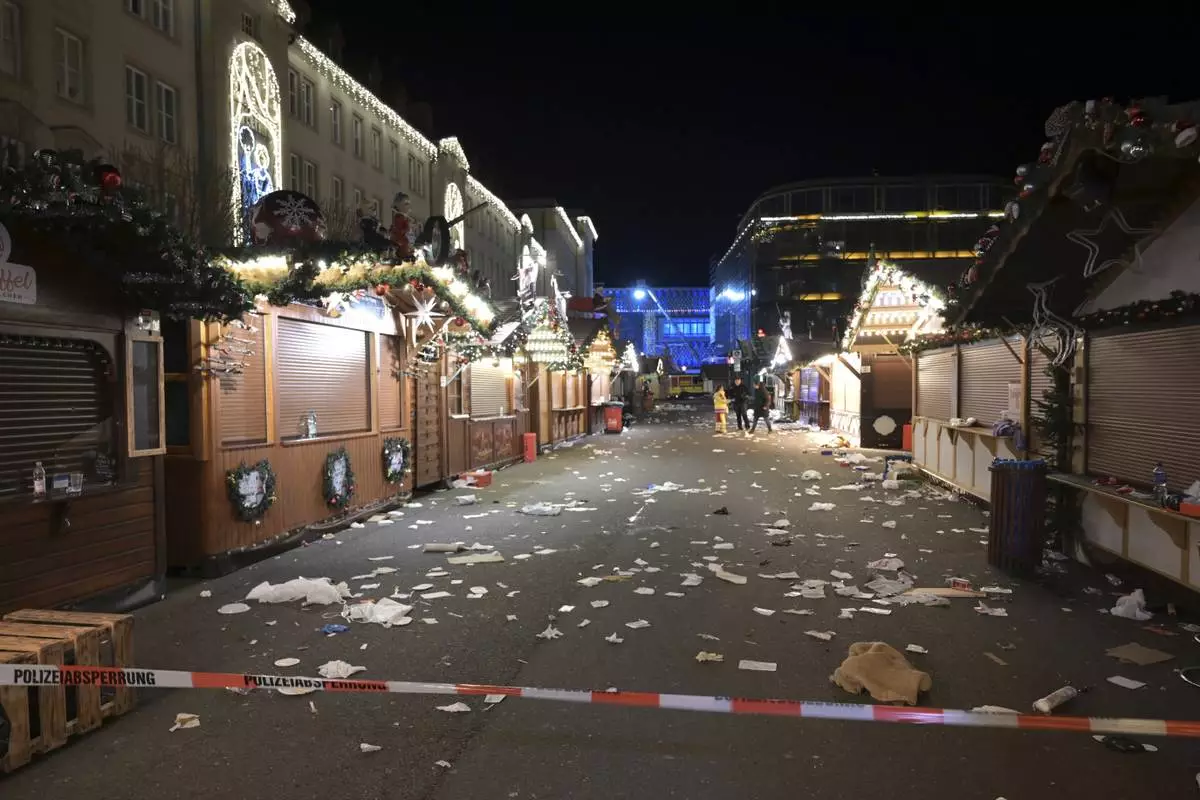
A view of the cordoned-off Christmas market after an incident in Magdeburg, Germany, Friday Dec. 20, 2024. (Heiko Rebsch/dpa via AP)

A police officer guards at a blocked road near a Christmas market after an incident in Magdeburg, Germany, Friday, Dec. 20, 2024. (AP Photo/Ebrahim Noroozi)
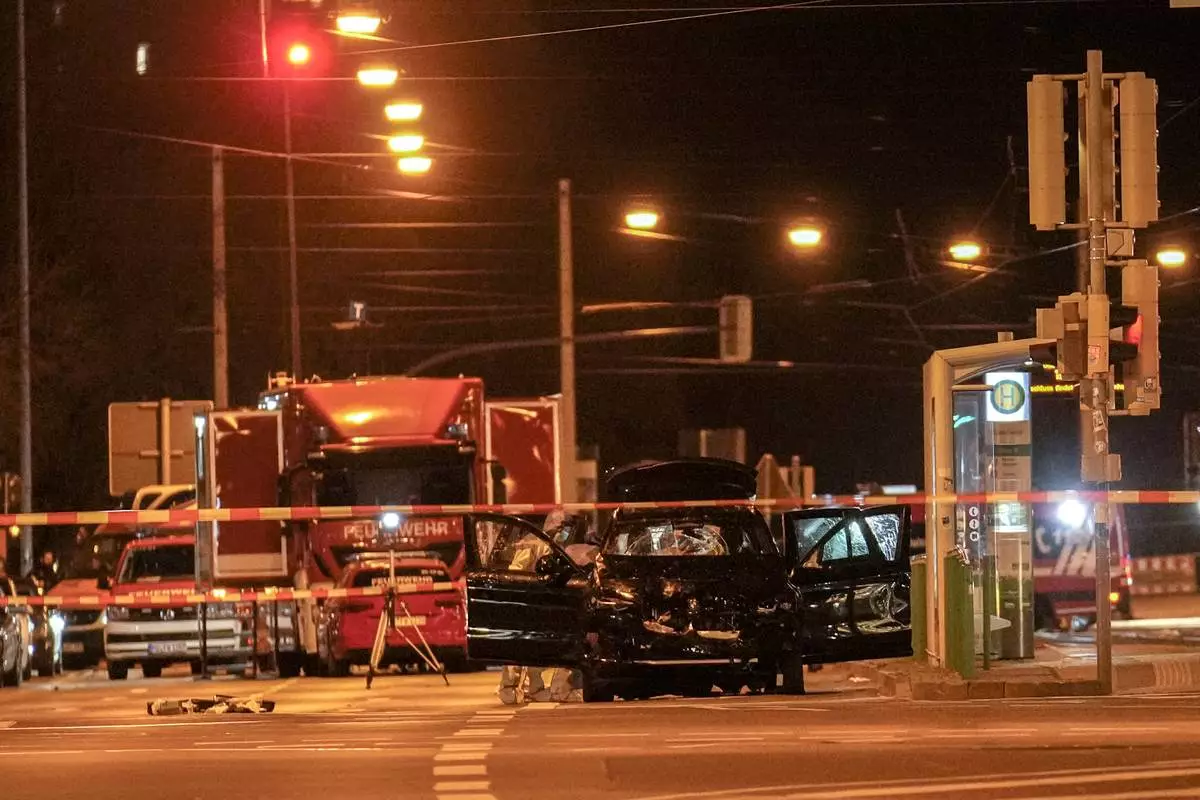
The car that was crashed into a crowd of people at the Magdeburg Christmas market is seen following the attack in Magdeburg, Germany, Saturday early morning, Dec. 21, 2024. (AP Photo/Ebrahim Noroozi)
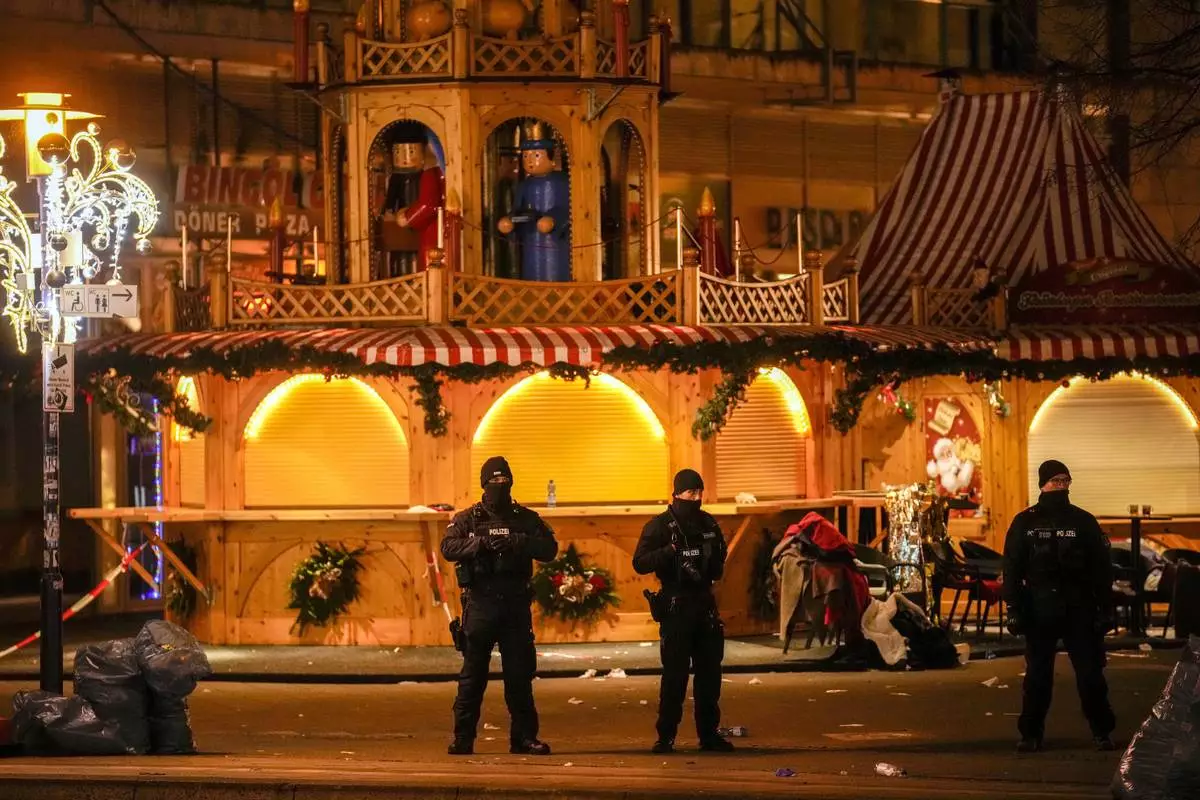
Security guards stand in front of a cordoned-off Christmas Market after a car crashed into a crowd of people, in Magdeburg, Germany, Saturday early morning, Dec. 21, 2024. (AP Photo/Ebrahim Noroozi)
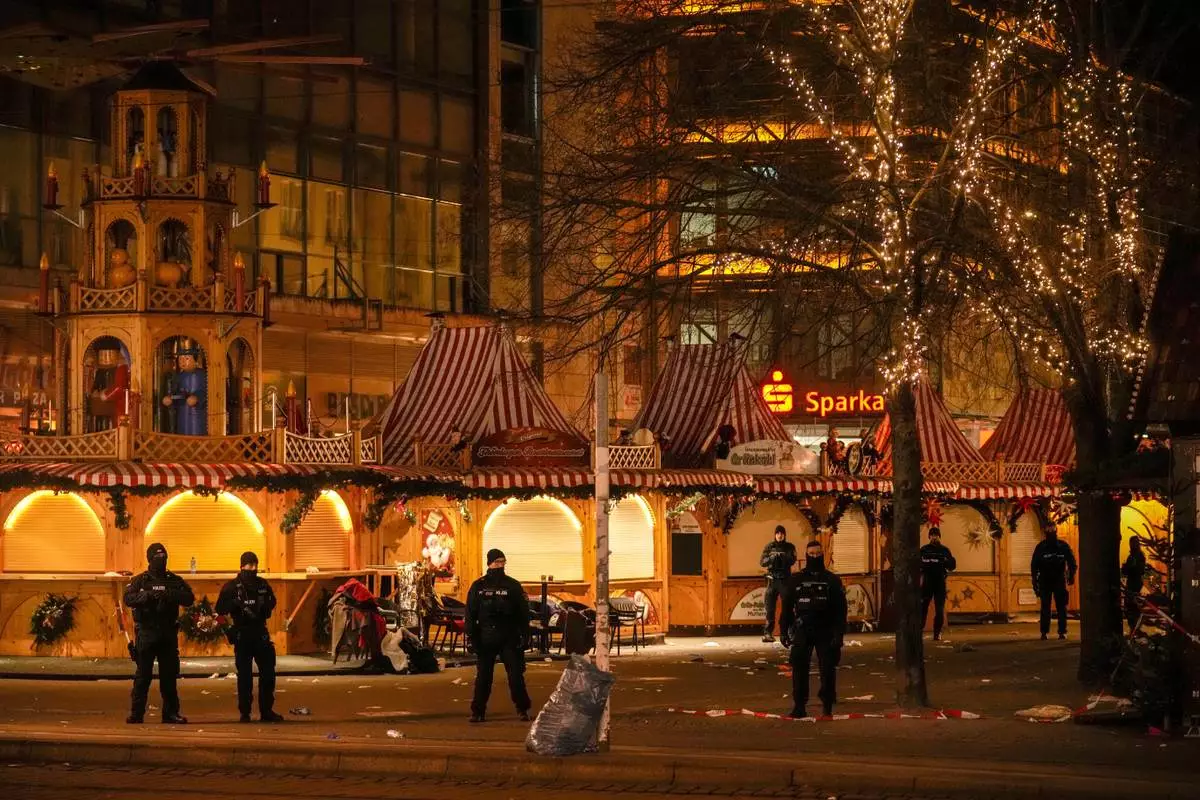
Security guards stand in front of a cordoned-off Christmas Market after a car crashed into a crowd of people, in Magdeburg, Germany, Saturday early morning, Dec. 21, 2024. (AP Photo/Ebrahim Noroozi)
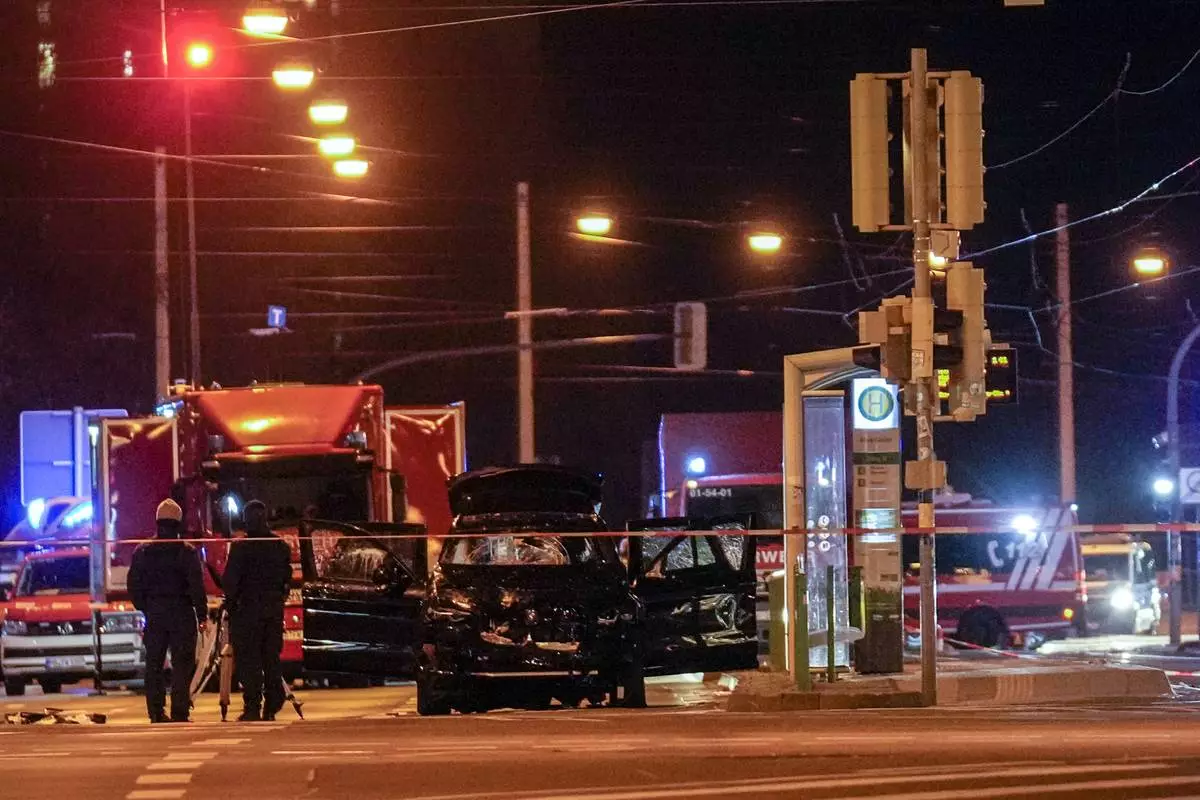
The car that was crashed into a crowd of people at the Magdeburg Christmas market is seen following the attack in Magdeburg, Germany, Saturday early morning, Dec. 21, 2024. (AP Photo/Ebrahim Noroozi)
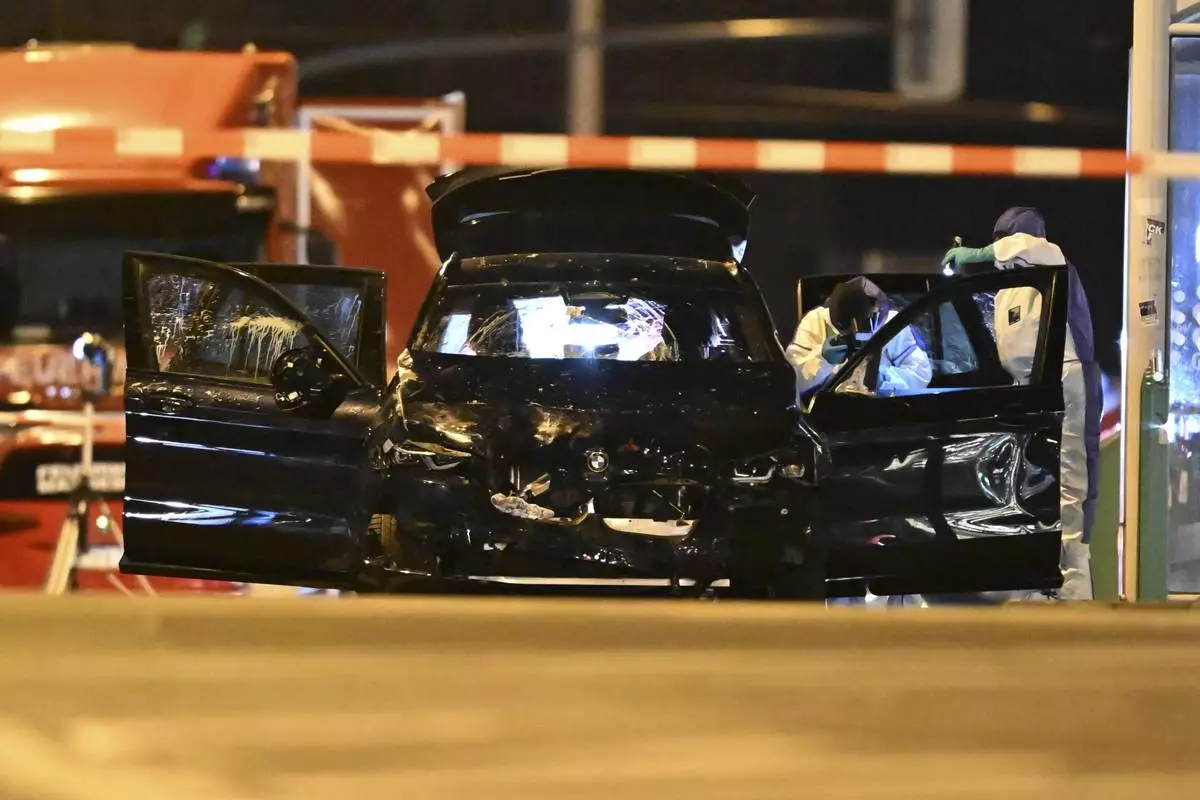
Forensics work on a damaged car sitting with its doors open after a driver plowed into a busy Christmas market in Magdeburg, Germany, early Saturday, Dec. 21, 2024. (Hendrik Schmidt/dpa via AP)













































